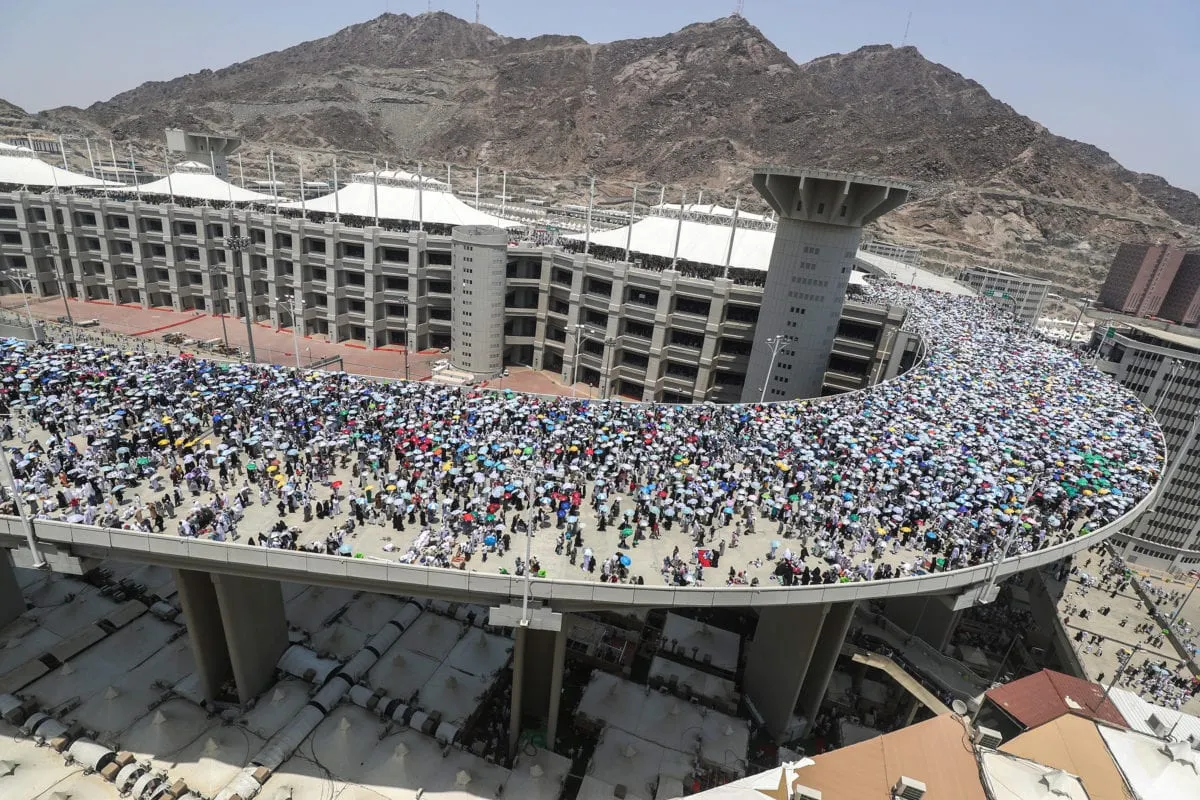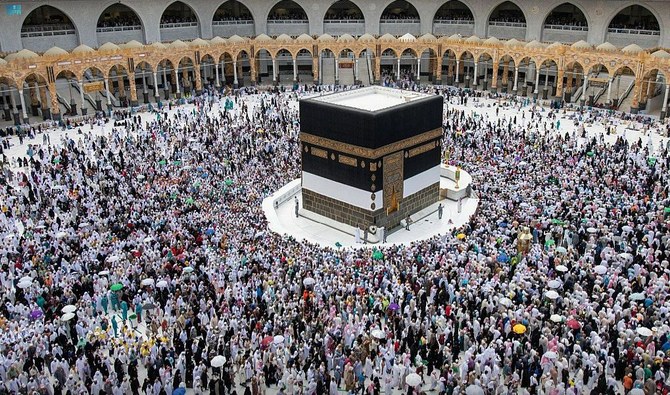بسم الله الرحمن الرحيم
Assalamu Alaikum.
(Here are Parts 1, 2, 3, 4, 5, 6, 7 ,8 and 9.)
Hajj will soon be upon as, so it’s befitting that in this part, we finish discussing the days of Hajj.
Is this the last part of the series? No, there’s one more part which will discuss Madinah, Masjid An-Nabawi, and Masjid Al-Aqsa, and will offer some advice to those who have returned from Hajj.
This part talks about the last three days of Hajj and also discusses some important matters pertaining to Hajj.
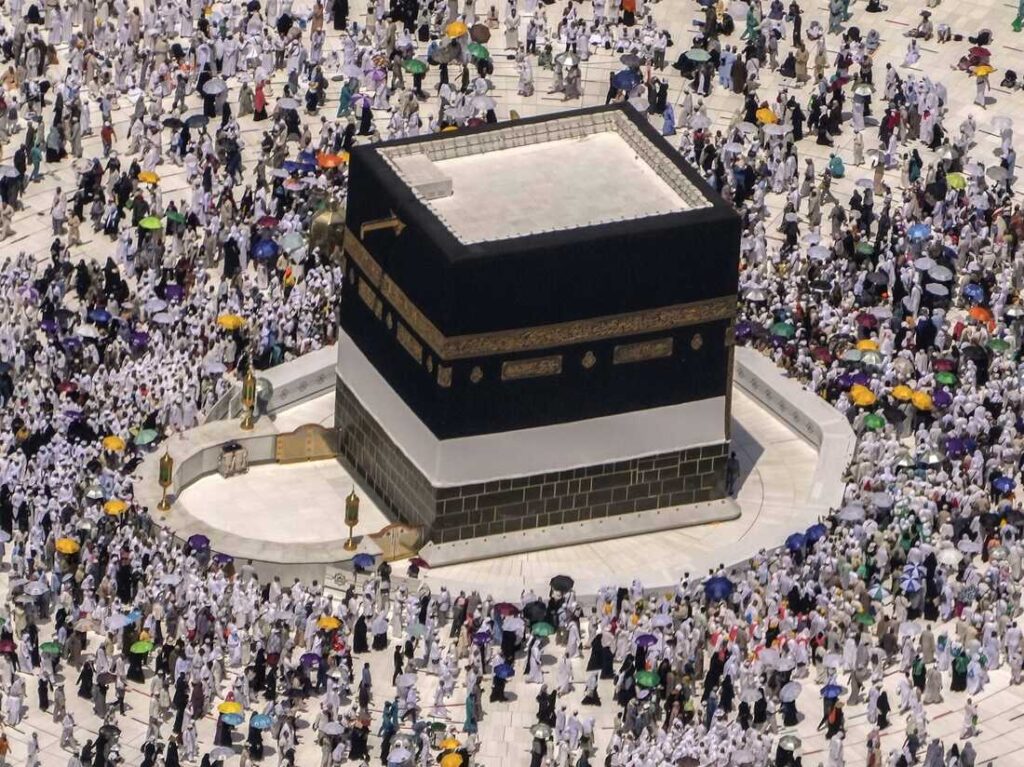
VIRTUES OF THE 10TH OF DHUL HIJJAH
The 10th of Dhul Hijjah is called Yawm An-Nahr meaning the Day of Sacrifice. It is part of the first ten days of Dhul Hijjah and hence shares in their virtues. You can read about the virtues of these days in the previous part.
The 10th of Dhul Hijjah also has virtues specific to it. One of its virtues is that it is the greatest day in the sight of Allah.
عَنْ عَبْدِ اللَّهِ بْنِ قُرْطٍ، عَنِ النَّبِيِّ صلى الله عليه وسلم قَالَ : إِنَّ أَعْظَمَ الأَيَّامِ عِنْدَ اللَّهِ تَبَارَكَ وَتَعَالَى يَوْمُ النَّحْرِ ثُمَّ يَوْمُ الْقَرِّ . قَالَ عِيسَى قَالَ ثَوْرٌ وَهُوَ الْيَوْمُ الثَّانِي . قَالَ وَقُرِّبَ لِرَسُولِ اللَّهِ صلى الله عليه وسلم بَدَنَاتٌ خَمْسٌ أَوْ سِتٌّ فَطَفِقْنَ يَزْدَلِفْنَ إِلَيْهِ بِأَيَّتِهِنَّ يَبْدَأُ فَلَمَّا وَجَبَتْ جُنُوبُهَا – قَالَ فَتَكَلَّمَ بِكَلِمَةٍ خَفِيَّةٍ لَمْ أَفْهَمْهَا فَقُلْتُ مَا قَالَ – قَالَ : مَنْ شَاءَ اقْتَطَعَ
Narrated Abdullah ibn Qurt (radiallahu anu): The Prophet (sallallahu alaihi wasallam) said: “The greatest day in Allah’s sight is the day of sacrifice and next the day of resting”, which Isa said on the authority of Thawr is the second day. Five or six sacrificial camels were brought to the Messenger of Allah (sallallahu alaihi wasallam) and they began to draw near to see which he would sacrifice first. When they fell down dead, he said something in a low voice, which I could not catch. So I asked: What did he say? He was told that he had said: Anyone who wants can cut off a piece. [Sunan Abee Dawood, Hadeeth No. 1765. Graded “sahih” (authentic) by Al-Albani.]
Yawm An-Nahr (the Day of Sacrifice) is the 10th of Dhul Hijjah i.e. Eid Al-Adha, and Yawn Al-Qarr (the Day of Resting) is the 11th of Dhul Hijjah.
Allah swore by this day in the Quran:
وَالشَّفْعِ وَالْوَتْرِ
And by the even and the odd (of all the creations of Allah). [Surah Al-Fajr (89) : 3]
Imam Ibn Kathir states in his explanation of this verse*:
“It has been mentioned in a hadeeth that Al-Witr (the odd) is the Day of Arafah because it falls on the ninth, and Ash-Shafi (the even) is the Day of An-Nahr (sacrifice) because it falls on the tenth day. This was also said by Ibn Abbas, Ikrimah and Ad-Dahhak.”
[*I got this from my book (the hardcopy) as it seeming to be missing from the online version. In the footnote, it says that the hadeeth referred to is inauthentic. Allah knows better.]
It is called Yawm Al-Hajj Al-Akbar (the day of the greater pilgrimage) referred to in the following ayah (verse):
وَأَذَانٌ مِّنَ اللَّهِ وَرَسُولِهِ إِلَى النَّاسِ يَوْمَ الْحَجِّ الْأَكْبَرِ أَنَّ اللَّهَ بَرِيءٌ مِّنَ الْمُشْرِكِينَ ۙ وَرَسُولُهُ ۚ فَإِن تُبْتُمْ فَهُوَ خَيْرٌ لَّكُمْ ۖ وَإِن تَوَلَّيْتُمْ فَاعْلَمُوا أَنَّكُمْ غَيْرُ مُعْجِزِي اللَّهِ ۗ وَبَشِّرِ الَّذِينَ كَفَرُوا بِعَذَابٍ أَلِيمٍ
And [it is] an announcement from Allah and His Messenger to the people on the day of the greater pilgrimage that Allah is disassociated from the disbelievers, and [so is] His Messenger. So if you repent, that is best for you; but if you turn away – then know that you will not cause failure to Allah. And give tidings to those who disbelieve of a painful punishment. [Surah At-Taubah (9) : 3]
عَنِ ابْنِ عُمَرَ، أَنَّ رَسُولَ اللَّهِ صلى الله عليه وسلم وَقَفَ يَوْمَ النَّحْرِ بَيْنَ الْجَمَرَاتِ فِي الْحَجَّةِ الَّتِي حَجَّ فَقَالَ : أَىُّ يَوْمٍ هَذَا . قَالُوا يَوْمُ النَّحْرِ . قَالَ : هَذَا يَوْمُ الْحَجِّ الأَكْبَرِ
Narrated Abdullah ibn Umar (radiallahu anhuma): The Messenger of Allah (sallallahu alaihi wasallam) halted on the day of sacrifice between the jamrahs (pillars at Mina) during Hajj which he performed. He asked: Which is this day? They replied: This is the day of sacrifice. He said: This is the day of the greater hajj. [Sunan Abee Dawood, Hadeeth No. 1945. Graded “sahih” (authentic) by Al-Albani.]
عَنْ حُمَيْدِ بْنِ عَبْدِ الرَّحْمَنِ بْنِ عَوْفٍ، عَنْ أَبِي هُرَيْرَةَ، قَالَ بَعَثَنِي أَبُو بَكْرٍ الصِّدِّيقُ فِي الْحَجَّةِ الَّتِي أَمَّرَهُ عَلَيْهَا رَسُولُ اللَّهِ صلى الله عليه وسلم قَبْلَ حَجَّةِ الْوَدَاعِ فِي رَهْطٍ يُؤَذِّنُونَ فِي النَّاسِ يَوْمَ النَّحْرِ لاَ يَحُجُّ بَعْدَ الْعَامِ مُشْرِكٌ وَلاَ يَطُوفُ بِالْبَيْتِ عُرْيَانٌ . قَالَ ابْنُ شِهَابٍ فَكَانَ حُمَيْدُ بْنُ عَبْدِ الرَّحْمَنِ يَقُولُ يَوْمُ النَّحْرِ يَوْمُ الْحَجِّ الأَكْبَرِ . مِنْ أَجْلِ حَدِيثِ أَبِي هُرَيْرَةَ
Abu Hurairah (radiallahu anhu)) reported: Abu Bakr Siddiq (radiallahu anhu) sent me during Hajj before the Farewell Pilgrimage for which Allah’s Messenger (sallallahu alaihi wasallam) had appointed him an Amir (leader), among a group of people whom he had ordered to make announcement to the people on the Day of Nahr (10th of Dhul Hijjah): “After this year no polytheist may perform the Pilgrimage and no naked person may circumambulate the House.” Ibn Shihab stated that Humaid bin Abd al-Rahman said that according to this narration of Abu Huraira (radiallahu anhu) the day of Hajj al-Akbar (Great Hajj) is this Day of Nahr (10th of Dhul-Hijjah). [Sahih Muslim, Hadeeth No. 3125]
عَن أَبي هُرَيْرَة ـ رضى الله عنه ـ قَالَ بَعَثَنِي أَبُو بَكْرٍ فِي تِلْكَ الْحَجَّةِ فِي مُؤَذِّنِينَ، بَعَثَهُمْ يَوْمَ النَّحْرِ يُؤَذِّنُونَ بِمِنًى أَنْ لاَ يَحُجَّ بَعْدَ الْعَامِ مُشْرِكٌ، وَلاَ يَطُوفَ بِالْبَيْتِ عُرْيَانٌ. قَالَ حُمَيْدُ بْنُ عَبْدِ الرَّحْمَنِ ثُمَّ أَرْدَفَ رَسُولُ اللَّهِ صلى الله عليه وسلم بِعَلِيِّ بْنِ أَبِي طَالِبٍ، وَأَمَرَهُ أَنْ يُؤَذِّنَ بِبَرَاءَةَ. قَالَ أَبُو هُرَيْرَةَ فَأَذَّنَ مَعَنَا عَلِيٌّ يَوْمَ النَّحْرِ فِي أَهْلِ مِنًى بِبَرَاءَةَ، وَأَنْ لاَ يَحُجَّ بَعْدَ الْعَامِ
Abu Hurairah (radiallahu anhu) narrated: “During that Hajj (in which Abu Bakr was the chief of the pilgrims) Abu Bakr sent me along with announcers on the Day of Nahr ( 10th of Dhul-Hijjah) in Mina to announce: “No pagans shall perform, Hajj after this year, and none shall perform the Tawaf around the Kabah in a naked state.” Humaid bin Abdur Rahman said: Then Allah’s Messenger (sallallahu alaihi wasallam) sent Ali bin Abi Taalib (after Abu Bakr) and ordered him to recite aloud in public Surat Baraa (Surah At-Taubah). Abu Hurairah said, “So Ali, along with us, recited Baraa (loudly) before the people at Mina on the Day of Nahr and announced; “No pagan shall perform Hajj after this year and none shall perform the Tawaf around the Kabah in a naked state.” [Sahih Al-Bukhari, Volume 6, Hadeeth No. 178]
There are many acts performed in its night and day. The night (meaning the night which precedes the day) involves going to Muzdalifah whereas the day involves stoning, sacrificing, shaving/trimming the hair, trimming, tawaf and saee.
It is also a day of Eid: the day of Eid Al-Adha.
عن عُقْبَة بْنَ عَامِرٍ، قَالَ قَالَ رَسُولُ اللَّهِ صلى الله عليه وسلم :يَوْمُ عَرَفَةَ وَيَوْمُ النَّحْرِ وَأَيَّامُ التَّشْرِيقِ عِيدُنَا أَهْلَ الإِسْلاَمِ وَهِيَ أَيَّامُ أَكْلٍ وَشُرْبٍ
Narrated Uqbah ibn Amir (radiallahu anhu): The Prophet (sallallahu alaihi wasallam) said: The Day of Arafah, the Day of Sacrifice, the Days of Tashreeq are (the days of) our Eid, the people of Islam and they are the days of eating and drinking. [Sunan Abee Dawood, Hadeeth No. 2419. Graded “sahih” (authentic) by Al-Albani.]
Fasting is prohibited on this day.
عَنْ عَائِشَةَ، – رضى الله عنها – قَالَتْ نَهَى رَسُولُ اللَّهِ صلى الله عليه وسلم عَنْ صَوْمَيْنِ يَوْمِ الْفِطْرِ وَيَوْمِ الأَضْحَى
Aishah (radiallahu anha) said that the Prophet (sallallahu alaihi wasallam) forbade to observe fast on two days-the day of Fitr and the day of Adha. [Sahih Muslim, Hadeeth No. 2538]
Eid Al-Adha and Eid Al-Fitr are the only two days that Muslims can celebrate on a yearly basis.
عَنْ أَنَسٍ، قَالَ قَدِمَ رَسُولُ اللَّهِ صلى الله عليه وسلم الْمَدِينَةَ وَلَهُمْ يَوْمَانِ يَلْعَبُونَ فِيهِمَا فَقَالَ : مَا هَذَانِ الْيَوْمَانِ . قَالُوا كُنَّا نَلْعَبُ فِيهِمَا فِي الْجَاهِلِيَّةِ . فَقَالَ رَسُولُ اللَّهِ صلى الله عليه وسلم : إِنَّ اللَّهَ قَدْ أَبْدَلَكُمْ بِهِمَا خَيْرًا مِنْهُمَا يَوْمَ الأَضْحَى وَيَوْمَ الْفِطْرِ .
Narrated Anas ibn Malik (radiallahu anhu): When the Messenger of Allah (sallallahu alaihi wasallam) came to Madinah, the people had two days on which they engaged in games. He asked: What are these two days (what is the significance)? They said: We used to engage ourselves on them in the pre-Islamic period. The Messenger of Allah (sallallahu alaihi wasallam) said: Allah has substituted for them something better than them, the Day of Al-Adha and the Day of Al-Fitr . [Sunan Abee Dawood, Hadeeth No. 1134. Graded “sahih” (authentic) by Al-Albani.]
This hadeeth is enough proof that it is prohibited to celebrate anything yearly apart from the two Eids. The people of Madinah were not celebrating a religious festival yet the Prophet (sallallahu alaihi wasallam) still forbade them.
So, how can people still persist in celebrating and magnifying National Days, Flag Days, birthdays, Thanksgiving, Onum, Hanukkah, Christmas, Easter, Diwali, Nowruz, Valentine’s day, Mother’s Day, Father’s Days, etc.? On top of that, most of that these have pagan roots.
Remember:
عَنِ ابْنِ عُمَرَ، قَالَ قَالَ رَسُولُ اللَّهِ صلى الله عليه وسلم : مَنْ تَشَبَّهَ بِقَوْمٍ فَهُوَ مِنْهُمْ
Narrated Abdullah ibn Umar (radiallahu anhuma): The Messenger of Allah (sallallahu alaihi wasallam) said: “Whoever imitates a people, he is one of them”. [Sunan Abee Dawood, Hadeeth No. 4031. Graded “hasan sahih” (authentic) by Al-Albani.]
Things have gotten so bad that people now celebrate these days (especially their national days) MORE than they celebrate the two Eids. Apart from the above mentioned days, so many more days have been designated as “special” days e.g. Earth Day, etc., that the two Eids have decreased in stature in the eyes of many people.
If all the Muslims celebrated only the two Eids on a yearly basis and nothing else, then these two days would have an increased stature in the eyes of all the Muslims and even the non-Muslims. So instead of Christmas being famous, the two Eids would become famous and perhaps more non Muslims might be attracted to Islam.
Also, children would not insist on celebrating birthdays, because they would already have TWO days in the year where they had lots of fun.
We need to return back to the Sunnah of the Prophet (sallallahu alaihi wasallam) and stop magnifying or celebrating anything on a yearly basis, other than the two Eids.
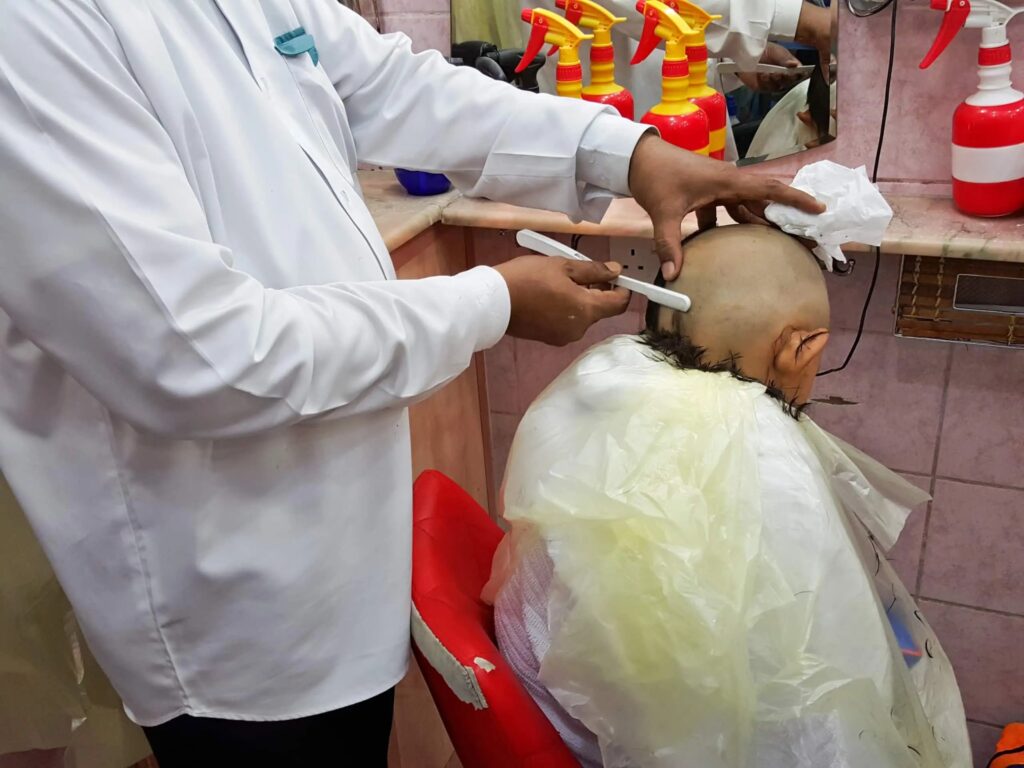
HEADING TO MINA
It states in the Hadeeth of Jaabir (radiallahu anhu):
ثُمَّ اضْطَجَعَ رَسُولُ اللّهِ حَتَّى طَلَعَ الْفَجْرُ. وَصَلَّى الْفَجْرَ، حِينَ تَبَيَّنَ لَهُ الصُّبْحُ، بِأَذَانٍ وَإِقَامَةٍ. ثُمَّ رَكِبَ الْقَصْوَاءَ. حَتَّى أَتَى الْمَشْعَرَ الْحَرَامَ. فَاسْتَقْبَلَ الْقِبْلَةَ. فَدَعَاهُ وَكَبَّرَهُ وَهَلَّلَهُ وَوَحَّدَهُ. فَلَمْ يَزَلْ وَاقِفَاً حَتَّى أَسْفَرَ جِدّاً. فَدَفَعَ قَبْلَ أَنْ تَطْلُعَ الشَّمْسُ. وَأَرْدَفَ الْفَضْلَ بْنَ عَبَّاسٍ. وَكَانَ رَجُلاً حَسَنَ الشَّعْرِ أَبْيَضَ وَسِيماً. فَلَمَّا دَفَعَ رَسُولُ اللّهِ مَرَّتْ بِهِ ظُعُنٌ يَجْرِينَ. فَطَفِقَ الْفَضْلُ يَنْظُرُ إِلَيْهِنَّ. فَوَضَعَ رَسُولُ اللّهِ يَدَهُ عَلَى وَجْهِالْفَضْلِ. فَحَوَّلَ الْفَضْلُ وَجْهَهُ إِلَى الشِّقِّ الآخَرِ يَنْظُرُ. فَحَوَّلَ رَسُولُ اللّهِ يَدَهُ مِنَ الشِّقِّ الآخَرِ عَلَى وَجْهِ الْفَضْلِ. يَصْرِفُ وَجْهَهُ مِنَ الشِّقِّ الآخَرِ يَنْظُرُ. حَتَّى أَتَى بَطْنَ مُحَسِّرٍ. فَحَرَّكَ قَلِيلاً. ثُمَّ سَلَكَ الطَّرِيقَ الْوُسْطَى الَّتِي تَخْرُجُ عَلَى الْجَمْرَةِ الْكُبْرَى. حَتَّى أَتَى الْجَمْرَةَ الَّتِي عِنْدَ الشَّجَرَةِ. فَرَمَاهَا بِسَبْعِ حَصَيَاتٍ. يُكَبِّرُ مَعَ كُلِّ حَصَاةٍ مِنْهَا. مِثْلِ حَصَى الْخَذْفِ. رَمَى مِنْ بَطْنِ الْوَادِي. ثُمَّ انْصَرَفَ إِلَى الْمَنْحَرِ. فَنَحَرَ ثَلاَثَاً وَسِتِّينَ بِيَدِهِ. ثُمَّ أَعْطَى عَلِيّاً. فَنَحَرَ مَا غَبَرَ. وَأَشْرَكَهُ فِي هَدْيِهِ. ثُمَّ أَمَرَ مِنْ كُلِّ بَدَنَةٍ بِبَضْعَةٍ. فَجُعِلَتْ فِي قِدْرٍ. فَطُبِخَتْ. فَأَكَلاَ مِنْ لَحْمِهَا وَشَرِبَا مِنْ مَرَقِهَا
The Messenger of Allah (sallahu alaihi wasallam) then lay down until dawn and offered the Fajr prayer with an Adhan and Iqama when the morning light was clear. He again mounted al-Qaswa, and when he came to al-Mashar al-Haram, he faced towards Qibla, supplicated to Him, Glorified Him, and pronounced His Uniqueness (Laa ilaaha illa Allah) and Oneness, and kept standing until the daylight was very clear.
He then went quickly before the sun rose, and seated behind him was al-Fadl ibn Abbas (radiallahu anhuma) and he was a man having beautiful hair and fair complexion and handsome face. As the Messenger of Allah (sallahu alaihi wasallam) was moving on, there was also going a group of women (side by side with them). Al-Fadl began to look at them. The Messenger of Allah (sallahu alaihi wasallam) placed his hand on the face of Fadl who then turned his face to the other side, and began to see, and the Messenger of Allah (sallahu alaihi wasallam) turned his hand to the other side and placed it on the face of al-Fadl. He again turned his face to the other side until he came to the bottom of Muhassir. He urged her (al-Qaswa) a little, and, following the middle road, which comes out at the greatest jamra, he came to the jamra which is near the tree. At this he threw seven small pebbles, saying Allahu Akbar while throwing every one of them in a manner in which the small pebbles are thrown (with the help of fingers) and this he did in the bottom of the valley.
He then went to the place of sacrifice, and sacrificed sixty-three (camels) with his own hand. Then he gave the remaining number to Ali (radiallahu anhu) who sacrificed them, and he shared him in his sacrifice. He then commanded that a piece of flesh from each animal sacrificed should be put in a pot, and when it was cooked, both of them (the Prophet and Ali) took some meat out of it and drank its soup. [Sahih Muslim, Hadeeth No. 2803]
There are three things done in Mina on this day: stoning, sacrificing the animal and shaving.
عَنْ أَنَسِ، بْنِ مَالِكٍ أَنَّ رَسُولَ اللَّهِ صلى الله عليه وسلم رَمَى جَمْرَةَ الْعَقَبَةِ ثُمَّ انْصَرَفَ إِلَى الْبُدْنِ فَنَحَرَهَا وَالْحَجَّامُ جَالِسٌ وَقَالَ بِيَدِهِ عَنْ رَأْسِهِ فَحَلَقَ شِقَّهُ الأَيْمَنَ فَقَسَمَهُ فِيمَنْ يَلِيهِ ثُمَّ قَالَ : احْلِقِ الشِّقَّ الآخَرَ . فَقَالَ : أَيْنَ أَبُو طَلْحَةَ . فَأَعْطَاهُ إِيَّاهُ
Anas bin Malik (radiallahu anha) reported that Allah’s Messenger (sallallahu alaihi wasallam) threw stones at Jamrat al-Aqabah. He then want to his sacrificial animal and sacrificed it, and there was sitting the barber, and he pointed with his hand towards his head, and he shaved the right half of it, and he (the Prophet) distributed them (the hair) among those who were near him. And he again said: Shave the other half, and said: Where is Abu Talha and gave it (the hair) to him. [Sahih Muslim, Hadeeth No. 2993]
[The Prophet (sallallahu alaihi wasallam) distributed his hair as his body was blessed and his Companions (radiallahu anhum) used to seek blessings from his hair, sweat, etc. This was only allowed for the Prophet (sallallahu alaihi wasallam) and not for anyone after him, as proven by the fact the Companions never sought blessings from Abu Bakr (radiallahu anhu) or Umar (radiallahu anhu) although they were the best of this nation after the Prophet (sallallahu alaihi wasallam). For more details, please refer to this article and this one.]
Here’s what one needs to do after staying overnight in Muzdalifah:
1. Set out for Mina before sunrise
One is meant to pray Fajr in Muzdalifah and then set out.
عَنْ عَبْدِ اللَّهِ ـ رضى الله عنه ـ قَالَ مَا رَأَيْتُ النَّبِيَّ صلى الله عليه وسلم صَلَّى صَلاَةً بِغَيْرِ مِيقَاتِهَا إِلاَّ صَلاَتَيْنِ جَمَعَ بَيْنَ الْمَغْرِبِ وَالْعِشَاءِ، وَصَلَّى الْفَجْرَ قَبْلَ مِيقَاتِهَا
Narrated Abdullah (radiallahu anhu): I never saw the Prophet (sallallahu alaihi wasallam) offering any prayer not at its stated time except two; he prayed the Maghrib and the Isha together and he offered the morning prayer before its usual time. [Sahih Al-Bukhari, Volume 2, Hadeeth No. 742]
It seems that the Prophet (sallallahu alaihi wasallam) might have kept the time between the adhan and iqaamah shorter than usual. Allah knows Better.
The pagans used to set for Mina AFTER the sun rose so the Prophet (sallallahu alaihi wasallam) differed from them by setting out before the sun had risen.
عَنْ عَمْرِو بْنِ مَيْمُونٍ، قَالَ قَالَ عُمَرُ ـ رضى الله عنه ـ إِنَّ الْمُشْرِكِينَ كَانُوا لاَ يُفِيضُونَ مِنْ جَمْعٍ حَتَّى تَشْرُقَ الشَّمْسُ عَلَى ثَبِيرٍ، فَخَالَفَهُمُ النَّبِيُّ صلى الله عليه وسلم فَأَفَاضَ قَبْلَ أَنْ تَطْلُعَ الشَّمْسُ
Narrated Amr bin Maimoon: Umar (radiallahu anhu) said: The pagans used not to leave Jam’ (i.e. Muzdalifa) till the sun had risen on Thabir mountain. The Prophet (sallallahu alaihi wasallan) contradicted them by leaving (Muzdalifa) before the sun rose. [Sahih Al-Bukhari, Volume 5, Hadeeth No. 179]
عَنْ عَمْرِو بْنِ مَيْمُونٍ، قَالَ حَجَجْنَا مَعَ عُمَرَ بْنِ الْخَطَّابِ فَلَمَّا أَرَدْنَا أَنْ نُفِيضَ، مِنَ الْمُزْدَلِفَةِ قَالَ إِنَّ الْمُشْرِكِينَ كَانُوا يَقُولُونَ أَشْرِقْ ثَبِيرُ كَيْمَا نُغِيرُ . وَكَانُوا لاَ يُفِيضُونَ حَتَّى تَطْلُعَ الشَّمْسُ فَخَالَفَهُمْ رَسُولُ اللَّهِ ـ صلى الله عليه وسلم ـ فَأَفَاضَ قَبْلَ طُلُوعِ الشَّمْسِ
What about the Eid prayer, one may ask? Well, they don’t have to offer it. According to Saudi’s Permanent Committee, if someone does offer it, they will be rewarded.
One must try to hurry through the valley of Muhassir (pictured in Part 9).
عَنْ جَابِرٍ، قَالَ أَفَاضَ رَسُولُ اللَّهِ صلى الله عليه وسلم وَعَلَيْهِ السَّكِينَةُ وَأَمَرَهُمْ أَنْ يَرْمُوا بِمِثْلِ حَصَى الْخَذْفِ وَأَوْضَعَ فِي وَادِي مُحَسِّرٍ
Narrated Jabir ibn Abdullah (radiallahu anhu): The Messenger of Allah (sallallahu alaihi wasallam) hastened from al-Muzdalifah with a quiet demeanor and ordered them (the people) to throw small pebbles and he hastened in the valley of Muhassir. [Sunan Abee Dawood, Hadeeth No. 1944. Graded “sahih” (authentic) by Al-Albani.]
عَنْ جَعْفَر بْنُ مُحَمَّدٍ، عَنْ أَبِيهِ، قَالَ دَخَلْنَا عَلَى جَابِرِ بْنِ عَبْدِ اللَّهِ فَقُلْتُ أَخْبِرْنِي عَنْ حَجَّةِ النَّبِيِّ، صلى الله عليه وسلم . فَقَالَ إِنَّ رَسُولَ اللَّهِ صلى الله عليه وسلم دَفَعَ مِنَ الْمُزْدَلِفَةِ قَبْلَ أَنْ تَطْلُعَ الشَّمْسُ وَأَرْدَفَ الْفَضْلَ بْنَ الْعَبَّاسِ حَتَّى أَتَى مُحَسِّرًا حَرَّكَ قَلِيلاً ثُمَّ سَلَكَ الطَّرِيقَ الْوُسْطَى الَّتِي تُخْرِجُكَ عَلَى الْجَمْرَةِ الْكُبْرَى حَتَّى أَتَى الْجَمْرَةَ الَّتِي عِنْدَ الشَّجَرَةِ فَرَمَى بِسَبْعِ حَصَيَاتٍ يُكَبِّرُ مَعَ كُلِّ حَصَاةٍ مِنْهَا حَصَى الْخَذْفِ رَمَى مِنْ بَطْنِ الْوَادِي
As mentioned in Part 9, it seems that the army of Abraha was destroyed in Muhassir. When we come across places where Allah’s punishment was sent down, we need to rush through them.
عَنِ ابْنِ عُمَرَ ـ رضى الله عنهما ـ قَالَ لَمَّا مَرَّ النَّبِيُّ صلى الله عليه وسلم بِالْحِجْرِ قَالَ : لاَ تَدْخُلُوا مَسَاكِنَ الَّذِينَ ظَلَمُوا أَنْفُسَهُمْ، أَنْ يُصِيبَكُمْ مَا أَصَابَهُمْ إِلاَّ أَنْ تَكُونُوا بَاكِينَ . ثُمَّ قَنَّعَ رَأْسَهُ وَأَسْرَعَ السَّيْرَ حَتَّى أَجَازَ الْوَادِيَ
Narrated Ibn Umar (radiallahu anhuma): When the Prophet (sallallahu alaihi wasallam) passed by Al-Hijr, he said, “Do not enter the dwelling places of those people who were unjust to themselves unless you enter in a weeping state lest the same calamity as of theirs should befall you.” Then he covered his head and made his speed fast till he crossed the valley. [Sahih Al-Bukhari, Volume 5, Hadeeth No. 703]
عَنِ ابْنِ شِهَابٍ، – وَهُوَ يَذْكُرُ الْحِجْرَ مَسَاكِنَ ثَمُودَ – قَالَ سَالِمُ بْنُ عَبْدِ اللَّهِ إِنَّ عَبْدَ اللَّهِ بْنَ عُمَرَ قَالَ مَرَرْنَا مَعَ رَسُولِ اللَّهِ صلى الله عليه وسلم عَلَى الْحِجْرِ فَقَالَ لَنَا رَسُولُ اللَّهِ صلى الله عليه وسلم : لاَ تَدْخُلُوا مَسَاكِنَ الَّذِينَ ظَلَمُوا أَنْفُسَهُمْ إِلاَّ أَنْ تَكُونُوا بَاكِينَ حَذَرًا أَنْ يُصِيبَكُمْ مِثْلُ مَا أَصَابَهُمْ . ثُمَّ زَجَرَ فَأَسْرَعَ حَتَّى خَلَّفَهَا
Ibn Shihab reported, and he had been talking about the stony abodes of Thamud, and he said: Salim ibn. Abdullah reported that Abdullah ibn Umar (radiallahu anhuma) said: We were passing along with Allah’s Messenger (sallallahu alaihi wasallam) through the habitations of Hijr, and Allah’s Messenger (sallallahu alaihi wasallam) said: Do not enter but weeping the habitations of these persons who committed tyranny among themselves, lest the same calamity should fall upon you as it fell upon them. He then urged his mount to proceed quickly and pass through that valley hurriedly. [Sahih Muslim, Hadeeth No. 7104]
عَن سَالِم بْنُ عَبْدِ اللَّهِ، عَنْ أَبِيهِ ـ رضى الله عنهم أَنَّ النَّبِيَّ صلى الله عليه وسلم لَمَّا مَرَّ بِالْحِجْرِ قَالَ : لاَ تَدْخُلُوا مَسَاكِنَ الَّذِينَ ظَلَمُوا إِلاَّ أَنْ تَكُونُوا بَاكِينَ، أَنْ يُصِيبَكُمْ مَا أَصَابَهُمْ . ثُمَّ تَقَنَّعَ بِرِدَائِهِ، وَهْوَ عَلَى الرَّحْلِ
Narrated Salim ibn Abdullah from his father that when the Prophet (sallallahu alaihi wasallam) passed by (a place called) Al Hijr, he said, “Do not enter the house of those who were unjust to themselves, unless (you enter) weeping, lest you should suffer the same punishment as was inflicted upon them.” After that he covered his face with his sheet cloth while he was on the camel-saddle. [Sahih Al-Bukhari, Volume 4, Hadeeth No. 563]
عَنْ عَبْدِ اللَّهِ بْنِ عُمَرَ ـ رضى الله عنهما ـ أَنَّ رَسُولَ اللَّهِ صلى الله عليه وسلم قَالَ : لاَ تَدْخُلُوا عَلَى هَؤُلاَءِ الْمُعَذَّبِينَ إِلاَّ أَنْ تَكُونُوا بَاكِينَ، فَإِنْ لَمْ تَكُونُوا بَاكِينَ فَلاَ تَدْخُلُوا عَلَيْهِمْ، لاَ يُصِيبُكُمْ مَا أَصَابَهُمْ
Narrated Abdullah bin Umar (radiallahu anhuma): Allah’s Messenger (sallallahu alaihi wasallam) said, “Do not enter (the places) of these people where Allah’s punishment had fallen unless you do so weeping. If you do not weep, do not enter (the places of these people) because Allah’s curse and punishment which fell upon them may fall upon you.” [Sahih Al-Bukhari, Volume 1, Hadeeth No. 425]
عَنِ ابْنِ عُمَرَ ـ رضى الله عنهما أَنَّ رَسُولَ اللَّهِ صلى الله عليه وسلم لَمَّا نَزَلَ الْحِجْرَ فِي غَزْوَةِ تَبُوكَ أَمَرَهُمْ أَنْ لاَ يَشْرَبُوا مِنْ بِئْرِهَا، وَلاَ يَسْتَقُوا مِنْهَا فَقَالُوا قَدْ عَجَنَّا مِنْهَا، وَاسْتَقَيْنَا. فَأَمَرَهُمْ أَنْ يَطْرَحُوا ذَلِكَ الْعَجِينَ وَيُهَرِيقُوا ذَلِكَ الْمَاءَ
Narrated Ibn Umar (radiallahu anhuma): When Allah’s Messenger (sallallahu alaihi wasallam) landed at Al-Hijr during the Ghazwa (Battle) of Tabuk, he ordered his companions not to drink water from its well or reserve water from it. They said, “We have already kneaded the dough with its water. and also filled our bags with its water.” On that, the Prophet (sallallahu alaihi wasallam) ordered them to throw away the dough and pour out the water. [Sahih Al-Bukhari, Volume 4, Hadeeth No. 561]
عَنْ نَافِعٍ، أَنَّ عَبْدَ اللَّهِ بْنَ عُمَرَ ـ رضى الله عنهما ـ أَخْبَرَهُ أَنَّ النَّاسَ نَزَلُوا مَعَ رَسُولِ اللَّهِ صلى الله عليه وسلم أَرْضَ ثَمُودَ الْحِجْرَ، فَاسْتَقَوْا مِنْ بِئْرِهَا، وَاعْتَجَنُوا بِهِ، فَأَمَرَهُمْ رَسُولُ اللَّهِ صلى الله عليه وسلم أَنْ يُهَرِيقُوا مَا اسْتَقَوْا مِنْ بِئْرِهَا، وَأَنْ يَعْلِفُوا الإِبِلَ الْعَجِينَ، وَأَمَرَهُمْ أَنْ يَسْتَقُوا مِنَ الْبِئْرِ الَّتِي كَانَ تَرِدُهَا النَّاقَةُ
Nafi narrated that Abdullah bin Umar (radiallahu anhuma) informed him that the people landed at the land of Thamud called Al-Hijr along with Allah’s Messenger (sallallahu alaihi wasallam) and they took water from its well for drinking and kneading the dough with it as well. (When Allah’s Messenger (sallallahu alaihi wasallam) heard about it) he ordered them to pour out the water they had taken from its wells and feed the camels with the dough, and ordered them to take water from the well whence the she-camel (of Prophet Salih (alaihissalaam)) used to drink. [Sahih Al-Bukhari, Volume 4, Hadeeth No. 562]
The tribe of Thamud, the people of Saleh (alaihissalaam) used to live in Al-Hijr. They were destroyed by Allah for their disobedience and transgression.
So the Prophet (sallallahu alaihi wasallam) hurried through Al-Hijr, asked his Companions (radiallahu anhum) not to enter these places unless they were weeping and even asked them not to use the water from the wells of Thamud! So what should we say about those who visit Al-Hijr today (part of Al-Ula) and consider it a “tourist attraction”?
The above ahadeeth are as clear as day but it seems some people are desperately trying to find discrepancies in them or reinterpret them or show that the Thamud did not live in Al-Hijr! These ahadeeth have been accepted for 14 centuries (since the Prophet’s (sallallahu alaihi wasallam) time) and they were understood in exactly the same way throughout this time (i.e. that one should not visit these places). Also, until very recently, nobody denied that the Thamud used to live in Al-Hijr.
The only thing that can be said to these people is: fear Allah. True success, both in this world and in the hereafter, comes through obeying Allah.
يَا أَيُّهَا الَّذِينَ آمَنُوا لَا تُقَدِّمُوا بَيْنَ يَدَيِ اللَّهِ وَرَسُولِهِ ۖ وَاتَّقُوا اللَّهَ ۚ إِنَّ اللَّهَ سَمِيعٌ عَلِيمٌ
ا أَيُّهَا الَّذِينَ آمَنُوا لَا تَرْفَعُوا أَصْوَاتَكُمْ فَوْقَ صَوْتِ النَّبِيِّ وَلَا تَجْهَرُوا لَهُ بِالْقَوْلِ كَجَهْرِ بَعْضِكُمْ لِبَعْضٍ أَن تَحْبَطَ أَعْمَالُكُمْ وَأَنتُمْ لَا تَشْعُرُونَ
O you who believe! Do not put (yourselves) forward before Allah and His Messenger, and fear Allah. Verily! Allah is All-Hearing, All-Knowing. O you who believe! Raise not your voices above the voice of the Prophet, nor speak aloud to him in talk as you speak aloud to one another, lest your deeds may be rendered fruitless while you perceive not. [Surah Al-Hujaraat (49) : 1 – 2]
2. Pick up pebbles
One can pick up pebbles from anywhere.
عَنِ ابْنِ عَبَّاسٍ، عَنِ الْفَضْلِ بْنِ عَبَّاسٍ، وَكَانَ، رَدِيفَ رَسُولِ اللَّهِ صلى الله عليه وسلم أَنَّهُ قَالَ فِي عَشِيَّةِ عَرَفَةَ وَغَدَاةِ جَمْعٍ لِلنَّاسِ حِينَ دَفَعُوا : عَلَيْكُمْ بِالسَّكِينَةِ . وَهْوَ كَافٌّ نَاقَتَهُ حَتَّى دَخَلَ مُحَسِّرًا – وَهُوَ مِنْ مِنًى – قَالَ : عَلَيْكُمْ بِحَصَى الْخَذْفِ الَّذِي يُرْمَى بِهِ الْجَمْرَةُ . وَقَالَ لَمْ يَزَلْ رَسُولُ اللَّهِ صلى الله عليه وسلم يُلَبِّي حَتَّى رَمَى الْجَمْرَةَ
Please note that one needs to pick PEBBLES, and not stones or rocks.
عَنِ الْفَضْلِ بْنِ عَبَّاسٍ، قَالَ قَالَ رَسُولُ اللَّهِ صلى الله عليه وسلم لِلنَّاسِ حِينَ دَفَعُوا عَشِيَّةَ عَرَفَةَ وَغَدَاةَ جَمْعٍ : عَلَيْكُمْ بِالسَّكِينَةِ . وَهُوَ كَافٌّ نَاقَتَهُ حَتَّى إِذَا دَخَلَ مِنًى فَهَبَطَ حِينَ هَبَطَ مُحَسِّرًا قَالَ : عَلَيْكُمْ بِحَصَى الْخَذْفِ الَّذِي يُرْمَى بِهِ الْجَمْرَةُ . قَالَ: والنَّبِيُّ صلى الله عليه وسلم يُشِيرُ بِيَدِهِ كَمَا يَخْذِفُ الإِنْسَانُ
عَنِ ابْنِ عَبَّاسٍ، قَالَ قَالَ رَسُولُ اللَّهِ ـ صلى الله عليه وسلم ـ غَدَاةَ الْعَقَبَةِ وَهُوَ عَلَى نَاقَتِهِ : الْقُطْ لِي حَصًى . فَلَقَطْتُ لَهُ سَبْعَ حَصَيَاتٍ هُنَّ حَصَى الْخَذْفِ فَجَعَلَ يَنْفُضُهُنَّ فِي كَفِّهِ وَيَقُولُ : أَمْثَالَ هَؤُلاَءِ فَارْمُوا . ثُمَّ قَالَ : يَا أَيُّهَا النَّاسُ إِيَّاكُمْ وَالْغُلُوَّ فِي الدِّينِ فَإِنَّمَا أَهْلَكَ مَنْ كَانَ قَبْلَكُمُ الْغُلُوُّ فِي الدِّينِ
عَنْ سُلَيْمَان بْنُ عَمْرِو بْنِ الأَحْوَصِ، عَنْ أُمِّهِ، قَالَتْ رَأَيْتُ رَسُولَ اللَّهِ صلى الله عليه وسلم يَرْمِي الْجَمْرَةَ مِنْ بَطْنِ الْوَادِي وَهُوَ رَاكِبٌ يُكَبِّرُ مَعَ كُلِّ حَصَاةٍ وَرَجُلٌ مِنْ خَلْفِهِ يَسْتُرُهُ فَسَأَلْتُ عَنِ الرَّجُلِ فَقَالُوا الْفَضْلُ بْنُ الْعَبَّاسِ وَازْدَحَمَ النَّاسُ فَقَالَ النَّبِيُّ صلى الله عليه وسلم : يَا أَيُّهَا النَّاسُ لاَ يَقْتُلْ بَعْضُكُمْ بَعْضًا وَإِذَا رَمَيْتُمُ الْجَمْرَةَ فَارْمُوا بِمِثْلِ حَصَى الْخَذْفِ
When I went for Hajj in 2003, I saw people flinging shoes at the pillars! Subhan Allah, we need to be very careful to use small pebbles and make sure to aim for the pillars. Otherwise, someone could get gravely injured.
This is an example of the small pebbles, including a pouch to store them in (the pouches are widely available):
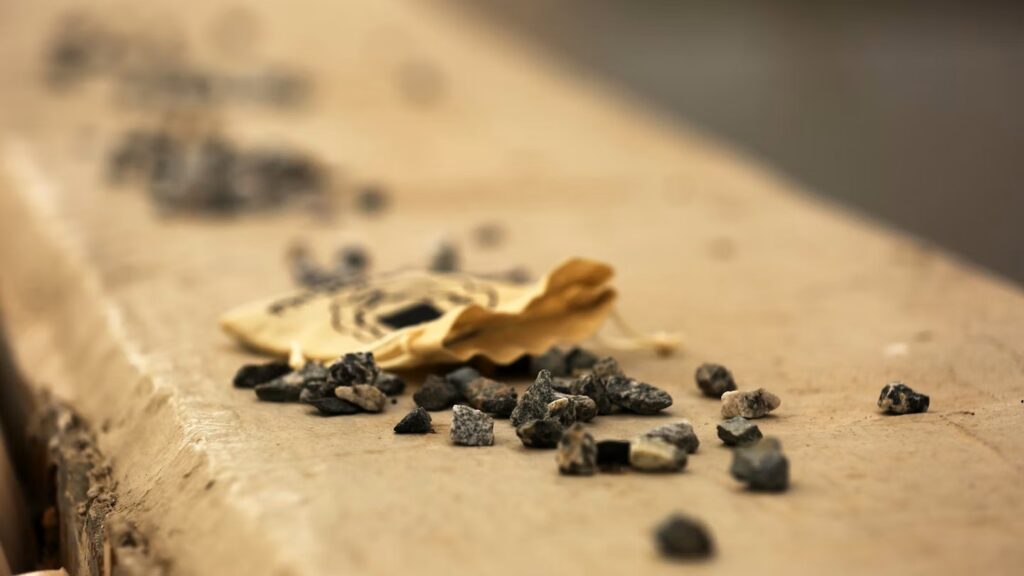
3. Stone Jamratul Aqbah (the largest pillar)
One needs to continue the talbiyah until one starts stoning the Jamratul Aqabah (the largest pillar). So, one stops the talbiyah just before one starts stoning.
قَالَ كُرَيْبٌ فَأَخْبَرَنِي عَبْدُ اللَّهِ بْنُ عَبَّاسٍ، عَنِ الْفَضْلِ، أَنَّ رَسُولَ اللَّهِ صلى الله عليه وسلم لَمْ يَزَلْ يُلَبِّي حَتَّى بَلَغَ الْجَمْرَةَ
Kuraib said: Abdullah ibn Abbas (radiallahu anhuma) narrated from al-Fadl (radiallahu anhu) that Allah’s Messenger (sallallahu alaihi wasallam) continued pronouncing Talbiyah until he reached al-Jamarah (al-Aqaba). [Sahih Muslim, Hadeeth No. 2931]
عَنِ الْفَضْلِ بْنِ عَبَّاسٍ، أَنَّهُ كَانَ رَدِيفَ النَّبِيِّ صلى الله عليه وسلم فَلَمْ يَزَلْ يُلَبِّي حَتَّى رَمَى الْجَمْرَةَ
Remember that stoning the Jamarat is a type of remembrance of Allah.
عن عائشة قالت: قال رسول الله صلى الله عليه وسلّم: إنما جعل الطواف بالبيت وبين الصفا والمروة ورمى الجمار لإقامة ذكر الله
The Prophet (sallallahu alaihi wasallam) said, “The Tawaaf of the House and between As-Safa and Al-Marwah (i.e. Saee) and stoning the Jimaar are only done for the establishment of Allah’s remembrance.” [Sahih Ibn Khuzaimah, Hadeeth No. 2882. Graded “sahih” (authentic) by Mustafa Azami.]
One should try to remain calm whilst stoning.
عَنْ قُدَامَةَ بْنِ عَبْدِ اللَّهِ، قَالَ رَأَيْتُ النَّبِيَّ صلى الله عليه وسلم يَرْمِي الْجِمَارَ عَلَى نَاقَةٍ لَيْسَ ضَرْبٌ وَلاَ طَرْدٌ وَلاَ إِلَيْكَ إِلَيْكَ
There is always a huge rush when heading for the pillars. In fact, there have been deadly stampedes in the past. Please remain calm and do dua (supplication) to Allah to make things easy for you and all the other pilgrims.
On the 10th of Dhul Hijjah, the time for stoning is from sunrise to sunset.
عَنِ ابْنِ عَبَّاسٍ، أَنَّ النَّبِيَّ صلى الله عليه وسلم قَدَّمَ ضَعَفَةَ أَهْلِهِ وَقَالَ : لاَ تَرْمُوا الْجَمْرَةَ حَتَّى تَطْلُعَ الشَّمْسُ
عَنِ ابْنِ عَبَّاسٍ، قَالَ قَدَّمَنَا رَسُولُ اللَّهِ صلى الله عليه وسلم لَيْلَةَ الْمُزْدَلِفَةِ أُغَيْلِمَةَ بَنِي عَبْدِ الْمُطَّلِبِ عَلَى حُمُرَاتٍ فَجَعَلَ يَلْطَحُ أَفْخَاذَنَا وَيَقُولُ : أُبَيْنِيَّ لاَ تَرْمُوا الْجَمْرَةَ حَتَّى تَطْلُعَ الشَّمْسُ . قَالَ أَبُو دَاوُدَ اللَّطْحُ الضَّرْبُ اللَّيِّنُ
Narrated Abdullah ibn Abbas (radiallahu anhuma): The Messenger of Allah (sallallahu alaihi wasallam) sent ahead some boys from Banu Abdul Muttalib on donkeys on the night of al-Muzdalifah. He began to pat our thighs (out of love) and said: O young boys, do not throw pebbles at the jamrah till the sun rises.
Abu Dawud said: The Arabic word al-lath means to strike softly. [Sunan Abee Dawood, Hadeeth No. 1940. Graded “sahih” (authentic) by Al-Albani.]
One should not throw before sunrise. However, there might be a concession for weak pilgrims (women and children) to throw after the middle of the night and before sunrise.
عَنْ عَائِشَةَ، أَنَّهَا قَالَتْ أَرْسَلَ النَّبِيُّ صلى الله عليه وسلم بِأُمِّ سَلَمَةَ لَيْلَةَ النَّحْرِ فَرَمَتِ الْجَمْرَةَ قَبْلَ الْفَجْرِ ثُمَّ مَضَتْ فَأَفَاضَتْ وَكَانَ ذَلِكَ الْيَوْمُ الْيَوْمَ الَّذِي يَكُونُ رَسُولُ اللَّهِ صلى الله عليه وسلم – تَعْنِي – عِنْدَهَا
Narrated Aishah (radiallahu anha), the Mother of the Believers: The Prophet (sallallahu alaihi wasallam) sent Umm Salamah on the night before the day of sacrifice and she threw pebbles at the jamrah before dawn. She hastened (to Makkah) and performed the circumambulation. That day was the one the Messenger of Allah (sallallahu alaihi wasallam) spent with her. [Sunan Abee Dawood, Hadeeth No. 1942. This was graded “weak” Al-Albani. However, Zubair Alee Zaee graded it “hasan” (good) and Shuaib Al-Arnaut graded it “sahih” (authentic). Other scholars also authenticated similar narrations.]
However, there seems to be a difference of opinion over this. It is safer to stone after sunrise.
The Prophet (sallallahu alaihi wasallam) stoned in the forenoon on this day.
عَنْ جَابِرٍ، قَالَ رَمَى رَسُولُ اللَّهِ صلى الله عليه وسلم الْجَمْرَةَ يَوْمَ النَّحْرِ ضُحًى وَرَمَى بَعْدَ يَوْمِ النَّحْرِ إِذَا زَالَتِ الشَّمْسُ
If one is unable to finish stoning before sunset, then it is allowed to stone at night (i.e. after sunset until before dawn).
عَنِ ابْنِ عَبَّاسٍ، قَالَ كَانَ رَسُولُ اللَّهِ صلى الله عليه وسلم يُسْأَلُ أَيَّامَ مِنًى فَيَقُولُ : لاَ حَرَجَ . فَسَأَلَهُ رَجُلٌ فَقَالَ حَلَقْتُ قَبْلَ أَنْ أَذْبَحَ قَالَ: لاَ حَرَجَ . فَقَالَ رَجُلٌ رَمَيْتُ بَعْدَ مَا أَمْسَيْتُ . قَالَ : لاَ حَرَجَ
It was narrated that Ibn Abbas (radiallahu anhuma) said: “The Messenger of Allah (sallallahu alaihi wasallam) was asked questions during the days of Mina and he said: ‘There is no harm.’ A man said: ‘I shaved my head before offering the sacrifice.’ He said: ‘There is no harm.’ Another man said: ‘I stoned (the Jamarat) after evening came.’ He said: “There is no harm.'” [Sunan An-Nasai, Hadeeth No. 3069. Graded “sahih” (authentic) by Al-Albani.]
How does one stone? Well, one needs to throw 7 pebbles at Jamaratul Aqabah (the largest pillar) and say “Allahu Akbar” with each throw.
فَحَرَّكَ قَلِيلاً. ثُمَّ سَلَكَ الطَّرِيقَ الْوُسْطَى الَّتِي تَخْرُجُ عَلَى الْجَمْرَةِ الْكُبْرَى. حَتَّى أَتَى الْجَمْرَةَ الَّتِي عِنْدَ الشَّجَرَةِ. فَرَمَاهَا بِسَبْعِ حَصَيَاتٍ. يُكَبِّرُ مَعَ كُلِّ حَصَاةٍ مِنْهَا. مِثْلِ حَصَى الْخَذْفِ. رَمَى مِنْ بَطْنِ الْوَادِي
He urged her (al-Qaswa) a little, and, following the middle road, which comes out at the greatest jamra, he came to the jamrah which is near the tree. At this he threw seven small pebbles, saying Allahu Akbar while throwing every one of them in a manner in which the small pebbles are thrown (with the help of fingers) and this he did in the bottom of the valley. [Sahih Muslim, Hadeeth No. 2803]
عَنْ عَبْدِ الرَّحْمَنِ بْنِ يَزِيدَ، قَالَ لَمَّا أَتَى عَبْدُ اللَّهِ بْنُ مَسْعُودٍ جَمْرَةَ الْعَقَبَةِ اسْتَبْطَنَ الْوَادِيَ وَاسْتَقْبَلَ الْكَعْبَةَ وَجَعَلَ الْجَمْرَةَ عَلَى حَاجِبِهِ الأَيْمَنِ ثُمَّ رَمَى بِسَبْعِ حَصَيَاتٍ يُكَبِّرُ مَعَ كُلِّ حَصَاةٍ ثُمَّ قَالَ مِنْ هَاهُنَا وَالَّذِي لاَ إِلَهَ غَيْرُهُ رَمَى الَّذِي أُنْزِلَتْ عَلَيْهِ سُورَةُ الْبَقَرَةِ
This is what Jamaratul Aqabah looks like (more pictures will be provided later on in this post, in shaa Allah):
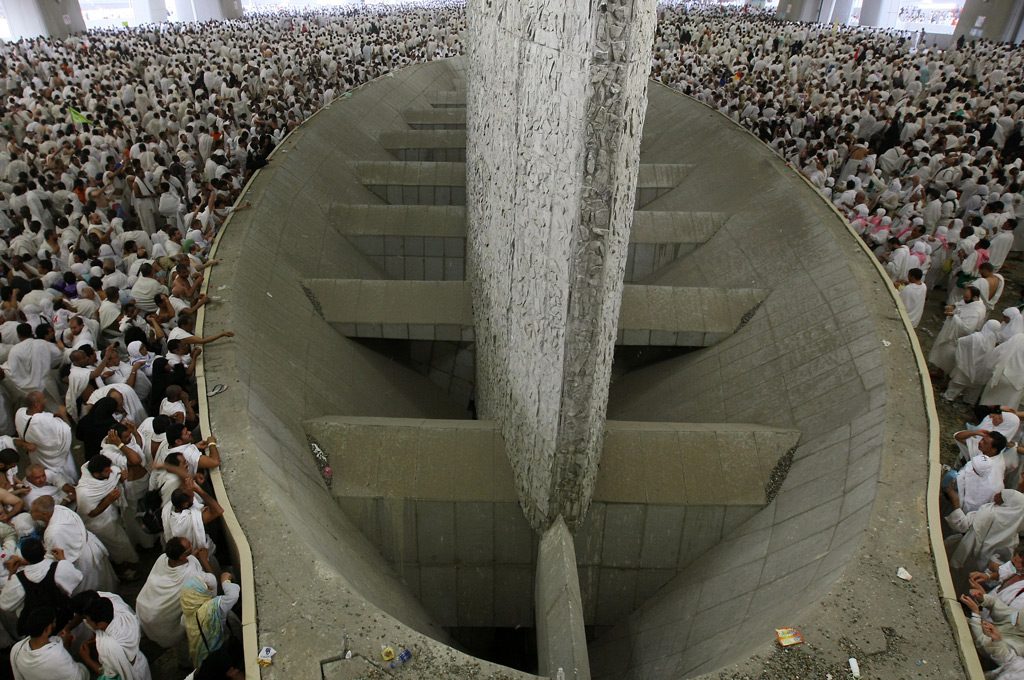
Please note that the pebbles need to fall within the fence around the pillar in order for the stoning to be valid. They do not have to touch the pillar itself.
Shaikh Saleh Al-Fawzan states in his book “A Summary of Islamic Jurisprudence – Volume 1”:
“Each pebble should be thrown into the throwing place (the fenced area surrounding the pillar), whether it settles there or not after falling inside. A pilgrim should point at the fence while throwing the pebbles, not at the pillar itself, for it is not built to be stoned, but to help as a sign showing the throwing place. So, it is insufficient if a pilgrim throws a pebble at the pillar and then it falls outside the fenced area.”
What if you are stoning on behalf of others? First, one needs to make sure that the person on behalf of whom they are stoning has a legitimate reason that renders them unable to stone. Some women get lazy about stoning and send their husbands instead. This is not correct. Refer to this article for more information on those who have legitimate reasons to delegate the stoning to others.
How do you stone on behalf of someone else? Well, first you finish your stoning (all 7) then do the other person’s stoning.
عَنِ ابْنِ عَبَّاسٍ، قَالَ كَانَ رَسُولُ اللَّهِ ـ صلى الله عليه وسلم ـ إِذَا رَمَى جَمْرَةَ الْعَقَبَةِ مَضَى وَلَمْ يَقِفْ
It was narrated that Ibn Abbas (radiallahu anhuma) said: “When the Messenger of Allah (sallallahu alaihi wasallam) had stoned Aqabah Pillar, he would continue on, and would not stay there.” [Sunan Ibn Majah, Hadeeth No. 3033. Graded “sahih” (authentic) by Al-Albani.]
The Prophet (sallallahu alaihi wasallam) delivered a sermon after stoning the pillar.
عَنْ يَحْيَى بْنِ الْحُصَيْنِ، عَنْ جَدَّتِهِ أُمِّ حُصَيْنٍ، قَالَتْ حَجَجْتُ فِي حَجَّةِ النَّبِيِّ صلى الله عليه وسلم فَرَأَيْتُ بِلاَلاً يَقُودُ بِخِطَامِ رَاحِلَتِهِ وَأُسَامَةَ بْنَ زَيْدٍ رَافِعٌ عَلَيْهِ ثَوْبَهُ يُظِلُّهُ مِنَ الْحَرِّ وَهُوَ مُحْرِمٌ حَتَّى رَمَى جَمْرَةَ الْعَقَبَةِ ثُمَّ خَطَبَ النَّاسَ فَحَمِدَ اللَّهَ وَأَثْنَى عَلَيْهِ وَذَكَرَ قَوْلاً كَثِيرًا
It was narrated from Yahya bin Al-Husain that his grandmother, Umm Husain (radiallahu anha) said: “I performed Hajj during the Hajj of the Prophet (sallallahu alaihi wasallam). I saw Bilal holding on the reins of his she-camel, and Usaamah bin Zaid holding his garment over him to shade him from the heat, while he was in Ihram, until he had stoned Jamratual Aqabah. Then he addressed the people and praised Allah, and mentioned many things.” [Sunan An-Nasai, Hadeeth No. 3062. Graded “sahih” (authentic) by Al-Albani.]
عَنْ يَحْيَى بْنِ حُصَيْنٍ، قَالَ سَمِعْتُ جَدَّتِي، تُحَدِّثُ أَنَّهَا سَمِعَتِ النَّبِيَّ صلى الله عليه وسلم يَخْطُبُ فِي حَجَّةِ الْوَدَاعِ وَهُوَ يَقُولُ : وَلَوِ اسْتُعْمِلَ عَلَيْكُمْ عَبْدٌ يَقُودُكُمْ بِكِتَابِ اللَّهِ فَاسْمَعُوا لَهُ وَأَطِيعُوا
It has been narrated on the authority of Yahya bin Husain who learnt the tradition from his grandmother. She said that she heard the Prophet (sallallahu alaihi wasallam) delivering his sermon on the occasion of the Last Pilgrimage. He was saying: If a slave is appointed over you and he conducts your affairs according to the Book of Allah, you should listen to him and obey (his orders). [Sahih Muslim, Hadeeth No. 4528]
عَنْ أَبِي بَكْرَةَ،، وَرَجُلٌ، أَفْضَلُ فِي نَفْسِي مِنْ عَبْدِ الرَّحْمَنِ حُمَيْدُ بْنُ عَبْدِ الرَّحْمَنِ عَنْ أَبِي بَكْرَةَ ـ رضى الله عنه ـ قَالَ خَطَبَنَا النَّبِيُّ صلى الله عليه وسلم يَوْمَ النَّحْرِ، قَالَ : أَتَدْرُونَ أَىُّ يَوْمٍ هَذَا . قُلْنَا اللَّهُ وَرَسُولُهُ أَعْلَمُ. فَسَكَتَ حَتَّى ظَنَنَّا أَنَّهُ سَيُسَمِّيهِ بِغَيْرِ اسْمِهِ. قَالَ : أَلَيْسَ يَوْمَ النَّحْرِ . قُلْنَا بَلَى. قَالَ : أَىُّ شَهْرٍ هَذَا . قُلْنَا اللَّهُ وَرَسُولُهُ أَعْلَمُ. فَسَكَتَ حَتَّى ظَنَنَّا أَنَّهُ سَيُسَمِّيهِ بِغَيْرِ اسْمِهِ. فَقَالَ : أَلَيْسَ ذُو الْحَجَّةِ . قُلْنَا بَلَى. قَالَ : أَىُّ بَلَدٍ هَذَا . قُلْنَا اللَّهُ وَرَسُولُهُ أَعْلَمُ. فَسَكَتَ حَتَّى ظَنَنَّا أَنَّهُ سَيُسَمِّيهِ بِغَيْرِ اسْمِهِ. قَالَ : أَلَيْسَتْ بِالْبَلْدَةِ الْحَرَامِ . قُلْنَا بَلَى. قَالَ : فَإِنَّ دِمَاءَكُمْ وَأَمْوَالَكُمْ عَلَيْكُمْ حَرَامٌ، كَحُرْمَةِ يَوْمِكُمْ هَذَا، فِي شَهْرِكُمْ هَذَا، فِي بَلَدِكُمْ هَذَا، إِلَى يَوْمِ تَلْقَوْنَ رَبَّكُمْ. أَلاَ هَلْ بَلَّغْتُ . قَالُوا نَعَمْ. قَالَ : اللَّهُمَّ اشْهَدْ، فَلْيُبَلِّغِ الشَّاهِدُ الْغَائِبَ، فَرُبَّ مُبَلَّغٍ أَوْعَى مِنْ سَامِعٍ، فَلاَ تَرْجِعُوا بَعْدِي كُفَّارًا يَضْرِبُ بَعْضُكُمْ رِقَابَ بَعْضٍ
Narrated Abu Bakrah (radiallahu anhu): The Prophet (sallallahi alaihi wasallam) delivered to us a sermon on the Day of Nahr. He said, “Do you know what is the day today?” We said, “Allah and His Messenger know better.” He remained silent till we thought that he might give that day another name. He said, “Isn’t it the Day of Nahr?” We said, “It is.” He further asked, “Which month is this?” We said, “Allah and His Messenger know better.” He remained silent till we thought that he might give it another name. He then said, “Isn’t it the month of Dhul-Hijjah?” We replied: “Yes! It is.” He further asked, “What town is this?” We replied, “Allah and His Messenger know it better.” He remained silent till we thought that he might give it another name. He then said, “Isn’t it the forbidden (sacred) town (of Makkah)?” We said, “Yes. It is.” He said, “No doubt, your blood and your properties are sacred to one another like the sanctity of this day of yours, in this month of yours, in this town of yours, till the day you meet your Lord. No doubt! Haven’t I conveyed Allah’s message to you? They said, “Yes.” He said, “O Allah! Be witness. So it is incumbent upon those who are present to convey it (this information) to those who are absent because the informed one might comprehend it (what I have said) better than the present audience, who will convey it to him. Beware! Do not renegade (as) disbelievers after me by striking the necks (cutting the throats) of one another.” [Sahih Al-Bukhari, Volume 2, Hadeeth No. 797]
عَنِ ابْنِ عُمَرَ ـ رضى الله عنهما ـ قَالَ كُنَّا نَتَحَدَّثُ بِحَجَّةِ الْوَدَاعِ وَالنَّبِيُّ صلى الله عليه وسلم بَيْنَ أَظْهُرِنَا، وَلاَ نَدْرِي مَا حَجَّةُ الْوَدَاعِ، فَحَمِدَ اللَّهَ وَأَثْنَى عَلَيْهِ ثُمَّ ذَكَرَ الْمَسِيحَ الدَّجَّالَ فَأَطْنَبَ فِي ذِكْرِهِ وَقَالَ : مَا بَعَثَ اللَّهُ مِنْ نَبِيٍّ إِلاَّ أَنْذَرَ أُمَّتَهُ، أَنْذَرَهُ نُوحٌ وَالنَّبِيُّونَ مِنْ بَعْدِهِ، وَإِنَّهُ يَخْرُجُ فِيكُمْ، فَمَا خَفِيَ عَلَيْكُمْ مِنْ شَأْنِهِ فَلَيْسَ يَخْفَى عَلَيْكُمْ أَنَّ رَبَّكُمْ لَيْسَ عَلَى مَا يَخْفَى عَلَيْكُمْ ثَلاَثًا، إِنَّ رَبَّكُمْ لَيْسَ بِأَعْوَرَ، وَإِنَّهُ أَعْوَرُ عَيْنِ الْيُمْنَى، كَأَنَّ عَيْنَهُ عِنَبَةٌ طَافِيَةٌ . أَلاَ إِنَّ اللَّهَ حَرَّمَ عَلَيْكُمْ دِمَاءَكُمْ وَأَمْوَالَكُمْ، كَحُرْمَةِ يَوْمِكُمْ هَذَا، فِي بَلَدِكُمْ هَذَا، فِي شَهْرِكُمْ هَذَا، أَلاَ هَلْ بَلَّغْتُ . قَالُوا نَعَمْ. قَالَ : اللَّهُمَّ اشْهَدْ، ثَلاَثًا، وَيْلَكُمْ، أَوْ وَيْحَكُمُ، انْظُرُوا لاَ تَرْجِعُوا بَعْدِي كُفَّارًا، يَضْرِبُ بَعْضُكُمْ رِقَابَ بَعْضٍ
Narrated Ibn Umar (radiallahu anhuma): We were talking about Hajjat-ul-Wada (the Farewell Pilgrimage), while the Prophet (sallallahu alaihi wasallam) was amongst us. We did not know what Hajjat-ul-Wada signified. The Prophet (sallallahu alaihi wasallam) praised Allah and then mentioned Al-Maseeh Ad-Dajjal and described him extensively, saying, “Allah did not send any prophet but that prophet warned his nation of Al-Maseeh Ad-Dajjal. Nuh and the prophets following him warned (their people) of him. He will appear amongst you (O Muhammad’s followers), and if it happens that some of his qualities may be hidden from you, but your Lord’s State is clear to you and not hidden from you.” [He (sallallahu alaihi wasallam) said it] thrice. “Verily, your Lord is not blind in one eye, while he (i.e. Ad-Dajjal) is blind in the right eye which looks like a grape bulging out (of its cluster). No doubt! Allah has made your blood and your properties sacred to one another like the sanctity of this day of yours, in this town of yours, in this month of yours. No doubt! Haven’t I conveyed (Allah’s Message to you)? ” They replied, “Yes,” He said, “O Allah! Be witness for it.” thrice. [He added] “Woe to you!” (or said), “May Allah be merciful to you! Do not become infidels after me (i.e. my death) by cutting the necks (throats) of one another.” [Sahih Al-Bukhari, Volume 5, Hadeeth No. 685]
4. Sacrifice the animal
After stoning, it is time to slaughter the sacrificial animal. This is obligatory for those doing Tamattu or Qiran. It is not an obligation for those doing Ifrad but it is recommended for them.
وَأَتِمُّوا الْحَجَّ وَالْعُمْرَةَ لِلَّهِ ۚ فَإِنْ أُحْصِرْتُمْ فَمَا اسْتَيْسَرَ مِنَ الْهَدْيِ ۖ وَلَا تَحْلِقُوا رُءُوسَكُمْ حَتَّىٰ يَبْلُغَ الْهَدْيُ مَحِلَّهُ ۚ فَمَن كَانَ مِنكُم مَّرِيضًا أَوْ بِهِ أَذًى مِّن رَّأْسِهِ فَفِدْيَةٌ مِّن صِيَامٍ أَوْ صَدَقَةٍ أَوْ نُسُكٍ ۚ فَإِذَا أَمِنتُمْ فَمَن تَمَتَّعَ بِالْعُمْرَةِ إِلَى الْحَجِّ فَمَا اسْتَيْسَرَ مِنَ الْهَدْيِ ۚ فَمَن لَّمْ يَجِدْ فَصِيَامُ ثَلَاثَةِ أَيَّامٍ فِي الْحَجِّ وَسَبْعَةٍ إِذَا رَجَعْتُمْ ۗ تِلْكَ عَشَرَةٌ كَامِلَةٌ ۗ ذَٰلِكَ لِمَن لَّمْ يَكُنْ أَهْلُهُ حَاضِرِي الْمَسْجِدِ الْحَرَامِ ۚ وَاتَّقُوا اللَّهَ وَاعْلَمُوا أَنَّ اللَّهَ شَدِيدُ الْعِقَابِ
And perform properly (i.e. all the ceremonies according to the ways of Prophet Muhammad), the Hajj and Umrah (i.e. the pilgrimage to Makkah) for Allah. But if you are prevented (from completing them), sacrifice a Hady (animal, i.e. a sheep, a cow, or a camel, etc.) such as you can afford, and do not shave your heads until the Hady reaches the place of sacrifice. And whosoever of you is ill or has an ailment in his scalp (necessitating shaving), he must pay a Fidyah (ransom) of either observing Saum (fasts) (three days) or giving Sadaqah (charity – feeding six poor persons) or offering sacrifice (one sheep). Then if you are in safety and whosoever performs the Umrah in the months of Hajj, before (performing) the Hajj, (i.e. Hajj-at-Tamattu and Al-Qiran), he must slaughter a Hady such as he can afford, but if he cannot afford it, he should observe Saum (fasts) three days during the Hajj and seven days after his return (to his home), making ten days in all. This is for him whose family is not present at Al-Masjid-al-Haram (i.e. non-resident of Makkah). And fear Allah much and know that Allah is Severe in punishment. [Surah Al-Baqarah (2) : 196]
ثُمَّ انْصَرَفَ إِلَى الْمَنْحَرِ. فَنَحَرَ ثَلاَثَاً وَسِتِّينَ بِيَدِهِ. ثُمَّ أَعْطَى عَلِيّاً. فَنَحَرَ مَا غَبَرَ. وَأَشْرَكَهُ فِي هَدْيِهِ. ثُمَّ أَمَرَ مِنْ كُلِّ بَدَنَةٍ بِبَضْعَةٍ. فَجُعِلَتْ فِي قِدْرٍ. فَطُبِخَتْ. فَأَكَلاَ مِنْ لَحْمِهَا وَشَرِبَا مِنْ مَرَقِهَا
He then went to the place of sacrifice, and sacrificed sixty-three (camels) with his own hand. Then he gave the remaining number to Ali (radiallahu anhu) who sacrificed them, and he shared him in his sacrifice. He then commanded that a piece of flesh from each animal sacrificed should be put in a pot, and when it was cooked, both of them (the Prophet and Ali) took some meat out of it and drank its soup. [Sahih Muslim, Hadeeth No. 2803]
One can delegate one’s sacrifice to others (i.e. ask someone else to do it for them) as proven by the above hadeeth.
The sacrifice can be done at Mina or Makkah.
عَنْ جَابِر بْن عَبْدِ اللَّهِ، أَنَّ رَسُولَ اللَّهِ صلى الله عليه وسلم قَالَ : كُلُّ عَرَفَةَ مَوْقِفٌ وَكُلُّ مِنًى مَنْحَرٌ وَكُلُّ الْمُزْدَلِفَةِ مَوْقِفٌ وَكُلُّ فِجَاجِ مَكَّةَ طَرِيقٌ وَمَنْحَرٌ
Jabir bin Abdullah (radiallahu anhuma) reported the the Messenger of Allah (sallallahu alaihi wasallam) as saying “The whole of Arafah is a place of standing, the whole of Mina is a place of sacrifice, the whole of Al Muzdalifah is a place of standing and every pass in Makkah is a road and a place of sacrifice. [Sunan Abee Dawood, Hadeeth No. 1937. Graded “hasan sahih” (authentic) by Al-Albani.]
According to Shaikh Ibn Uthaimeen, it is allowed to also slaughter in Muzdalifah. The important thing is that it should be within the boundaries of the Haram.
These days, the sacrifice is arranged through one’s Hajj operator. If not, one may purchase coupons for this in specific places. It seems it is possible to go and slaughter one’s animal oneself as well.
Here’s a guide on how to do the sacrifice. And here’s a beneficial article on the different types of sacrifices.
One can eat from the sacrificial animal, before distributing the meat to the poor of Makkah. This is unlike the expiation sacrifice, which one should NOT eat from.
لِّيَشْهَدُوا مَنَافِعَ لَهُمْ وَيَذْكُرُوا اسْمَ اللَّهِ فِي أَيَّامٍ مَّعْلُومَاتٍ عَلَىٰ مَا رَزَقَهُم مِّن بَهِيمَةِ الْأَنْعَامِ ۖ فَكُلُوا مِنْهَا وَأَطْعِمُوا الْبَائِسَ الْفَقِيرَ
That they may witness benefits for themselves and mention the name of Allah on known days over what He has provided for them of [sacrificial] animals. So eat of them and feed the miserable and poor. [Surah Al-Hajj (22) : 28]
ثُمَّ انْصَرَفَ إِلَى الْمَنْحَرِ. فَنَحَرَ ثَلاَثَاً وَسِتِّينَ بِيَدِهِ. ثُمَّ أَعْطَى عَلِيّاً. فَنَحَرَ مَا غَبَرَ. وَأَشْرَكَهُ فِي هَدْيِهِ. ثُمَّ أَمَرَ مِنْ كُلِّ بَدَنَةٍ بِبَضْعَةٍ. فَجُعِلَتْ فِي قِدْرٍ. فَطُبِخَتْ. فَأَكَلاَ مِنْ لَحْمِهَا وَشَرِبَا مِنْ مَرَقِهَا
He then went to the place of sacrifice, and sacrificed sixty-three (camels) with his own hand. Then he gave the remaining number to Ali (radiallahu anhu) who sacrificed them, and he shared him in his sacrifice. He then commanded that a piece of flesh from each animal sacrificed should be put in a pot, and when it was cooked, both of them (the Prophet and Ali) took some meat out of it and drank its soup. [Sahih Muslim, Hadeeth No. 2803]
This sacrifice should remind one of the sacrifice of Ismail (alaihissalaam). Allah says:
وَقَالَ إِنِّي ذَاهِبٌ إِلَىٰ رَبِّي سَيَهْدِينِ
رَبِّ هَبْ لِي مِنَ الصَّالِحِينَ
فَبَشَّرْنَاهُ بِغُلَامٍ حَلِيمٍ
فَلَمَّا بَلَغَ مَعَهُ السَّعْيَ قَالَ يَا بُنَيَّ إِنِّي أَرَىٰ فِي الْمَنَامِ أَنِّي أَذْبَحُكَ فَانظُرْ مَاذَا تَرَىٰ ۚ قَالَ يَا أَبَتِ افْعَلْ مَا تُؤْمَرُ ۖ سَتَجِدُنِي إِن شَاءَ اللَّهُ مِنَ الصَّابِرِينَ
فَلَمَّا أَسْلَمَا وَتَلَّهُ لِلْجَبِينِ
وَنَادَيْنَاهُ أَن يَا إِبْرَاهِيمُ
قَدْ صَدَّقْتَ الرُّؤْيَا ۚ إِنَّا كَذَٰلِكَ نَجْزِي الْمُحْسِنِينَ
إِنَّ هَٰذَا لَهُوَ الْبَلَاءُ الْمُبِينُ
وَفَدَيْنَاهُ بِذِبْحٍ عَظِيمٍ
And he (Ibrahim) said (after his rescue from the fire): “Verily, I am going to my Lord. He will guide me!” “My Lord! Grant me (offspring) from the righteous.” So We gave him the glad tidings of a forbearing boy. And, when he (his son) was old enough to walk with him, he said: “O my son! I have seen in a dream that I am slaughtering you (offer you in sacrifice to Allah), so look what you think!” He said: “O my father! Do that which you are commanded, Insha Allah (if Allah will), you shall find me of As-Sabireen (the patient ones, etc.).”
Then, when they had both submitted themselves (to the Will of Allah), and he had laid him prostrate on his forehead (or on the side of his forehead for slaughtering); And We called out to him: “O Ibrahim! You have fulfilled the dream (vision)!” Verily! Thus do We reward the Muhsinoon (good-doers). Verily, that indeed was a manifest trial. And We ransomed him with a great sacrifice (i.e. a ram); [Surah As-Saffaat (37) : 99 – 107]
Imam Ibn Kathir (rahimahullah) states in his explanation of these ayaat (verses):
“Allah tells us that after He helped His close friend Ibrahim (peace be upon him) against his people, and after Ibrahim gave up hoping that they would ever believe despite all the mighty signs that they had witnessed, he emigrated away from them, and said:
﴿ وَقَالَ إِنِّى ذَاهِبٌ إِلَىٰ رَبِّى سَيَہۡدِينِ • رَبِّ هَبۡ لِى مِنَ ٱلصَّـٰلِحِينَ ﴾
(Verily, I am going to my Lord. He will guide me! My Lord! Grant me (offspring) from the righteous.) meaning, obedient children, in compensation for his people and relatives whom he had left. Allah said:
﴿ فَبَشَّرۡنَـٰهُ بِغُلَـٰمٍ حَلِيمٍ۬ ﴾
(So We gave him the glad tidings of a forbearing boy.) This child was Ismail (peace be upon him) for he was the first child of whom glad tidings were given to Ibrahim (peace be upon him) and he was older than Ishaq. The Muslims and the People of the Book agree, and indeed it is stated in their Book, that Ismail (peace be upon him) was born when Ibrahim (peace be upon him) was eighty-six years old, and Ishaq was born when Ibrahim was ninety-nine years old. According to their Book, Allah commanded Ibrahim to sacrifice his only son, and in another text it says his firstborn son. But here they falsely inserted the name of Ishaq. This is not right because it goes against what their own Scripture says. They inserted the name of Ishaq because he is their ancestor, while Ismail is the ancestor of the Arabs. They were jealous of them, so they added this idea and changed the meaning of the phrase “only son” to mean `the only son who is with you,’ because Ismail had been taken with his mother to Makkah. But this is a case of falsification and distortion, because the words “only son” cannot be said except in the case of one who has no other son. Furthermore, the firstborn son has a special status that is not shared by subsequent children, so the command to sacrifice him is a more exquisite test.
﴿ فَلَمَّا بَلَغَ مَعَهُ ٱلسَّعۡىَ ﴾
(And when he (his son) was old enough to walk with him,) means, when he grew up and started to go with his father and walk with him, for Ibrahim used to go every so often to check on his son and his mother in the land of Faran (i.e. Makkah), to see how they were doing. It was said that he used to ride on Al-Buraq, traveling there swiftly, and Allah knows best. It was reported from Ibn Abbas, (peace be upon him) , Mujahid, Ikrimah, Said bin Jubayr, Ata Al-Khurasani, Zayd bin Aslam and others that
﴿ فَلَمَّا بَلَغَ مَعَهُ ٱلسَّعۡىَ ﴾
(And when he (his son) was old enough to walk with him,) means, when he became a young man and was able to work as his father did.
﴿ فَلَمَّا بَلَغَ مَعَهُ ٱلسَّعۡىَ قَالَ يَـٰبُنَىَّ إِنِّىٓ أَرَىٰ فِى ٱلۡمَنَامِ أَنِّىٓ أَذۡبَحُكَ فَٱنظُرۡ مَاذَا تَرَىٰۚ ﴾
(And, when he (his son) was old enough to walk with him, he said: “O my son! I have seen in a dream that I am slaughtering you. So look what you think!”) Ubayd bin Umayr said, “The dreams of the Prophets are revelation,” then he recited this Ayah:
﴿ قَالَ يَـٰبُنَىَّ إِنِّىٓ أَرَىٰ فِى ٱلۡمَنَامِ أَنِّىٓ أَذۡبَحُكَ فَٱنظُرۡ مَاذَا تَرَىٰۚ ﴾
(he said: “O my son! I have seen in a dream that I am slaughtering you. So look what you think!”). He told his son that in order to make it easier for him, and also to test his patience and resolve, at a young age, in obeying Allah and obeying his father.
﴿ قَالَ يَـٰٓأَبَتِ ٱفۡعَلۡ مَا تُؤۡمَرُۖ ﴾
(He said: “O my father! Do that which you are commanded…”) meaning, `obey the command of Allah and sacrifice me.’
﴿ سَتَجِدُنِىٓ إِن شَآءَ ٱللَّهُ مِنَ ٱلصَّـٰبِرِينَ ﴾
(if Allah wills, you shall find me of the patient.) meaning, `I will be patient and will seek the reward for that with Allah.’ He, may peace and blessings be upon him, believed in what had been promised. Allah said:
﴿ وَٱذۡكُرۡ فِى ٱلۡكِتَـٰبِ إِسۡمَـٰعِيلَۚ إِنَّهُ ۥ كَانَ صَادِقَ ٱلۡوَعۡدِ وَكَانَ رَسُولاً۬ نَّبِيًّ۬ا • وَكَانَ يَأۡمُرُ أَهۡلَهُ ۥ بِٱلصَّلَوٰةِ وَٱلزَّكَوٰةِ وَكَانَ عِندَ رَبِّهِۦ مَرۡضِيًّ۬ا ﴾
(And mention in the Book Ismail. Verily, he was true to what he promised, and he was a Messenger, (and) a Prophet. And he used to enjoin on his family the Salah and the Zakah, and his Lord was pleased with him.) (19:54-55).
﴿ فَلَمَّآ أَسۡلَمَا وَتَلَّهُ ۥ لِلۡجَبِينِ ﴾
(Then, when they had both submitted themselves, and he had laid him prostrate on his forehead;) means, when both of them had pronounced the Shahadah and remembered Allah — Ibrahim because he was about to offer a sacrifice and Ismail because he was about to die. Or it was said that “submitted themselves” means that they submitted and followed the command of Allah; Ibrahim obeyed the command of Allah and Ismail obeyed Allah and his father. This was the view of Mujahid, Ikrimah, Qatadah, As-Suddi and Ibn Ishaq, and others. The meaning of the phrase “and he had laid him prostrate on his forehead” is: he placed him facedown so that he could slaughter him from behind, and not have to see his face at the time of slaughter, so that it would be easier for him. Ibn Abbas (may Allah be pleased with him) Mujahid, Said bin Jubayr, Ad-Dahhak and Qatadah said:
﴿ وَتَلَّهُ ۥ لِلۡجَبِينِ ﴾
(and he had laid him prostrate on his forehead;) means, “He turned him upside down on his face.” Imam Ahmad recorded that Ibn Abbas (may Allah be pleased with him) said, “When the rituals were enjoined upon Ibrahim (peace be upon him), the Shaytan appeared to him at the Masaa and raced with him, but Ibrahim got there first. Then Jibril, upon him be peace, took him to Jamrat Al-Aqabah and the Shaytan appeared to him, so he stoned him with seven pebbles until he disappeared. Then he appeared him at Al-Jamrah Al-Wusta and he stoned him with seven pebbles. Then he laid him prostrate on his face. Ismail (peace be upon him) was wearing a white shirt, and he said, `O my father, I do not have any garment in which I can be shrouded apart from this; take it off me so that you can shroud me in it.’ He started to take it off, then he was called from behind:
﴿ أَن يَـٰٓإِبۡرَٲهِيمُ • قَدۡ صَدَّقۡتَ ٱلرُّءۡيَآۚ ﴾
(O Ibrahim! You have fulfilled the dream!) Ibrahim turned, and saw a fine, horned, white ram.” Ibn Abbas said, “We used to look for similar types of rams.” Hisham mentioned this Hadith at length in Al-Manasik.
﴿ وَنَـٰدَيۡنَـٰهُ أَن يَـٰٓإِبۡرَٲهِيمُ • قَدۡ صَدَّقۡتَ ٱلرُّءۡيَآۚ ﴾
(We called out to him: “O Ibrahim! You have fulfilled the dream!”) means, `the purpose of your dream has been fulfilled by your laying down your son to sacrifice him.’ As-Suddi and others said that he passed the knife over Ismail’s neck, but it did not cut him at all, because a sheet of copper was placed between them. Ibrahim was called at that point, and it was said:
﴿ قَدۡ صَدَّقۡتَ ٱلرُّءۡيَآۚ ﴾
(You have fulfilled the dream!) Allah says;
﴿ إِنَّا كَذَٲلِكَ نَجۡزِى ٱلۡمُحۡسِنِينَ ﴾
(Verily, thus do We reward the doers of good.) means, `this is how We deal with those who obey Us in things that are difficult for them; We make for them a way out.’ As Allah says:
﴿ فَإِذَا بَلَغۡنَ أَجَلَهُنَّ فَأَمۡسِكُوهُنَّ بِمَعۡرُوفٍ أَوۡ فَارِقُوهُنَّ بِمَعۡرُوفٍ۬ وَأَشۡہِدُواْ ذَوَىۡ عَدۡلٍ۬ مِّنكُمۡ وَأَقِيمُواْ ٱلشَّهَـٰدَةَ لِلَّهِۚ ذَٲلِڪُمۡ يُوعَظُ بِهِۦ مَن كَانَ يُؤۡمِنُ بِٱللَّهِ وَٱلۡيَوۡمِ ٱلۡأَخِرِۚ وَمَن يَتَّقِ ٱللَّهَ يَجۡعَل لَّهُ ۥ مَخۡرَجً۬ا • وَيَرۡزُقۡهُ مِنۡ حَيۡثُ لَا يَحۡتَسِبُۚ وَمَن يَتَوَكَّلۡ عَلَى ٱللَّهِ فَهُوَ حَسۡبُهُ ۥۤۚ إِنَّ ٱللَّهَ بَـٰلِغُ أَمۡرِهِۦۚ قَدۡ جَعَلَ ٱللَّهُ لِكُلِّ شَىۡءٍ۬ قَدۡرً۬ا ﴾
(And whosoever has Taqwa of Allah, He will make a way for him to get out (from every difficulty). And He will provide him from (sources) he never could imagine. And whosoever puts his trust in Allah, then He will suffice him. Verily, Allah will accomplish his purpose. Indeed Allah has set a measure for all things.) (65:2-3). On the basis of this Ayah and this story, some of the scholars of Usul have stated that it is valid for a ruling to be abrogated before anyone is able to act upon it — unlike some of the Mutazilah. The evidence for this is obvious, because Allah commanded Ibrahim (peace be upon him) , to sacrifice his son, then He abrogated that and pointed out the ransom. The purpose of His command had been primarily to reward His close Friend for his patience and resolve in sacrificing his son. Allah says:
﴿ إِنَّ هَـٰذَا لَهُوَ ٱلۡبَلَـٰٓؤُاْ ٱلۡمُبِينُ ﴾
(Verily, that indeed was a manifest trial.) meaning, it was clearly a test when he was commanded to sacrifice his son, so, he hastened to do it, in submission to the command of Allah and in obedience to Him. Allah said:
﴿ وَإِبۡرَٲهِيمَ ٱلَّذِى وَفَّىٰٓ ﴾
(And of Ibrahim who fulfilled all that.) (53:37), and
﴿ وَفَدَيۡنَـٰهُ بِذِبۡحٍ عَظِيمٍ۬ ﴾
(And We ransomed him with a great sacrifice). It was reported that Ibn Abbas (may Allah be pleased with him) said, “A ram which had grazed in Paradise for forty years.” Imam Ahmad recorded that Safiyyah bint Shaybah said, “A woman from Bani Sulaym, who was the midwife of most of the people in our household, told me that the Messenger of Allah sent for Uthman bin Talhah, may Allah be pleased with him.” On one occasion she said, “I asked Uthman, `Why did the Prophet call you’ He said, `The Messenger of Allah said to me,
« إِنِّي كُنْتُ رَأَيْتُ قَرْنَيِ الْكَبْشِ حِينَ دَخَلْتُ الْبَيْتَ فَنَسِيتُ أَنْ آمُرَكَ أَنْ تُخَمِّرَهُمَا فَخَمِّرْهُمَا، فَإِنَّهُ لَا يَنْبَغِي أَنْ يَكُونَ فِي الْبَيْتِ شَيْءٌ يَشْغَلُ الْمُصَلِّي »
(I saw the horns of the ram when I entered the House (i.e., the Kabah), and I forgot to tell you to cover them up; cover them up, for there should not be anything in the House which could distract the worshipper.)”’ Sufyan said, “The horns of the ram remained hanging in the House until it was burned, and they were burned too.” This offers independent evidence that the one who was to be sacrificed was Ismail (peace be upon him) . The Quraysh had inherited the horns of the ram that Ibrahim sacrificed, and they had been passed down from generation to generation, until the Messenger of Allah was sent. And Allah knows best.”
The time of the sacrifice is from the 10th Dhul Hijjah until sunset on the 13th Day. One should not do it before the 10th.
If one cannot fast, then one is meant to fast for ten days.
وَأَتِمُّوا الْحَجَّ وَالْعُمْرَةَ لِلَّهِ ۚ فَإِنْ أُحْصِرْتُمْ فَمَا اسْتَيْسَرَ مِنَ الْهَدْيِ ۖ وَلَا تَحْلِقُوا رُءُوسَكُمْ حَتَّىٰ يَبْلُغَ الْهَدْيُ مَحِلَّهُ ۚ فَمَن كَانَ مِنكُم مَّرِيضًا أَوْ بِهِ أَذًى مِّن رَّأْسِهِ فَفِدْيَةٌ مِّن صِيَامٍ أَوْ صَدَقَةٍ أَوْ نُسُكٍ ۚ فَإِذَا أَمِنتُمْ فَمَن تَمَتَّعَ بِالْعُمْرَةِ إِلَى الْحَجِّ فَمَا اسْتَيْسَرَ مِنَ الْهَدْيِ ۚ فَمَن لَّمْ يَجِدْ فَصِيَامُ ثَلَاثَةِ أَيَّامٍ فِي الْحَجِّ وَسَبْعَةٍ إِذَا رَجَعْتُمْ ۗ تِلْكَ عَشَرَةٌ كَامِلَةٌ ۗ ذَٰلِكَ لِمَن لَّمْ يَكُنْ أَهْلُهُ حَاضِرِي الْمَسْجِدِ الْحَرَامِ ۚ وَاتَّقُوا اللَّهَ وَاعْلَمُوا أَنَّ اللَّهَ شَدِيدُ الْعِقَابِ
And perform properly (i.e. all the ceremonies according to the ways of Prophet Muhammad), the Hajj and Umrah (i.e. the pilgrimage to Makkah) for Allah. But if you are prevented (from completing them), sacrifice a Hady (animal, i.e. a sheep, a cow, or a camel, etc.) such as you can afford, and do not shave your heads until the Hady reaches the place of sacrifice. And whosoever of you is ill or has an ailment in his scalp (necessitating shaving), he must pay a Fidyah (ransom) of either observing Saum (fasts) (three days) or giving Sadaqah (charity – feeding six poor persons) or offering sacrifice (one sheep). Then if you are in safety and whosoever performs the Umrah in the months of Hajj, before (performing) the Hajj, (i.e. Hajj-at-Tamattu and Al-Qiran), he must slaughter a Hady such as he can afford, but if he cannot afford it, he should observe Saum (fasts) three days during the Hajj and seven days after his return (to his home), making ten days in all. This is for him whose family is not present at Al-Masjid-al-Haram (i.e. non-resident of Makkah). And fear Allah much and know that Allah is Severe in punishment. [Surah Al-Baqarah (2) : 196]
عَنْ سَالِمِ بْنِ عَبْدِ اللَّهِ، أَنَّ ابْنَ عُمَرَ ـ رضى الله عنهما ـ قَالَ تَمَتَّعَ رَسُولُ اللَّهِ صلى الله عليه وسلم فِي حَجَّةِ الْوَدَاعِ بِالْعُمْرَةِ إِلَى الْحَجِّ، وَأَهْدَى فَسَاقَ مَعَهُ الْهَدْىَ مِنْ ذِي الْحُلَيْفَةِ، وَبَدَأَ رَسُولُ اللَّهِ صلى الله عليه وسلم فَأَهَلَّ بِالْعُمْرَةِ، ثُمَّ أَهَلَّ بِالْحَجِّ، فَتَمَتَّعَ النَّاسُ مَعَ النَّبِيِّ صلى الله عليه وسلم بِالْعُمْرَةِ إِلَى الْحَجِّ، فَكَانَ مِنَ النَّاسِ مَنْ أَهْدَى فَسَاقَ الْهَدْىَ، وَمِنْهُمْ مَنْ لَمْ يُهْدِ، فَلَمَّا قَدِمَ النَّبِيُّ صلى الله عليه وسلم مَكَّةَ، قَالَ لِلنَّاسِ : مَنْ كَانَ مِنْكُمْ أَهْدَى فَإِنَّهُ لاَ يَحِلُّ لِشَىْءٍ حَرُمَ مِنْهُ حَتَّى يَقْضِيَ حَجَّهُ، وَمَنْ لَمْ يَكُنْ مِنْكُمْ أَهْدَى فَلْيَطُفْ بِالْبَيْتِ، وَبِالصَّفَا وَالْمَرْوَةِ، وَلْيُقَصِّرْ، وَلْيَحْلِلْ، ثُمَّ لِيُهِلَّ بِالْحَجِّ، فَمَنْ لَمْ يَجِدْ هَدْيًا فَلْيَصُمْ ثَلاَثَةَ أَيَّامٍ فِي الْحَجِّ وَسَبْعَةً إِذَا رَجَعَ إِلَى أَهْلِهِ
Salim ibn Abdullah narrated that Ibn Umar (radiallahu anhuma) said: During the last Hajj (Hajj-al-Wada) of Allah’s Messenger (sallallahu alaihi wasallam) he performed Umrah and Hajj. He drove a Hadi (sacrificial animal) along with him from Dhul-Hulaifah. Allah’s Messenger (sallallahu alaihi wasallam) started by assuming Ihram for Umrah and Hajj. And the people, too, performed the Umrah and Hajj along with the Prophet (sallallahu alaihi wasallam). Some of them brought the Hadi and drove it along with them, while the others did not. So, when the Prophet (sallallahu alaihi wasallam) arrived at Makkah, he said to the people, “Whoever among you has driven the Hadi, should not finish his Ihram till he completes his Hajj. And whoever among you has not (driven) the Hadi with him, should perform Tawaf of the Kabah and the Tawaf between Safa and Marwah (i.e. the saee), then cut short his hair and finish his Ihram, and should later assume Ihram for Hajj; but he must offer a Hadi (sacrifice); and if anyone cannot afford a Hadi, he should fast for three days during the Hajj and seven days when he returns home. [Sahih Al-Bukhari, Volume 2, Hadeeth No. 750]
When does one fast the three days during Hajj?
عَنِ ابْنِ عُمَرَ ـ رضى الله عنهما ـ قَالَ الصِّيَامُ لِمَنْ تَمَتَّعَ بِالْعُمْرَةِ إِلَى الْحَجِّ، إِلَى يَوْمِ عَرَفَةَ، فَإِنْ لَمْ يَجِدْ هَدْيًا وَلَمْ يَصُمْ صَامَ أَيَّامَ مِنًى
Narrated Ibn Umar (radiallahu anhuma): Fasting for those who perform Hajj-at-Tamattu (in lieu of the Hadi (sacrificial animal) which they cannot afford) may be performed up to the day of Arafah. And if one does not get a Hadi and has not fasted (before Eid) then one should fast of the days of Mina. (11th, 12th and 13th of Dhul Hijjah). [Sahih Al-Bukhari, Volume 3, Hadeeth No. 217]
5. Shave or trim your hair
After your animal has been sacrificed (try to confirm this first), one may shave or trim their hair. Shaving and trimming the hair wer already discussed in Part 8 at the end of Umrah, so please refer to that.
Men can shave or trim their hair.
عَنْ نَافِعٍ، أَخْبَرَهُ ابْنُ عُمَرَ، أَنَّ النَّبِيَّ صلى الله عليه وسلم حَلَقَ فِي حَجَّةِ الْوَدَاعِ وَأُنَاسٌ مِنْ أَصْحَابِهِ وَقَصَّرَ بَعْضُهُمْ
Narrated Ibn Umar (radiallahu anhu): During Haj Al-Wada (the Farewell Hajj) , the Prophet (sallallahu alaihi wasallam) and some of his companions got their heads shaved while some of his companions got their hair cut short. [Sahih Al-Bukhari, Volume 5, Hadeeth No. 695]
Shaving the hair is three times more rewarding than trimming it.
عَنْ أَبِي هُرَيْرَة قَالَ قَالَ رَسُولُ اللَّهِ صلى الله عليه وسلم : اللَّهُمَّ اغْفِرْ لِلْمُحَلِّقِينَ . قَالُوا يَا رَسُولَ اللَّهِ وَلِلْمُقَصِّرِينَ قَالَ : اللَّهُمَّ اغْفِرْ لِلْمُحَلِّقِينَ. قَالُوا يَا رَسُولَ اللَّهِ وَلِلْمُقَصِّرِينَ قَالَ : اللَّهُمَّ اغْفِرْ لِلْمُحَلِّقِينَ . قَالُوا يَا رَسُولَ اللَّهِ وَلِلْمُقَصِّرِينَ قَالَ : وَلِلْمُقَصِّرِينَ
Abu Hurairah (radiallahu anhu) reported Allah’s Messenger (sallallahu alaihi wasallam) as having said: O Allah, grant pardon to those who got their heads shaved. They (Companions of the Holy Prophet) said: Messenger of Allah, (what about those) who get their hair cut? He said: O Allah, grant pardon to those who get their heads shaved. They said: Messenger of Allah, (what about those) who got their hair cut? He said: O Allah, grant pardon to those who get their heads shaved. They said: Messenger of Allah, (what about those) who get their hair cut? He said: (O Allah, grant pardon to) those who get their hair cut. [Sahih Muslim, Hadeeth No. 2987]
عَنِ ابْنِ عُمَرَ قَالَ نَهَى رَسُولُ اللَّهِ صلى الله عليه وسلم عَنِ الْقَزَعِ وَالْقَزَعُ أَنْ يُحْلَقَ رَأْسُ الصَّبِيِّ فَيُتْرَكَ بَعْضُ شَعْرِهِ
Narrated Ibn Umar (radiallahu anhuma): The Messenger of Allah (sallallahu alaihi wasallam) forbade qaz. Qaz means having part of a boy’s head shaved and leaving part unshaven. [Sunan Abee Dawood, Hadeeth No. 4193. Graded “sahih” (authentic) by Al-Albani.]
Despite the Prophet’s prohibition of shaving only a part of the head, sadly many Muslims still do it and also let their sons do it. It has become “fashionable” these days, although the reality is that it looks atrocious and worse still, the person has disobeyed the Messenger of Allah (sallallahu alaihi wasallam).
As for the women, as mentioned in Part 8, they simply need to trim a bit from the ends of their hair. They are not supposed to shave their hair.
عَنْ ابْن عَبَّاس قَالَ قَالَ رَسُولُ اللَّهِ صلى الله عليه وسلم : لَيْسَ عَلَى النِّسَاءِ الْحَلْقُ إِنَّمَا عَلَى النِّسَاءِ التَّقْصِيرُ
Narrated Abdullah ibn Abbas (radiallahu anhuma): The Prophet (sallallahu alaihi wasallam) said: Women should not shave; rather they are only required to trim (their hair). [Sunan Abee Dawood, Hadeeth No. 1985. Graded “sahih” (authentic) by Al-Albani.]
Also, the women should remember not to expose their hair in public as that is not allowed.
6. Complete the first stage of exiting ihram
ِNow, one may partially exit ihram. This is called the first stage of exiting ihram. One is allowed to do everything (e.g. wear normal clothes, remove bodily hair, put on perfume, etc.), except for sexual intercourse.
عَنِ ابْنِ عَبَّاسٍ، قَالَ إِذَا رَمَيْتُمُ الْجَمْرَةَ فَقَدْ حَلَّ لَكُمْ كُلُّ شَىْءٍ إِلاَّ النِّسَاءَ . فَقَالَ لَهُ رَجُلٌ يَا ابْنَ عَبَّاسٍ وَالطِّيبُ فَقَالَ أَمَّا أَنَا فَقَدْ رَأَيْتُ رَسُولَ اللَّهِ ـ صلى الله عليه وسلم ـ يُضَمِّخُ رَأْسَهُ بِالْمِسْكِ أَفَطِيبٌ ذَلِكَ أَمْ لاَ
عَنْ عَائِشَةَ، – رضى الله عنها – قَالَتْ طَيَّبْتُ رَسُولَ اللَّهِ صلى الله عليه وسلم لِحُرْمِهِ حِينَ أَحْرَمَ وَلِحِلِّهِ قَبْلَ أَنْ يَطُوفَ بِالْبَيْتِ
Aishah (radiallahu anha) reported: I applied perfume to the Messenger of Allah (sallallahu alaihi wasallam) before he entered upon the state of lhram and (concluding) before circumambulating the (sacred) House. [Sahih Muslim, Hadeeth No. 2680]
Shaikh Saleh Al-Fawzan points out in his book, “A Summary of Islamic Jurisprudence – Part 1”, that the pilgrim can complete the first stage of exiting ihram by doing 2 of the following 3 acts:
- Throwing the pebbles
- Shaving/Cutting hair
- Tawaf of the Kaabah, followed by Saee (for those who are obliged to do Saee)
When the pilgrim completes all these three acts, then he has fully exited ihram. Therefore, sexual intercourse with his spouse becomes lawful for him.
عَنْ عَبْدِ اللَّهِ بْنِ عَمْرٍو، أَنَّ رَسُولَ اللَّهِ صلى الله عليه وسلم وَقَفَ فِي حَجَّةِ الْوَدَاعِ، فَجَعَلُوا يَسْأَلُونَهُ، فَقَالَ رَجُلٌ لَمْ أَشْعُرْ فَحَلَقْتُ قَبْلَ أَنْ أَذْبَحَ. قَالَ : اذْبَحْ وَلاَ حَرَجَ . فَجَاءَ آخَرُ فَقَالَ لَمْ أَشْعُرْ فَنَحَرْتُ قَبْلَ أَنْ أَرْمِيَ. قَالَ : ارْمِ وَلاَ حَرَجَ. فَمَا سُئِلَ يَوْمَئِذٍ عَنْ شَىْءٍ قُدِّمَ وَلاَ أُخِّرَ إِلاَّ قَالَ افْعَلْ وَلاَ حَرَجَ
Narrated Abdullah bin Amr (radiallahu anhuma): Allah’s Messenger (sallallahu alaihi wasallam) stopped (for a while near the Jimar at Mina) during his last Hajj and the people started asking him questions. A man said, “Ignorantly I got my head shaved before slaughtering.” The Prophet (sallallahu alaihi wasallam) replied, “Slaughter (now) and there is no harm in it.” Another man said, “Unknowingly I slaughtered the Hadi (sacrificial animal) before doing the Rami (stoning).” The Prophet (sallallahu alaihi wasallam) said, “Do Rami now and there is no harm in it.” So, on that day, when the Prophet (sallallahu alaihi wasallam) was asked about anything (about the ceremonies of Hajj) done before or after (its stated time) his reply was, “Do it (now) and there is no harm.” [Sahih Al-Bukhari, Volume 2, Hadeeth No. 792]
عَنِ ابْنِ عَبَّاسٍ، أَنَّ النَّبِيَّ صلى الله عليه وسلم سُئِلَ فِي حَجَّتِهِ فَقَالَ ذَبَحْتُ قَبْلَ أَنْ أَرْمِيَ، فَأَوْمَأَ بِيَدِهِ قَالَ وَلاَ حَرَجَ. قَالَ حَلَقْتُ قَبْلَ أَنْ أَذْبَحَ. فَأَوْمَأَ بِيَدِهِ وَلاَ حَرَجَ
Narrated Ibn Abbas (radiallahu anhuma): Somebody said to the Prophet (sallallahu alaihi wasallam)(during his last Hajj), “I did the slaughtering before doing the Rami.’ The Prophet (sallallahu alaihi wasallam) beckoned with his hand and said, “There is no harm in that.” Then another person said. “I got my head shaved before offering the sacrifice.” The Prophet (sallallahu alaihi wasallam) beckoned with his hand saying, “There is no harm in that.” [Sahih Al-Bukhari, Volume 1, Hadeeth No. 84]
7. Head to Makkah
Now, one heads to Makkah to do Tawaf and Saee.
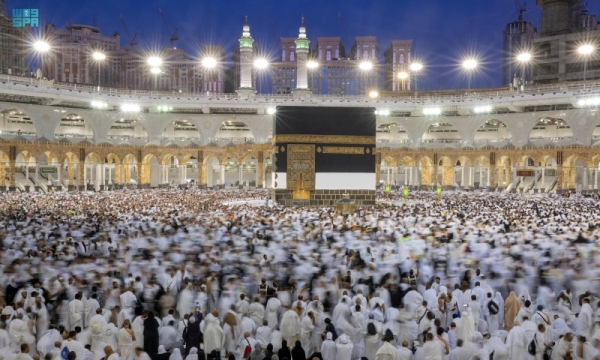
HEADING TO MAKKAH
It states in the Hadeeth of Jaabir (radiallahu anhu):
ثُمَّ رَكِبَ رَسُولُ اللّهِ فَأَفَاضَ إِلَى الْبَيْتِ. فَصَلَّى بِمَكَّةَ الظُّهْرَ. فَأَتَى بَنِي عَبْدِ الْمُطَّلِبِ يَسْقُونَ عَلَى زَمْزَمَ. فَقَالَ: انْزِعُوا. بَنِي عَبْدِ الْمُطَّلِبِ فَلَوْلاَ أَنْ يَغْلِبَكُمْ النَّاسُ عَلَى سِقَايَتِكُمْ لَنَزَعْتُ مَعَكُمْ. فَنَاوَلُوهُ دَلْواً فَشَرِبَ مِنْهُ
The Messenger of Allah (sallahu alaihi wasallam) again rode and came to the House, and offered the Dhuhr prayer at Makkah. He came to the tribe of Abdul-Muttalib, who were supplying water at Zam zam, and said: Draw water. O Bani Abdil-Muttalib; were it not that people would usurp this right of supplying water from you, I would have drawn it along with you. So they handed him a basket and he drank from it. [Sahih Muslim, Hadeeth No. 2803]
Here’s what one needs to do in Makkah:
1. Do Tawaf Al-Ifaadhah
This is the tawaf of Hajj and is also called the Tawaf of Az-Ziyarah (Tawaf of visiting).
ثُمَّ لْيَقْضُوا تَفَثَهُمْ وَلْيُوفُوا نُذُورَهُمْ وَلْيَطَّوَّفُوا بِالْبَيْتِ الْعَتِيقِ
Then let them complete the prescribed duties (Manasik of Hajj) for them, and perform their vows, and circumambulate the Ancient House (the Kabah at Makkah). [Surah Al-Hajj (22): 29]
عَنْ أَبِي سَلَمَةَ، وَعُرْوَةَ، أَنَّ عَائِشَةَ، قَالَتْ حَاضَتْ صَفِيَّةُ بِنْتُ حُيَىٍّ بَعْدَ مَا أَفَاضَتْ – قَالَتْ عَائِشَةُ – فَذَكَرْتُ حِيضَتَهَا لِرَسُولِ اللَّهِ صلى الله عليه وسلم فَقَالَ رَسُولُ اللَّهِ صلى الله عليه وسلم : أَحَابِسَتُنَا هِيَ . قَالَتْ فَقُلْتُ يَا رَسُولَ اللَّهِ إِنَّهَا قَدْ كَانَتْ أَفَاضَتْ وَطَافَتْ بِالْبَيْتِ ثُمَّ حَاضَتْ بَعْدَ الإِفَاضَةِ . فَقَالَ رَسُولُ اللَّهِ صلى الله عليه وسلم : فَلْتَنْفِرْ
Abu Salamah and Urwah narrated that Aishah (radiallahu anha)) said: Safiyyah bint Huyayy entered the period of menses after performing Tawaf Al-Ifaadah. I made a mention of her menses to Allah’s Messenger (sallallahu alaihi wasallam), whereupon Allah’s Messenger (sallallahu alaihi wasallam) remarked: Well, then she will detain us. I said: Messenger of Allah, she has performed Tawaf Al-Ifaadah and circumambulated the House, and it was after this that she entered the period of menses. Thereupon Allah’s Messenger (sallallahu alaihi wasallam) said: (If it is so), then proceed forth. [Sahih Muslim, Hadeeth No. 3060]
Tawaf was described in detail in Part 7. Please refer to that for more information.
There are a few differences with this tawaf and the tawaf of Umrah, one of them being the intention. Tawaf Al-Ifaadhah is the tawaf of Hajj.
Another difference is that men are not supposed to jog in this tawaf or any other tawaf except for the first one (i.e. Tawaf of Umrah or Tawaf Al-Qudoom).
عَنْ عَبْدِ اللَّهِ بْنِ عَبَّاسٍ، أَنَّ النَّبِيَّ ـ صلى الله عليه وسلم ـ لَمْ يَرْمُلْ فِي السَّبْعِ الَّذِي أَفَاضَ فِيهِ . قَالَ عَطَاءٌ وَلاَ رَمَلَ فِيهِ
It was narrated from Abdullah bin Abbas (radiallahu anhuma) that the Prophet (sallallahu alaihi wasallam) did not walk quickly (Ramal) during the seven circuits of Tawaful-Ifadah (done on 10th day of Dhul-Hijjah).
Ata (one of the narrators) said: “And there is no Ramal (walking quickly) in it.” [Sunan Ibn Majah, Hadeeth No. 3060. Graded “sahih” (authentic) by Al-Albani.]
Also, if a pilgrim is still in his ihram clothes, he is not required to uncover his right shoulder.
Remember, this is the tawaf of Hajj for the person doing Tamattu and Ifrad. However, for the person doing Qiran, this is the tawaf for both Hajj and Umrah.
Remember to pray the 2 rakahs behind Maqam Ibrahim after tawaf, as mentioned in Part 7.
One may drink some Zam-Zam water after this tawaf.
ثُمَّ رَكِبَ رَسُولُ اللّهِ فَأَفَاضَ إِلَى الْبَيْتِ. فَصَلَّى بِمَكَّةَ الظُّهْرَ. فَأَتَى بَنِي عَبْدِ الْمُطَّلِبِ يَسْقُونَ عَلَى زَمْزَمَ. فَقَالَ: انْزِعُوا. بَنِي عَبْدِ الْمُطَّلِبِ فَلَوْلاَ أَنْ يَغْلِبَكُمْ النَّاسُ عَلَى سِقَايَتِكُمْ لَنَزَعْتُ مَعَكُمْ. فَنَاوَلُوهُ دَلْواً فَشَرِبَ مِنْهُ
The Messenger of Allah (sallahu alaihi wasallam) again rode and came to the House, and offered the Dhuhr prayer at Makkah. He came to the tribe of Abdul-Muttalib, who were supplying water at Zam zam, and said: Draw water. O Bani Abdil-Muttalib; were it not that people would usurp this right of supplying water from you, I would have drawn it along with you. So they handed him a basket and he drank from it. [Sahih Muslim, Hadeeth No. 2803]
Now, the menstruating women cannot perform this tawaf. So when is the last time for it? Well, there is a dispute regarding this matter.
A women needs to wait until she is pure before she does tawaf, regardless of when that is. If she has to leave and there is no way to stay back, and she is STILL bleeding, then many scholars have issued fatwas allowing her to do Tawaf Al-Ifaadhah while she is menstruating due to her dire situation.
Please refer to this article for more information. Be sure to consult a person of knowledge before you take this step.
2. Do Saee
Those who are doing Tamattu need to do saee for Hajj after Tawaf Al-Ifaadhah. Those who are doing Qiran or Ifrad and did NOT do saee after Tawaf Al-Qudoom (Arrival Tawaf) need to do saee as well. For those in Qiran, this saee is for Hajj and Umrah.
عَنْ عَائِشَةَ ـ رضى الله عنها ـ: فَطَافَ الَّذِينَ أَهَلُّوا بِالْعُمْرَةِ، ثُمَّ حَلُّوا، ثُمَّ طَافُوا طَوَافًا آخَرَ، بَعْدَ أَنْ رَجَعُوا مِنْ مِنًى، وَأَمَّا الَّذِينَ جَمَعُوا بَيْنَ الْحَجِّ وَالْعُمْرَةِ طَافُوا طَوَافًا وَاحِدًا
Narrated Aishah (radiallahu anhuma): Those who had assumed Ihram for Umrah performed Tawaf (between Safa and Marwah) and then finished their Ihram. And then they performed another Tawaf (between Safa and Marwah) after returning from Mina. And those who had assumed lhram for Hajj and Umrah together (Hajj Qiran) performed only one Tawaf (between Safa and Marwah). [Sahih Al-Bukhari, Volume 2, Hadeeth No. 702. The full narration can be read here.]
Tawaf in the above narration is referring to saee.
عَنْ عَائِشَةَ، – رضى الله عنها – أَنَّهَا حَاضَتْ بِسَرِفَ فَتَطَهَّرَتْ بِعَرَفَةَ فَقَالَ لَهَا رَسُولُ اللَّهِ صلى الله عليه وسلم : يُجْزِئُ عَنْكِ طَوَافُكِ بِالصَّفَا وَالْمَرْوَةِ عَنْ حَجِّكِ وَعُمْرَتِكِ
Aishah (radiallahu anha) reported that she entered in the monthly period at Sarif, and took bath at Arafah (after her menses over). The Messenger of Allah (sallallahu alaihi wasallam) said to her: Your circumambulation between al Safa and al-Marwah is enough for your Hajj and Umrah. [Sahih Muslim, Hadeeth No. 2788]
عَنِ ابْنِ عَبَّاسٍ ـ رضى الله عنهما ـ أَنَّهُ سُئِلَ عَنْ مُتْعَةِ الْحَجِّ، فَقَالَ أَهَلَّ الْمُهَاجِرُونَ وَالأَنْصَارُ وَأَزْوَاجُ النَّبِيِّ صلى الله عليه وسلم فِي حَجَّةِ الْوَدَاعِ وَأَهْلَلْنَا، فَلَمَّا قَدِمْنَا مَكَّةَ قَالَ رَسُولُ اللَّهِ صلى الله عليه وسلم : اجْعَلُوا إِهْلاَلَكُمْ بِالْحَجِّ عُمْرَةً إِلاَّ مَنْ قَلَّدَ الْهَدْىَ . فَطُفْنَا بِالْبَيْتِ وَبِالصَّفَا وَالْمَرْوَةِ وَأَتَيْنَا النِّسَاءَ، وَلَبِسْنَا الثِّيَابَ وَقَالَ : مَنْ قَلَّدَ الْهَدْىَ فَإِنَّهُ لاَ يَحِلُّ لَهُ حَتَّى يَبْلُغَ الْهَدْىُ مَحِلَّهُ . ثُمَّ أَمَرَنَا عَشِيَّةَ التَّرْوِيَةِ أَنْ نُهِلَّ بِالْحَجِّ، فَإِذَا فَرَغْنَا مِنَ الْمَنَاسِكِ جِئْنَا فَطُفْنَا بِالْبَيْتِ وَبِالصَّفَا وَالْمَرْوَةِ فَقَدْ تَمَّ حَجُّنَا، وَعَلَيْنَا الْهَدْىُ
Ibn Abbas (radiallahu anhuma) said that he has been asked regarding Hajj-at-Tamattu on which he said: “The Muhajiroon and the Ansar and the wives of the Prophet (sallallahu alaihi wasallam) and we did the same. When we reached Makkah, Allah’s Messenger (sallallahu alaihi wasallam) said, “Give up your intention of doing the Hajj (at this moment) and perform Umrah, except the one who had garlanded the Hady (sacrificial animal.” So, we performed Tawaf round the Kabah and [Saee] between As-Safa and Al-Marwah, slept with our wives and wore ordinary (stitched) clothes. The Prophet (sallallahu alaihi wasallam) added, “Whoever has garlanded his Hady is not allowed to finish the Ihram till the Hady has reached its destination (has been sacrificed)”. Then on the night of Tarwiyah (8th Dhul Hijjah, in the afternoon) he ordered us to assume Ihram for Hajj and when we have performed all the ceremonies of Hajj, we came and performed Tawaf round the Kabah and (Saee) between As-Safa and Al-Marwah, and then our Hajj was complete, and we had to sacrifice a Hady. [Sahih Al-Bukhari, Volume 2. The statement of Ibn Abbas (radiallahu anhuma) is part of the chapter title and occurs right before Hadeeth No. 643. You can read the full narration here.]
Unlike in Umrah, this saee can be performed before the tawaf. However, there is a disagreement amongst the scholars over this. It is safer to do tawaf before taee. However, the following hadeeth shows that it might be allowed to do saee before tawaf during Hajj (not Umrah).
عَنْ أُسَامَةَ بْنِ شَرِيكٍ، قَالَ خَرَجْتُ مَعَ النَّبِيِّ صلى الله عليه وسلم حَاجًّا فَكَانَ النَّاسُ يَأْتُونَهُ فَمَنْ قَالَ يَا رَسُولَ اللَّهِ سَعَيْتُ قَبْلَ أَنْ أَطُوفَ أَوْ قَدَّمْتُ شَيْئًا أَوْ أَخَّرْتُ شَيْئًا . فَكَانَ يَقُولُ : لاَ حَرَجَ لاَ حَرَجَ إِلاَّ عَلَى رَجُلٍ اقْتَرَضَ عِرْضَ رَجُلٍ مُسْلِمٍ وَهُوَ ظَالِمٌ فَذَلِكَ الَّذِي حَرِجَ وَهَلَكَ
Usamah bin Sharik (radiallahu anhu) said “I went out with the Prophet (sallallahu alaihi wasallam) to perform Hajj, and the people were coming to him. One would say “Messenger of Allah! I performed Saee before Tawaf or I did something before the its proper time or did something after its proper time. He would reply “No harm will come; no harm will come except to one who defames a Muslim acting wrongfully. That is the one who will be in trouble and will perish. [Sunan Abee Dawood, Hadeeth No. 2015. Graded “sahih” (authentic) by Al-Albani.]
وأمَّا رميُك الجمارَ فلك بكلِّ حصاةٍ رميْتَها تُكفِّرُ كبيرةً من الموبقاتِ وأمَّا نحرُك فمذخورٌ لك عند ربِّك وأمَّا حِلاقُك رأسَك فلك بكلِّ شعرةٍ حلقتَها حسنةٌ ويُمحَى عنك بها خطيئةٌ وأمَّا طوافُك بالبيتِ بعد ذلك فإنَّك تطوفُ ولا ذنبَ لك ويأتي ملَكٌ حتَّى يضعَ يدَيْه بين كتِفَيْك فيقولُ اعملْ فيما تستقبِلُ فقد غُفِر لك ما مضَى
As for stoning the Jamaar (the pillars), then for every stone that you throw, it removes a big sin from the deadly sins. As for your slaughtering, then it is saved for you with your Lord. As for shaving your head, then there is a reward for every strand of hair that you shaved, and a sin is wiped off by it.
As for you performing Tawaaf of the House after all this, then by this time your are performing Tawaaf with no sin upon you and an Angel comes and places his hand between your shoulders saying: “Perform good deeds in what you face of the future for verily your past sins have been forgiven.” [Sahih At-Targheeb Wat-Tarheeb, Hadeeth No. 1112]
3. Complete the second stage of exiting ihram
Now that one has performed tawaf and saee, one has finished all the acts for this day. They may now fully exit ihram, meaning they can do everything that was forbidden to do in ihram, including sexual intercourse.
It is very important to remember that after the FIRST stage of exiting ihram, sexual intercourse with one’s spouses is STILL forbidden. It is only after the SECOND stage of exiting ihram that it becomes lawful again (the way it was before assuming ihram).
The menstruating woman cannot exit ihram without having done Tawaf Al-Ifaadhah. During menstruation, she is allowed to do all the acts except tawaf. So if she had not done tawaf, she needs to wait until she is pure then do ghusl (full bathing) and then do tawaf. After this, she may exit ihram completely.
What about saee? Well, menstruating women are allowed to do saee. The condition of saee during Umrah is that it is preceded by tawaf so if she did tawaf then started bleeding, she can go ahead and do saee (by entering from a gate that does not require her to go inside the masjid). If she started to bleed before tawaf, she needs to wait until she is pure and then do both tawaf and saee.
During Hajj, she can do saee even if she has not done tawaf yet, as mentioned above.
4. Head to Mina and spend the night there
The Prophet (sallallahu alaihi wasallam) headed back to Mina after finishing Tawaf (he was doing Qiran so he already finished his only saee after his arrival Tawaf) and prayed Dhuhr in Makkah.
ثُمَّ رَكِبَ رَسُولُ اللّهِ فَأَفَاضَ إِلَى الْبَيْتِ. فَصَلَّى بِمَكَّةَ الظُّهْرَ. فَأَتَى بَنِي عَبْدِ الْمُطَّلِبِ يَسْقُونَ عَلَى زَمْزَمَ. فَقَالَ: انْزِعُوا. بَنِي عَبْدِ الْمُطَّلِبِ فَلَوْلاَ أَنْ يَغْلِبَكُمْ النَّاسُ عَلَى سِقَايَتِكُمْ لَنَزَعْتُ مَعَكُمْ. فَنَاوَلُوهُ دَلْواً فَشَرِبَ مِنْهُ
The Messenger of Allah (sallahu alaihi wasallam) again rode and came to the House, and offered the Dhuhr prayer at Makkah. [Sahih Muslim, Hadeeth No. 2803]
According to another narration though, he prayed Dhuhr in Mina.
عَنِ ابْنِ عُمَرَ، أَنَّ رَسُولَ اللَّهِ صلى الله عليه وسلم أَفَاضَ يَوْمَ النَّحْرِ ثُمَّ رَجَعَ فَصَلَّى الظُّهْرَ بِمِنًى
Ibn Umar (radiallahu anhuma) reported that Allah’s Messenger (sallallahu alaihi wasallam) observed the circumambulation of Ifaadah on the Day of Nahr (10th of Dhul-Hijjah), and then came back and observed the noon prayer at Mina. [Sahih Muslim, Hadeeth No. 3004]
Shaikh Saeed Al-Qahtani explains in his book “Manasik Al-Hajj wal-Umrah” that it seems the Prophet (sallallahi alaihi wasallam) prayed Dhuhr in Makkah then returned to Mina and led his Companions in prayer again. So the second Dhuhr was a voluntary prayer for him and the first was the obligatory prayer.
Either way, one is obliged to head to Mina as it is obligatory to spend the night there. As mentioned in Part 9, please make sure you are within the limits of Mina, and not in Azeeziyah.
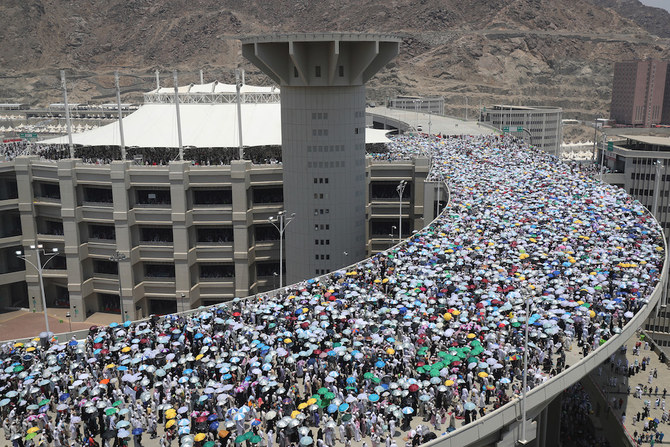
THE VIRTUES OF THE 11TH TO 13TH OF DHUL HIJJAH
The 11th, 12th and 13th of Dhul Hijjah are called the Days of Tashreeq.
Shaikh Ibn Uthaimeen states:
“The days of al-Tashreeq are the three days after Eid al-Adha. They are called the days of al-Tashreeq because the people used to dry (yusharriqoon) the meat in the sun so that it would not turn rotten when they stored it.”
The 11th Day is called Yawm Al-Qarr (the Day of Resting). The 12th is called Yawm An-Nafar Al-Ulaa (the first day of leaving) and the 13th is called Yawm An-Nafar Ath-Thaanee (the second day of leaving).
These three days have been mentioned in the Quran.
وَاذْكُرُوا اللَّـهَ فِي أَيَّامٍ مَّعْدُودَاتٍ
And remember Allah during the appointed Days. [Surah Al-Baqarah (2) : 203]
Imam Ibn Kathir says in his explanation of Surah Al-Baqarah, Verse 203:
“Ibn Abbas said, “The Appointed Days are the Days of Tashreeq (11-12-13th of Dhul-Hijjah) while the Known Days are the (first) ten (days of Dhul-Hijjah).””
One of the ways for the Hajj pilgrim to remember Allah on these days is by stoning the pillars. Here are some other ways to remember Allah on these three days.
The 11th of Dhul Hijjah is one of the greatest days in the sight of Allah.
عَنْ عَبْدِ اللَّهِ بْنِ قُرْطٍ، عَنِ النَّبِيِّ صلى الله عليه وسلم قَالَ : إِنَّ أَعْظَمَ الأَيَّامِ عِنْدَ اللَّهِ تَبَارَكَ وَتَعَالَى يَوْمُ النَّحْرِ ثُمَّ يَوْمُ الْقَرِّ . قَالَ عِيسَى قَالَ ثَوْرٌ وَهُوَ الْيَوْمُ الثَّانِي . قَالَ وَقُرِّبَ لِرَسُولِ اللَّهِ صلى الله عليه وسلم بَدَنَاتٌ خَمْسٌ أَوْ سِتٌّ فَطَفِقْنَ يَزْدَلِفْنَ إِلَيْهِ بِأَيَّتِهِنَّ يَبْدَأُ فَلَمَّا وَجَبَتْ جُنُوبُهَا – قَالَ فَتَكَلَّمَ بِكَلِمَةٍ خَفِيَّةٍ لَمْ أَفْهَمْهَا فَقُلْتُ مَا قَالَ – قَالَ : مَنْ شَاءَ اقْتَطَعَ
Narrated Abdullah ibn Qurt (radiallahu anu): The Prophet (sallallahu alaihi wasallam) said: “The greatest day in Allah’s sight is the day of sacrifice and next the day of resting”, which Isa said on the authority of Thawr is the second day. Five or six sacrificial camels were brought to the Messenger of Allah (sallallahu alaihi wasallam) and they began to draw near to see which he would sacrifice first. When they fell down dead, he said something in a low voice, which I could not catch. So I asked: What did he say? He was told that he had said: Anyone who wants can cut off a piece. [Sunan Abee Dawood, Hadeeth No. 1765. Graded “sahih” (authentic) by Al-Albani.]
[Yawm An-Nahr (the Day of Sacrifice) is the 10th of Dhul Hijjah i.e. Eid Al-Adha, and Yawn Al-Qarr (the Day of Resting) is the 11th of Dhul Hijjah.]
These three days are the days of remembering Allah, eating and drinking.
عن نبيشة قال قال رسول الله صلى الله عليه وسلم: أيامُ التشريقِ أيامُ أكْلٍ ، وشُرْبٍ ، وذِكْرِ اللهِ
Nubaishah (radiallahu anhu) said that Allah’s Messenger (sallallahu alaihi wasallam) said: “The days of Tashreeq are days of eating, drinking and Dhikr (remembering) of Allah.” [Sahih Al-Jaami, Hadeeth No. 2689]
They are an Eid.
عن عُقْبَة بْنَ عَامِرٍ، قَالَ قَالَ رَسُولُ اللَّهِ صلى الله عليه وسلم :يَوْمُ عَرَفَةَ وَيَوْمُ النَّحْرِ وَأَيَّامُ التَّشْرِيقِ عِيدُنَا أَهْلَ الإِسْلاَمِ وَهِيَ أَيَّامُ أَكْلٍ وَشُرْبٍ
Narrated Uqbah ibn Amir (radiallahu anhu): The Prophet (sallallahu alaihi wasallam) said: The Day of Arafah, the Day of Sacrifice, the Days of Tashreeq are (the days of) our Eid, the people of Islam and they are the days of eating and drinking. [Sunan Abee Dawood, Hadeeth No. 2419. Graded “sahih” (authentic) by Al-Albani.]
Fasting on the Days of Tashreeq (i.e. the 11th, 12th and 13th of Dhul Hijjah) is prohibited.
عن حمزة بن عمرو الأسلمي و بديل بن ورقاء :عَنِ النَّبِيِّ صلى الله عليه وسلم أَنَّهُ قَال: لا تصوموا هذه الأيامَ أيامَ التشريقِ ، فإنها أيامُ أَكْلٍ وشُرْبٍ
Hamza ibn Amr Al-Aslami and Badeel ibn Warqaa (radiallahu anhuma) narrated that the Prophet (sallallahu alaihi wasallam): “Do not fast on these days, the Days of Tashreeq, for they are the days of eating and drinking.” [Sahih Al-Jaami, Hadeeth No. 7355]
Many people fast the “white days” of every month i.e. the 13th, 14th and 15th. In Dhul Hujjah, one should remember that fasting on the 13th is prohibited.
The only exception is for those who are doing Hajj At-Tamattu or Qiran and do not have a sacrificial animal with them. They are allowed to fast on these three days.
عَنِ ابْنِ عُمَرَ ـ رضى الله عنهما ـ قَالَ الصِّيَامُ لِمَنْ تَمَتَّعَ بِالْعُمْرَةِ إِلَى الْحَجِّ، إِلَى يَوْمِ عَرَفَةَ، فَإِنْ لَمْ يَجِدْ هَدْيًا وَلَمْ يَصُمْ صَامَ أَيَّامَ مِنًى
Narrated Ibn Umar (radiallahu anhuma): Fasting for those who perform Hajj-at-Tamattu (in lieu of the Hadi which they cannot afford) may be performed up to the day of Arafah. And if one does not get a Hadi and has not fasted (before the Eid) then one should fast of the days of Mina. (11, 12 and 13th of Dhul Hijjah). [Sahih Al-Bukhari, Volume 3, Hadeeth No. 217]

STAYING IN MINA FROM 11TH TO 13TH
One has to stay in Mina for 2 days (11th and 12th) whereas staying on the 13th day is preferable, but not obligatory.
وَاذْكُرُوا اللَّهَ فِي أَيَّامٍ مَّعْدُودَاتٍ ۚ فَمَن تَعَجَّلَ فِي يَوْمَيْنِ فَلَا إِثْمَ عَلَيْهِ وَمَن تَأَخَّرَ فَلَا إِثْمَ عَلَيْهِ ۚ لِمَنِ اتَّقَىٰ ۗ وَاتَّقُوا اللَّهَ وَاعْلَمُوا أَنَّكُمْ إِلَيْهِ تُحْشَرُونَ
And remember Allah during the appointed Days. But whosoever hastens to leave in two days, there is no sin on him and whosoever stays on, there is no sin on him, if his aim is to do good and obey Allah (fear Him), and know that you will surely be gathered unto Him. [Surah Al-Baqarah (2) : 203]
The Prophet (sallallahu alaihi wasallam) stayed in Mina for three days and stoned all three pillars on each day.
عَنْ عَائِشَةَ، قَالَتْ أَفَاضَ رَسُولُ اللَّهِ صلى الله عليه وسلم مِنْ آخِرِ يَوْمِهِ حِينَ صَلَّى الظُّهْرَ ثُمَّ رَجَعَ إِلَى مِنًى فَمَكَثَ بِهَا لَيَالِيَ أَيَّامِ التَّشْرِيقِ يَرْمِي الْجَمْرَةَ إِذَا زَالَتِ الشَّمْسُ كُلَّ جَمْرَةٍ بِسَبْعِ حَصَيَاتٍ يُكَبِّرُ مَعَ كُلِّ حَصَاةٍ وَيَقِفُ عِنْدَ الأُولَى وَالثَّانِيَةِ فَيُطِيلُ الْقِيَامَ وَيَتَضَرَّعُ وَيَرْمِي الثَّالِثَةَ وَلاَ يَقِفُ عِنْدَهَا
Narrated Aishah (radiallahu anha): The Messenger of Allah (sallallahu alaihi wasallam) performed the obligatory circumambulation of the Kabah at the end of the day of sacrifice after he had offered the noon prayer. He hen returned to Mina and stayed there during the tashreeq days and he threw pebbles at the jamrahs when the sun declined. He threw seven pebbles at each of the jamrahs, uttering the takbir (Allah is most great) at the time of the throwing the pebble. He stood at the first and the second jamrah, and prolonged his standing there, making supplications with humiliation. He threw pebbles at the third jamrah but did not stand there. [Sunan Abee Dawood, Hadeeth No. 1973. Al-Albani said that it was “sahih” (authentic) except for the words “whereupon he offered the noon prayer” which are “munkar” (odd).]
Remember that you need to take 21 pebbles with you on each of these three days.
One needs to shorten all the 4 rakah prayers to 2 rakahs in Mina and pray them at their appointed times (i.e. one should not combine them).
Here’s what one needs to do on these three days:
1. On the 11th day, walk to the Jamraat (pillars) and stone each pillar in order
عن عائشة قالت: قال رسول الله صلى الله عليه وسلّم: إنما جعل الطواف بالبيت وبين الصفا والمروة ورمى الجمار لإقامة ذكر الله
The Prophet (sallallahu alaihi wasallam) said, “The Tawaaf of the House and between As-Safa and Al-Marwah (i.e. Saee) and stoning the Jimaar are only done for the establishment of Allah’s remembrance.” [Sahih Ibn Khuzaimah, Hadeeth No. 2882. Graded “sahih” (authentic) by Mustafa Azami.]
قلتُ: ويزعُمُ قومُكَ أنَّ رسولَ اللهِ صلَّى اللهُ عليه وسلَّمَ سعَى بينَ الصفا والمروةِ، وأنَّ ذلك سُنَّةٌ؟ قال: صدَقوا، إنَّ إبراهيمَ لمَّا أُمِر بالمناسِكِ، عرَضَ له الشيطانُ عندَ المَسْعى فسابَقَه، فسبَقَه إبراهيمُ، ثم ذهَب به جِبْريلُ إلى جَمْرةِ العَقَبةِ، فعرَضَ له شيطانٌ -قال يونُسُ: الشيطانُ– فرماه بسبْعِ حَصَياتٍ، حتى ذهَب، ثم عرَضَ له عندَ الجَمْرةِ الوُسْطى، فرماه بسبْعِ حَصَياتٍ، قال: قد تَلَّه للجَبينِ -قال يونُسُ: وثَمَّ تَلَّه للجَبينِ- وعلى إسماعيلَ قميصٌ أبيضُ، وقال: يا أبَتِ، إنَّه ليس لي ثوبٌ تُكفِّنُني فيه غيرُه، فاخلَعْه حتى تُكَفِّنُني فيه، فعالَجَه ليخلَعَه، فنُودِيَ من خلفِه: {أَنْ يَا إِبْرَاهِيمُ قَدْ صَدَّقْتَ الرُّؤْيَا} [الصافات: 105] فالتفَتَ إبراهيمُ، فإذا هو بكبشٍ أبيضَ، أقرَنَ، أعيَنَ. قال ابنُ عبَّاسٍ: لقد رأيتُنا نتبَعُ ذلك الضَّربَ من الكِباشِ، قال: ثم ذهَب به جِبْريلُ إلى الجَمْرةِ القُصْوى، فعرَضَ له الشيطانُ، فرماه بسبْعِ حَصَياتٍ؛ حتى ذهَب، ثم ذهَب به جِبْريلُ إلى مِنًى، قال: هذا مِنًى -قال يونُسُ: هذا مُناخُ الناسِ- ثم أتى به جَمْعًا، فقال: هذا المَشعَرُ الحرامُ، ثم ذهَب به إلى عَرَفةَ، فقال ابنُ عبَّاسٍ: هل تدري لِمَ سُمِّيتْ عَرَفةَ؟ قلتُ: لا. قال: إنَّ جِبْريلَ قال لإبراهيمَ: عرَفتَ -قال يونُسُ: هل عرَفتَ؟- قال: نعَمْ. قال ابنُ عبَّاسٍ: فمِن ثَمَّ سُمِّيتْ عَرَفةَ، ثم قال: هل تدري كيفَ كانَتِ التَّلْبيةُ؟ قلتُ: وكيفَ كانت؟ قال: إنَّ إبراهيمَ لما أُمِر أنْ يُؤذِّنَ في الناسِ بالحَجِّ، خفَضتْ له الجبالُ رؤوسَها، ورُفِعتْ له القُرَى، فأذَّنَ في الناسِ بالحَجِّ
أَن يَا إِبْرَاهِيمُ
قَدْ صَدَّقْتَ الرُّؤْيَا
This is what the Jamraat (pillars) used to look like in the past.
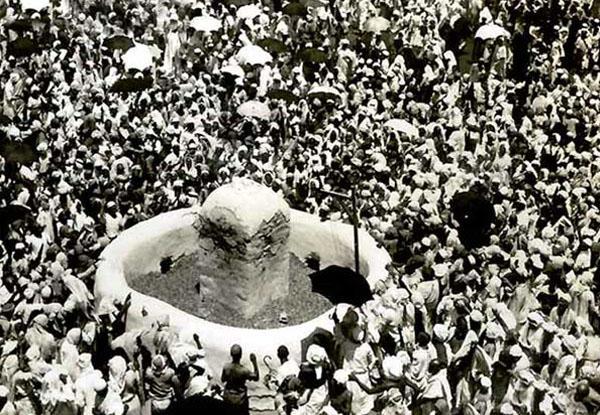
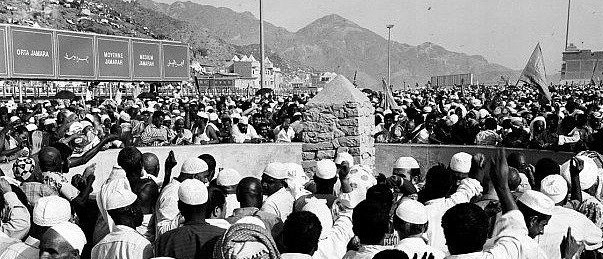
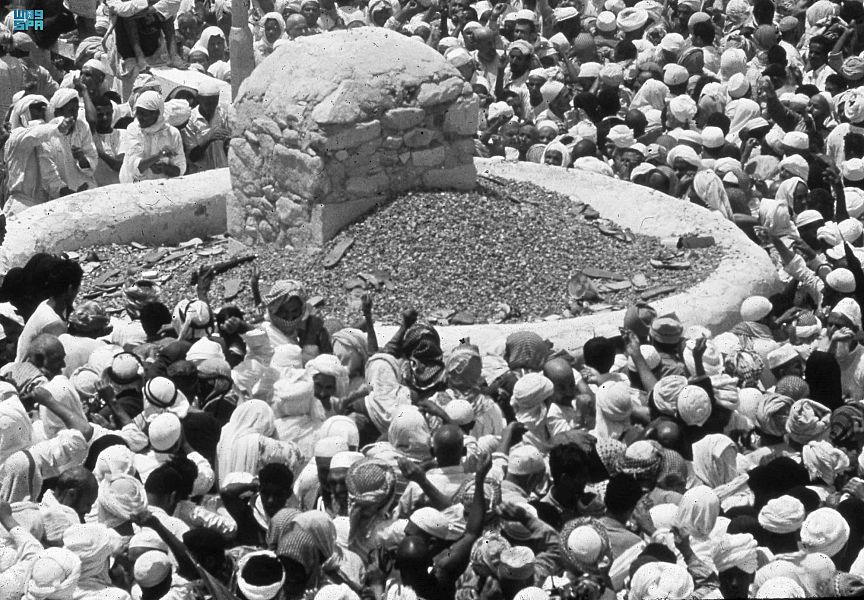
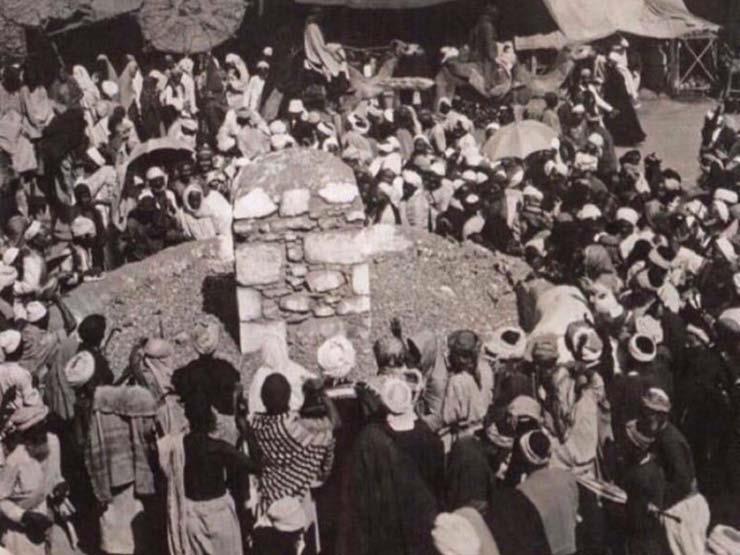
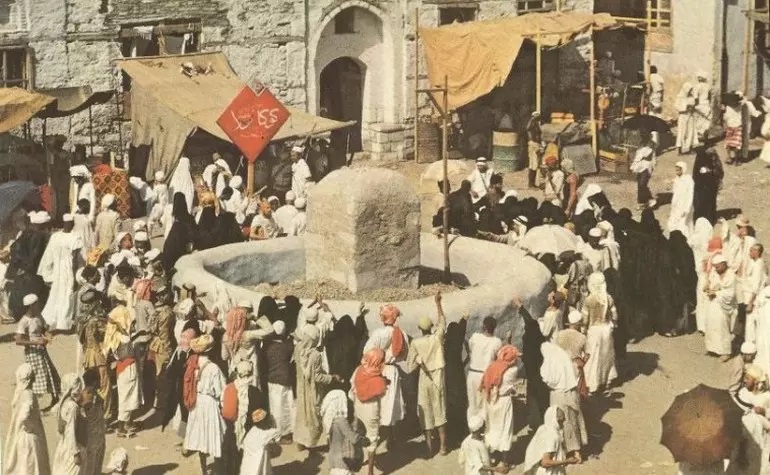
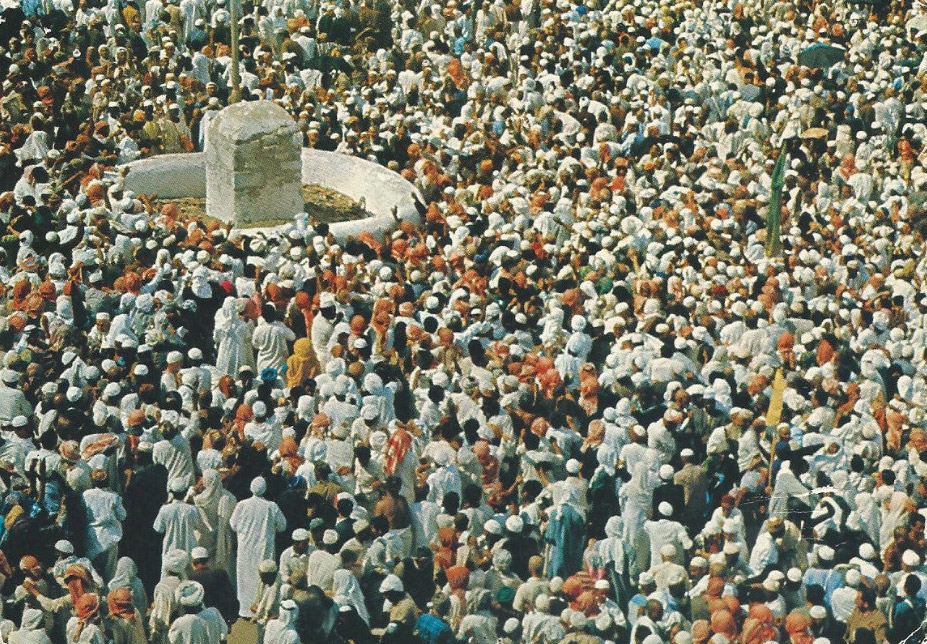
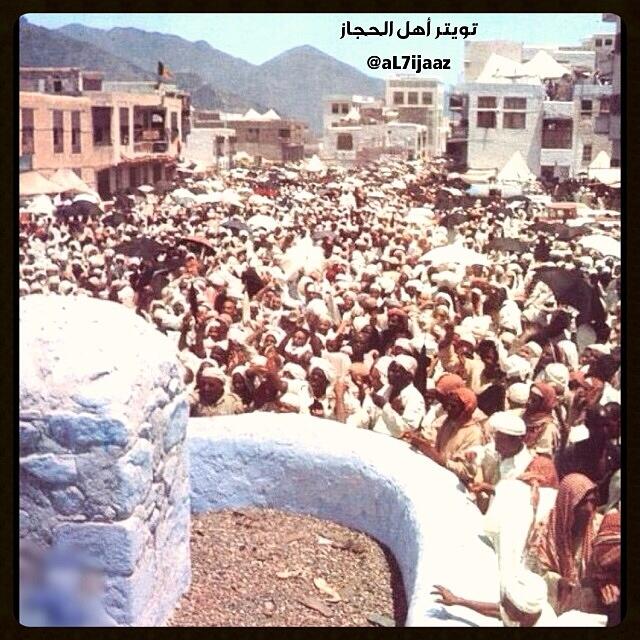
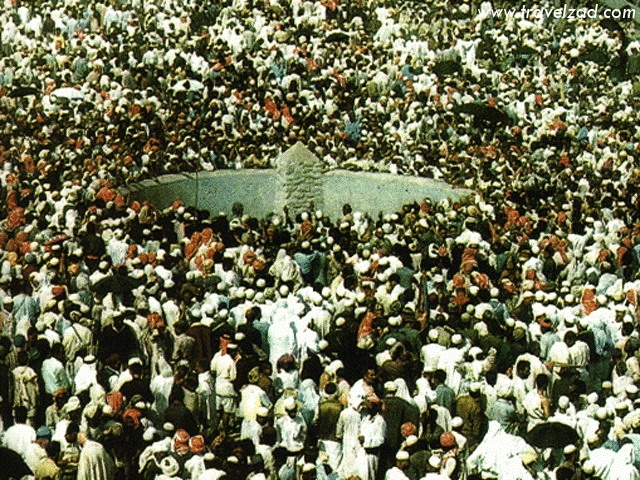
#فيديو الدارة |📺
مشعر #الجمرات يبدو في هذا التوثيقي القصير بين البيوت المكية يؤدى إليه شارع ضيق غير معبد مغبر
سبحان الله العظيم الذي أنعم على بلادنا فأصبح رميها بواسطة (٦) طوابق مع تطور الفكر الإدارى الإسلامي#دارة_الملك_عبدالعزيز تدعوكم للتأمل في تفاصيل المشهد#ايام_التشريق pic.twitter.com/axcuX1EdvI— دارة الملك عبدالعزيز (@Darahfoundation) August 12, 2019
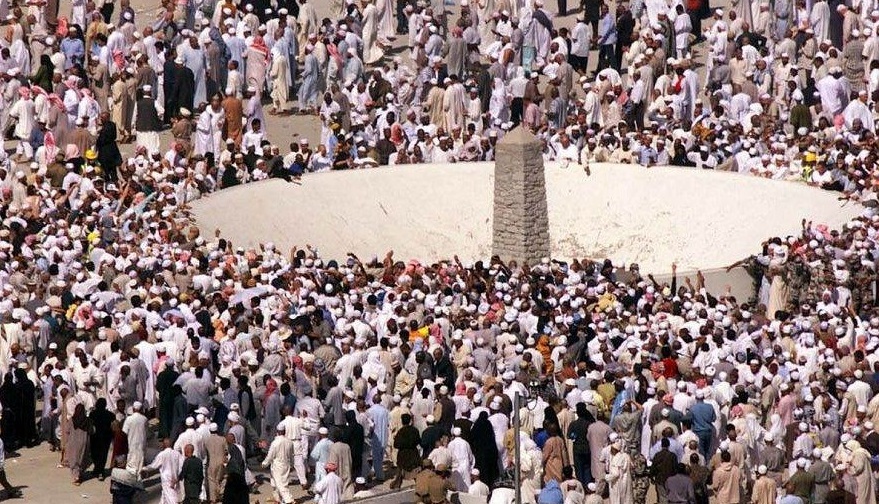
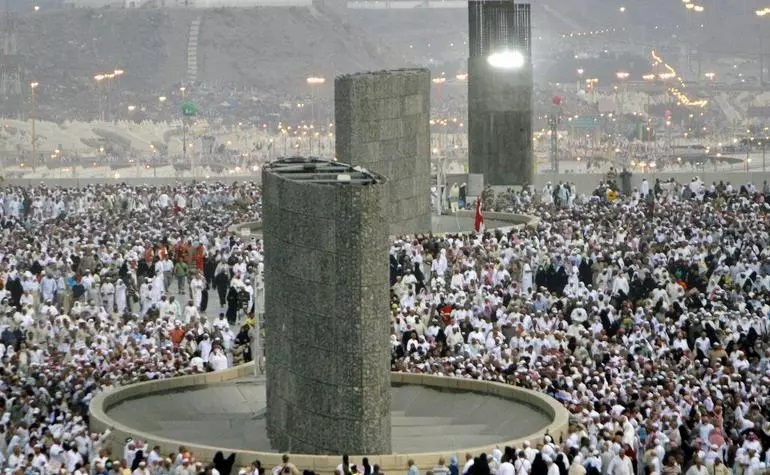
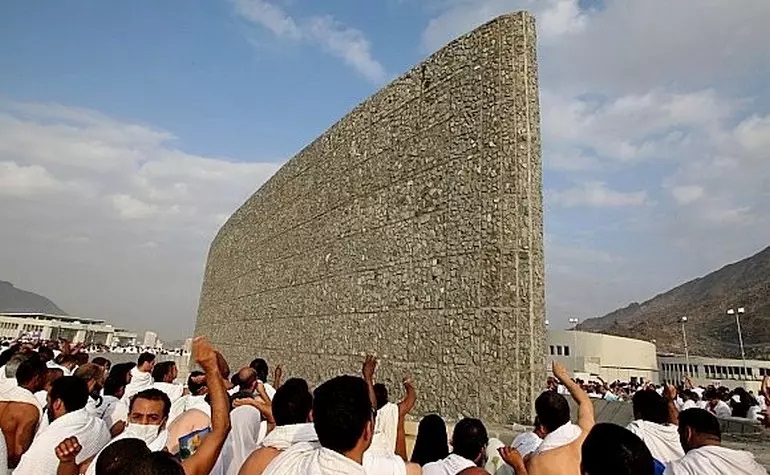
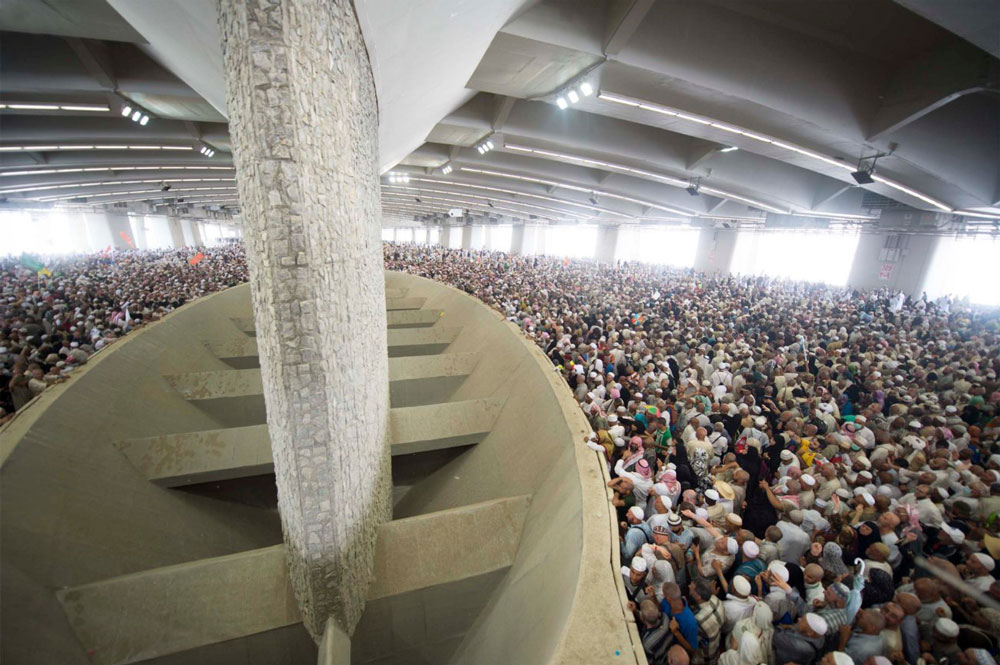
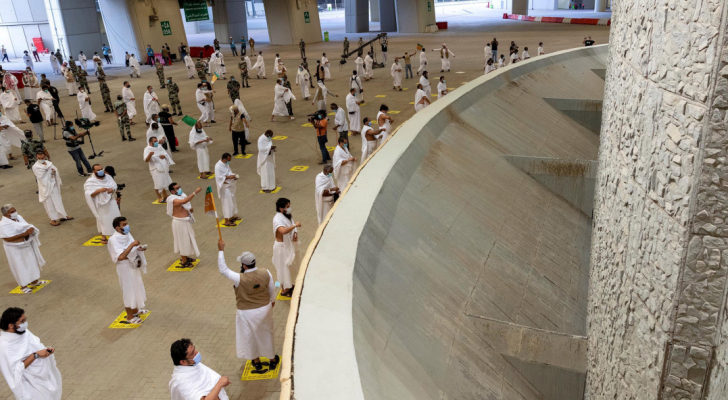
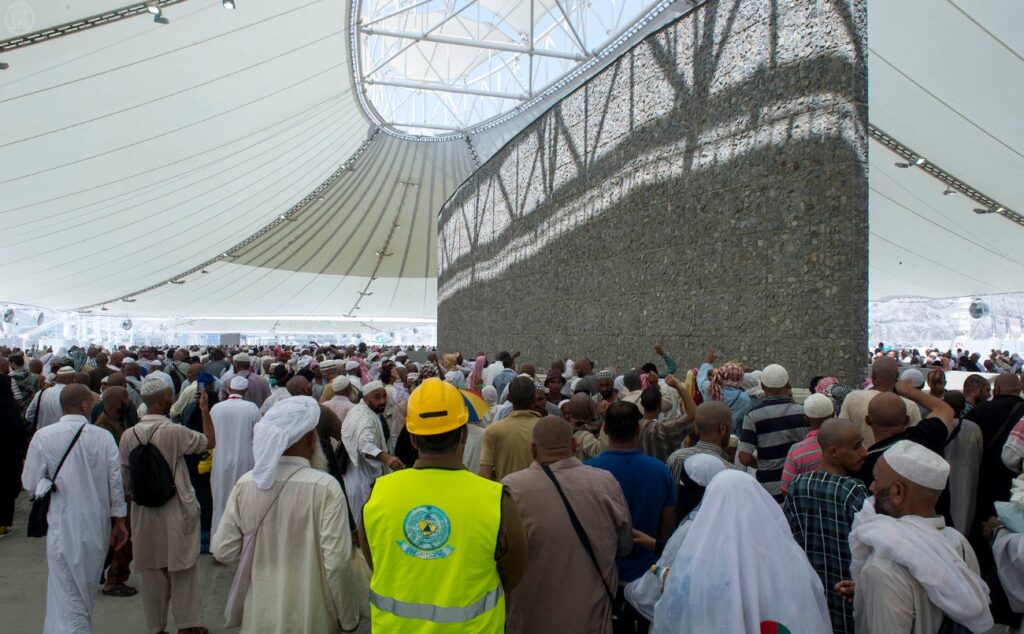
Here’s what the Jamraat bridge looks like. It has multiple floors now to avoid congestion.
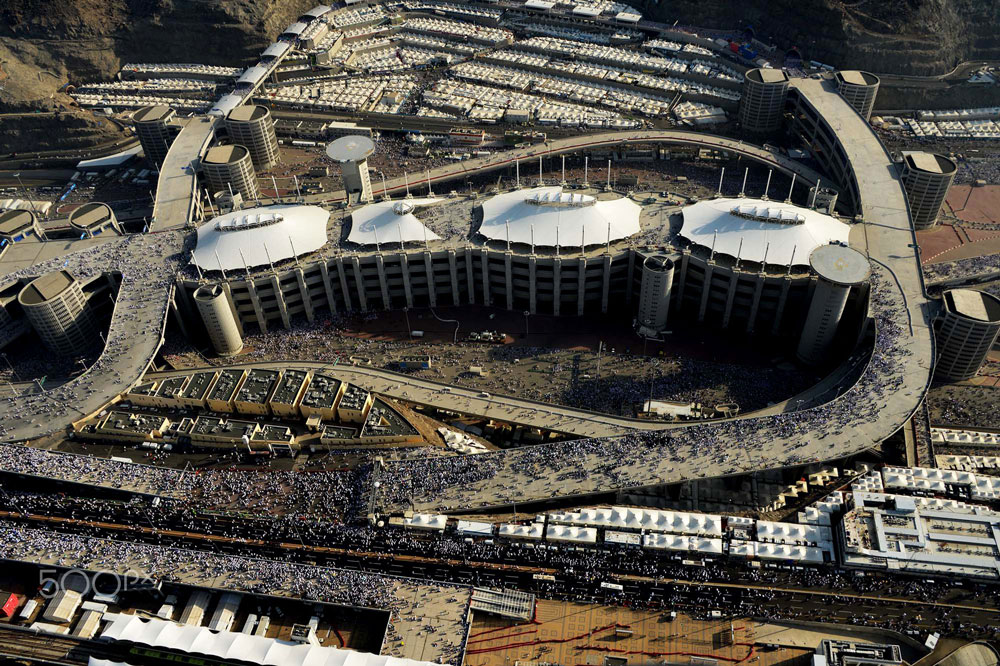
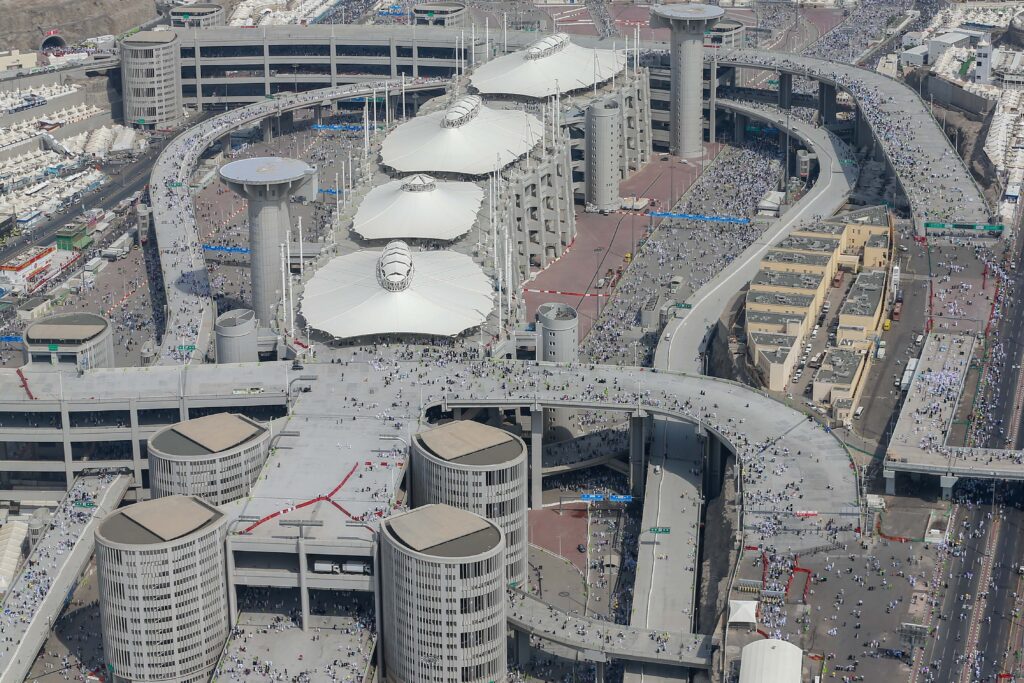
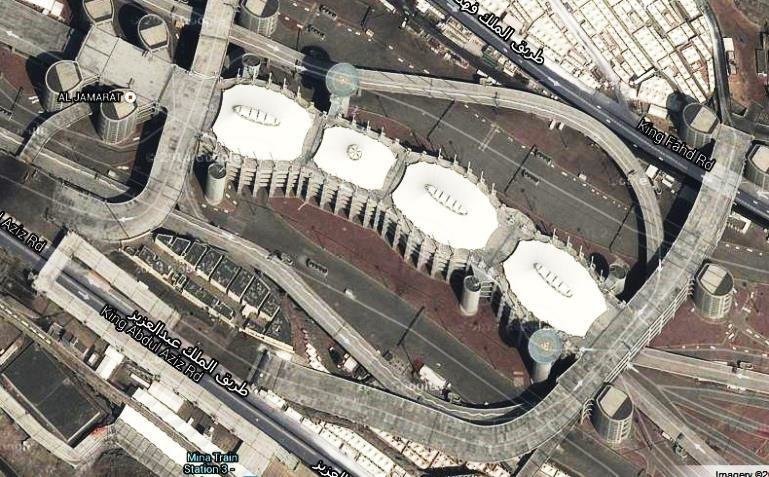
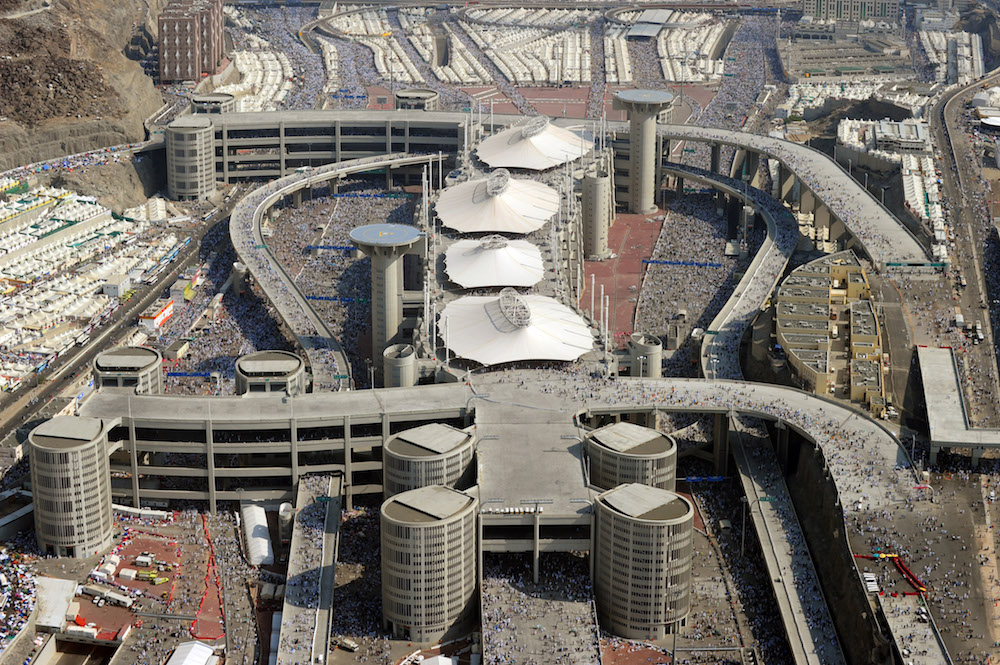

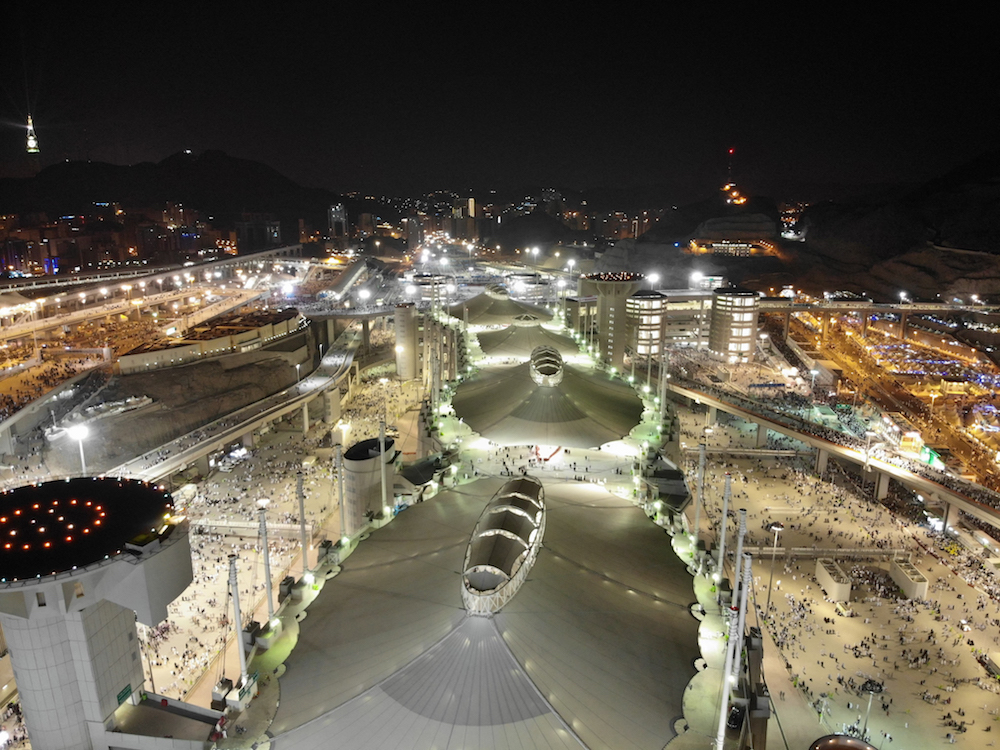
The Prophet (sallallahu alaihi wasallam) walked to and from the Jimar (pillars).
عَنِ ابْنِ عُمَرَ، أَنَّ النَّبِيَّ صلى الله عليه وسلم كَانَ إِذَا رَمَى الْجِمَارَ مَشَى إِلَيْهَا ذَاهِبًا وَرَاجِعًا
Here’s a look at the pilgrims walking to and from the pillars.
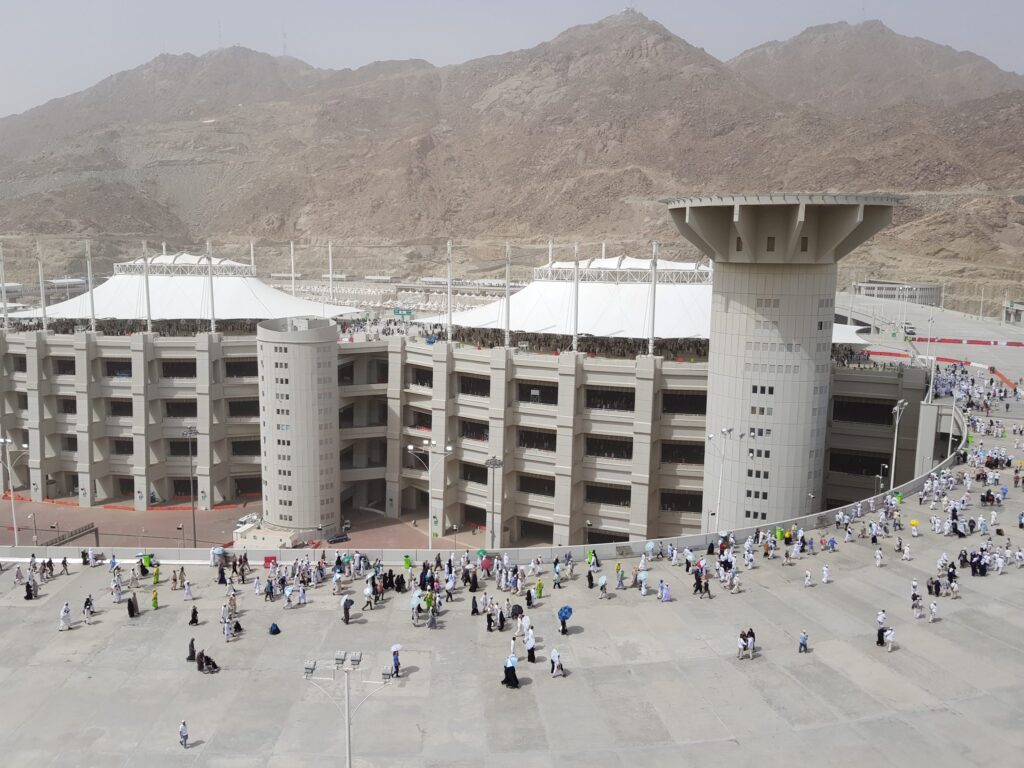

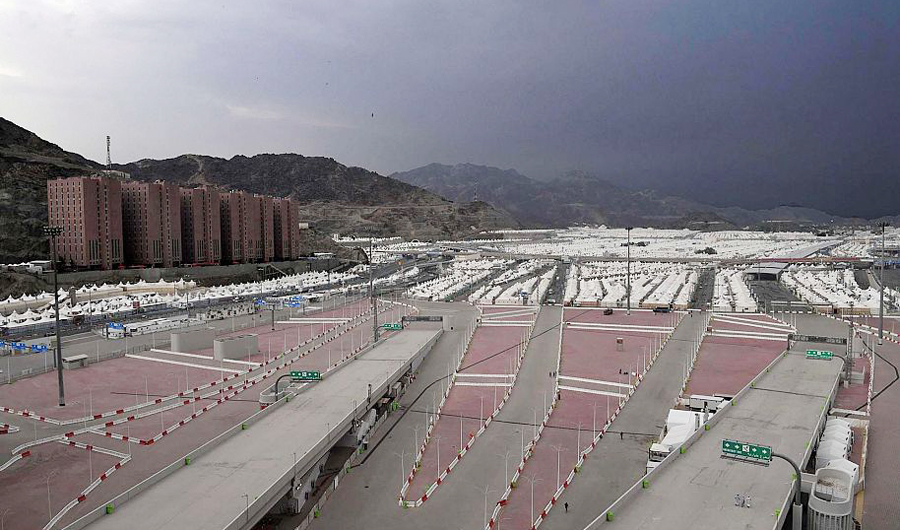
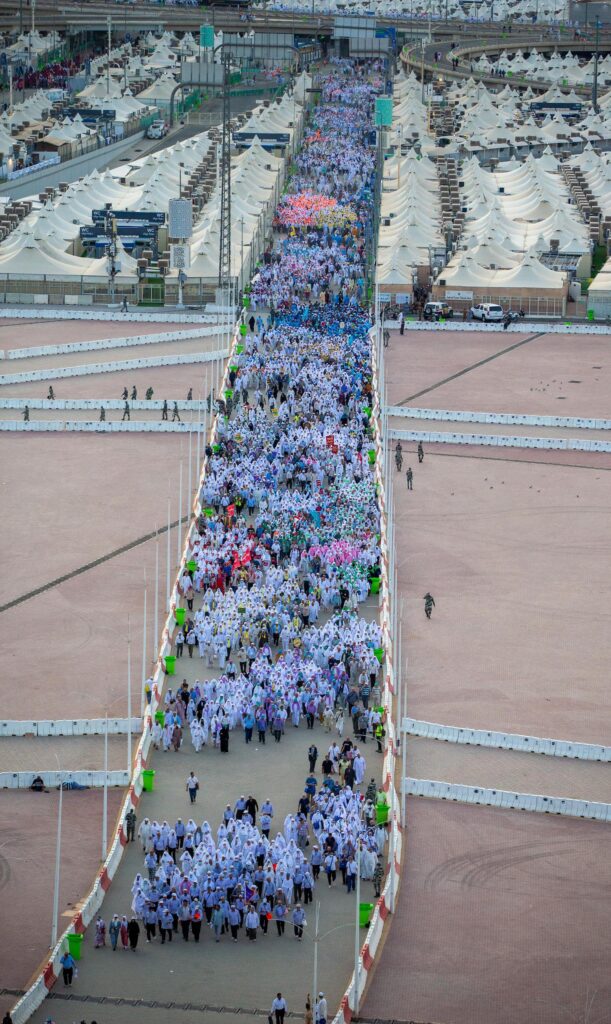
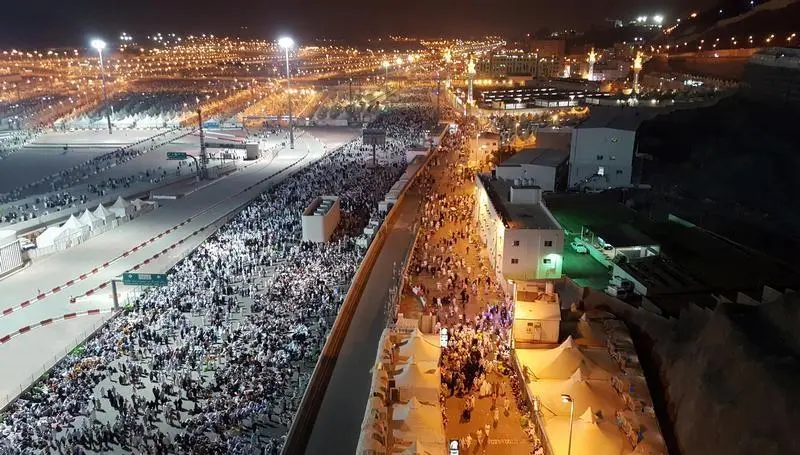
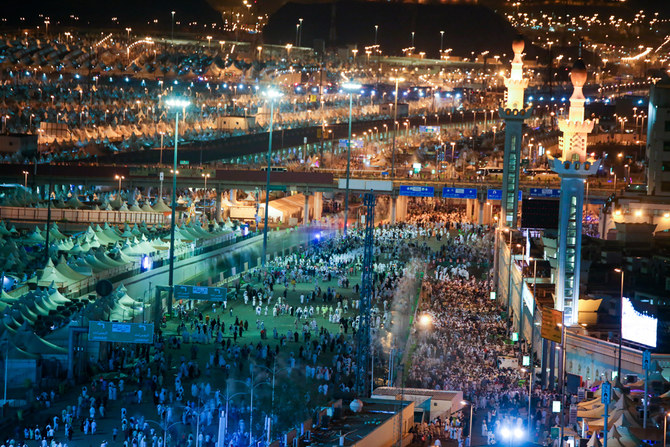
On the Days of Tashreeq, the time for stoning is after zawwal (when the sun has passed its zenith) until sunset. Zawwal is the time preceding Dhuhr – the ten minutes before it, according to Shaikh Ibn Uthaimeen. So after zawwal is when the time of Dhuhr begins. This is the earliest one can stone on these three days.
عَنْ جَابِرٍ، قَالَ رَمَى رَسُولُ اللَّهِ صلى الله عليه وسلم الْجَمْرَةَ يَوْمَ النَّحْرِ ضُحًى وَرَمَى بَعْدَ يَوْمِ النَّحْرِ إِذَا زَالَتِ الشَّمْسُ
It was narrated that Jabir (radiallahu anhu) said: “The Messenger of Allah (sallallahu alaihi wasallam) stoned the Jamrat on the Day of Sacrifice in the forenoon, and after the Day of Sacrifice he stoned (the Jamarat) when the sun had passed its zenith.” [Sunan An-Nasai, Hadeeth No. 3065. Graded “sahih” (authentic) by Al-Albani.]
عَنِ ابْنِ عَبَّاسٍ، قَالَ كَانَ رَسُولُ اللَّهِ صلى الله عليه وسلم يُسْأَلُ أَيَّامَ مِنًى فَيَقُولُ : لاَ حَرَجَ . فَسَأَلَهُ رَجُلٌ فَقَالَ حَلَقْتُ قَبْلَ أَنْ أَذْبَحَ قَالَ: لاَ حَرَجَ . فَقَالَ رَجُلٌ رَمَيْتُ بَعْدَ مَا أَمْسَيْتُ . قَالَ : لاَ حَرَجَ
عَن عَطَاء، أَخْبَرَنِي مُخْبِرٌ، عَنْ أَسْمَاءَ، أَنَّهَا رَمَتِ الْجَمْرَةَ قُلْتُ إِنَّا رَمَيْنَا الْجَمْرَةَ بِلَيْلٍ . قَالَتْ إِنَّا كُنَّا نَصْنَعُ هَذَا عَلَى عَهْدِ رَسُولِ اللَّهِ صلى الله عليه وسلم
Ata said: Mukhbir reported to me about Asma (radiallahu anha) that she threw pebbles at the jamrah at night. I said: We threw pebbles (at the jamrah) at night. She said: We used to do so in the lifetime of the Messenger of Allah (sallallahu alaihi wasallam). [Sunan Abee Dawood, Hadeeth No. 1943. Graded “sahih” (authentic) by Al-Albani.]
عَنِ الزُّهْرِيِّ، قَالَ بَلَغَنَا أَنَّ رَسُولَ اللَّهِ صلى الله عليه وسلم كَانَ إِذَا رَمَى الْجَمْرَةَ الَّتِي تَلِي الْمَنْحَرَ مَنْحَرَ مِنًى رَمَاهَا بِسَبْعِ حَصَيَاتٍ يُكَبِّرُ كُلَّمَا رَمَى بِحَصَاةٍ ثُمَّ تَقَدَّمَ أَمَامَهَا فَوَقَفَ مُسْتَقْبِلَ الْقِبْلَةِ رَافِعًا يَدَيْهِ يَدْعُو يُطِيلُ الْوُقُوفَ ثُمَّ يَأْتِي الْجَمْرَةَ الثَّانِيَةَ فَيَرْمِيهَا بِسَبْعِ حَصَيَاتٍ يُكَبِّرُ كُلَّمَا رَمَى بِحَصَاةٍ ثُمَّ يَنْحَدِرُ ذَاتَ الشِّمَالِ فَيَقِفُ مُسْتَقْبِلَ الْبَيْتِ رَافِعًا يَدَيْهِ يَدْعُو ثُمَّ يَأْتِي الْجَمْرَةَ الَّتِي عِنْدَ الْعَقَبَةِ فَيَرْمِيهَا بِسَبْعِ حَصَيَاتٍ وَلاَ يَقِفُ عِنْدَهَا . قَالَ الزُّهْرِيُّ سَمِعْتُ سَالِمًا يُحَدِّثُ بِهَذَا عَنْ أَبِيهِ عَنِ النَّبِيِّ صلى الله عليه وسلم وَكَانَ ابْنُ عُمَرَ يَفْعَلُهُ
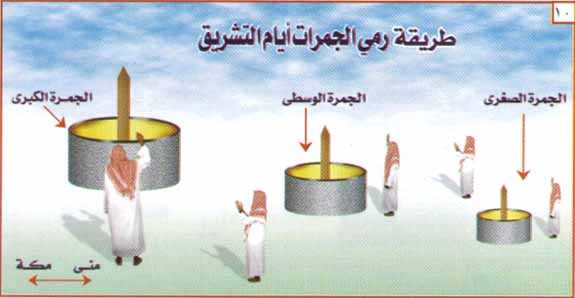

There are times when the Jamraat is extremely crowded and this has lead to deadly stampedes. Try to go at a less congested time.
What if you are throwing on behalf of someone else? Well, you throw your own pebbles at the first pillar, then the second person’s pebbles at the same pillar, then move on to the second pillar. There, you throw for yourself then throw for the other person. Then you move to the third pillar and throw for yourself and the other person.
Please go back to the earlier section to read about delegation and the warning I mentioned there.
Here’s an article on the mistakes that are made when stoning the Jamraat.
2. Remember Allah
These are the days of remembering Allah so make sure you do not waste time,
وَاذْكُرُوا اللَّـهَ فِي أَيَّامٍ مَّعْدُودَاتٍ
And remember Allah during the appointed Days. [Surah Al-Baqarah (2) : 203]
The days of Mina are the last days of Hajj, so one ends Hajj by remembering Allah.
3. Spend the night in Mina
Spending the night in Mina on this day is an obligation. Make sure that you are within the boundaries of Mina. If you spend the night outside the bounds, you have to offer a ransom.
Some groups of people like those who provide water to the pilgrims and those that tend to livestock, are exempt from spending the night at Mina.
عَنِ ابْنِ عُمَرَ، قَالَ اسْتَأْذَنَ الْعَبَّاسُ بْنُ عَبْدِ الْمُطَّلِبِ رَسُولَ اللَّهِ ـ صلى الله عليه وسلم ـ أَنْ يَبِيتَ بِمَكَّةَ أَيَّامَ مِنًى مِنْ أَجْلِ سِقَايَتِهِ فَأَذِنَ لَهُ
It was narrated that Ibn Umar (radiallahu anhuma) said: “Abbas bin Abdul-Muttalib asked the Messenger of Allah (sallallahu alaihi wasallam) for permission to stay overnight in Makkah on the nights of Mina for the purpose of supplying water to the pilgrims, and he gave him permission. [Sunan Ibn Majah, Hadeeth No. 3065. Graded “sahih” (authentic) by Al-Albani.]
عَنْ أَبِي الْبَدَّاحِ بْنِ عَاصِمِ بْنِ عَدِيٍّ، عَنْ أَبِيهِ، أَنَّ رَسُولَ اللَّهِ صلى الله عليه وسلم رَخَّصَ لِلرُّعَاةِ فِي الْبَيْتُوتَةِ يَرْمُونَ يَوْمَ النَّحْرِ وَالْيَوْمَيْنِ اللَّذَيْنِ بَعْدَهُ يَجْمَعُونَهُمَا فِي أَحَدِهِمَا
It was narrated from al-Baddah bin Asim bin Adiyy from his father, that the Messenger of Allah granted a concession to some camel herders, allowing them to not stay overnight in Mina, and allowing them to stone the Jimar on the Day of Sacrifice, then to combine the stoning of two days after sacrifice, so that they could do it on one of the two days. [Sunan An-Nasai, Hadeeth No. 3071. Graded “sahih” (authentic) by Al-Albani.]
However, one needs to refer to a person of knowledge if they require an exemption.
4. Stone each pillar in order on the 12th day
One needs to do exactly what was done on the 11th day. The timing is the exact same as on the 11th day.
5. Remember Allah
Once again, one should not be lazy on this day but rather strive to increase in worship.
The Prophet (sallallahu alaihi wasallam) gave a sermon on this day.
عَنِ ابْنِ أَبِي نَجِيحٍ، عَنْ أَبِيهِ، عَنْ رَجُلَيْنِ، مِنْ بَنِي بَكْرٍ قَالاَ رَأَيْنَا رَسُولَ اللَّهِ صلى الله عليه وسلم يَخْطُبُ بَيْنَ أَوْسَطِ أَيَّامِ التَّشْرِيقِ وَنَحْنُ عِنْدَ رَاحِلَتِهِ وَهِيَ خُطْبَةُ رَسُولِ اللَّهِ صلى الله عليه وسلم الَّتِي خَطَبَ بِمِنًى
Ibn Abu Najih reported from his father on the authority of two men from Banu Bakr who said: We saw the Messenger of Allah (sallallahu alaihi wasallam) addressing (the people) in the middle of the tashreeq days when we were staying near his mount. This is the address of the Messenger of Allah (sallallahu alaihi wasallam) which he gave at Mina. [Sunan Abee Dawood, Hadeeth No. 1952. Graded “sahih” (authentic) by Al-Albani.]
6. Either leave before sunset or spend the night in Mina
If one does not leave before sunset on the 12th night, they are obliged to stay back for the 13th day. Why? Well, the new day starts after sunset which means that they were still in Mina when the 13th day started.
عَنْ نَافِعٍ، أَنَّ عَبْدَ اللَّهِ بْنَ عُمَرَ، كَانَ يَقُولُ مَنْ غَرَبَتْ لَهُ الشَّمْسُ مِنْ أَوْسَطِ أَيَّامِ التَّشْرِيقِ وَهُوَ بِمِنًى فَلاَ يَنْفِرَنَّ حَتَّى يَرْمِيَ الْجِمَارَ مِنَ الْغَدِ
Nafi narrated that Abdullah ibn Umar (radiallahu anhuma) used to say, “Someone who is at Mina when the sun sets in the middle of the days of tashreeq must not leave until he has stoned the jimar on the following day.” [Muwatta Malik, Hadeeth No. 1214. Here’s the online version of it. Saeed Al-Qahtani pointed that Abdul Qadir Al-Arnaut said that its “isnaad” (chain of narrators) was “sahih” (authentic).]
7. If you stay back, stone each pillar in order on the 13th day
The same thing is meant to be done on this day as well except for the fact that the stoning cannot be delayed until the night.
The time for stoning on this day ends at sunset. The one who has not stoned by that time needs to offer a ransom. Please refer to this article for more information.
8. Do the Farwell Tawaf before leaving Makkah
THE FAREWELL TAWAF
This is obligatory for all those who are not residents of Makkah. Even the people of Jeddah should perform this Tawaf.
عَنِ ابْنِ عَبَّاسٍ، قَالَ كَانَ النَّاسُ يَنْصَرِفُونَ فِي كُلِّ وَجْهٍ فَقَالَ رَسُولُ اللَّهِ صلى الله عليه وسلم : لاَ يَنْفِرَنَّ أَحَدٌ حَتَّى يَكُونَ آخِرُ عَهْدِهِ بِالْبَيْتِ
The women who are menstruating at the time of leaving are exempt from doing this tawaf.
عَنِ ابْنِ عَبَّاسٍ ـ رضى الله عنهما ـ قَالَ أُمِرَ النَّاسُ أَنْ يَكُونَ آخِرُ عَهْدِهِمْ بِالْبَيْتِ، إِلاَّ أَنَّهُ خُفِّفَ عَنِ الْحَائِضِ
Narrated Ibn Abbas: The people were ordered to perform the Tawaf of the Kabah (Tawaf-al-Wada) as the last rite, before leaving (Makkah), except the menstruating women who were excused. [Sahih Al-Bukhari, Volume 2, Hadeeth No. 810]
عَنْ عَائِشَةَ ـ رضى الله عنها ـ قَالَتْ أَرَادَ النَّبِيُّ صلى الله عليه وسلم أَنْ يَنْفِرَ فَرَأَى صَفِيَّةَ عَلَى باب خِبَائِهَا كَئِيبَةً حَزِينَةً لأَنَّهَا حَاضَتْ فَقَالَ : عَقْرَى حَلْقَى ـ لُغَةُ قُرَيْشٍ ـ إِنَّكِ لَحَابِسَتُنَا . ثُمَّ قَالَ : أَكُنْتِ أَفَضْتِ يَوْمَ النَّحْرِ . يَعْنِي الطَّوَافَ قَالَتْ نَعَمْ. قَالَ : فَانْفِرِي إِذًا
Narrated Aishah (radiallahu anha): The Prophet (sallallahu alaihi wasallam) intended to return home after the performance of the Hajj, and he saw Safiyah standing at the entrance of her tent, depressed and sad because she got her menses. The Prophet (sallallahu alaihi wasallam) said, “Aqra Halqa! –An expression used in the Quraish dialect–“You will detain us.” The Prophet (sallallahu alaihi wasallam) then asked (her), “Did you perform the Tawaf Al-Ifaadah on the Day of Sacrifice (10th of Dhul-Hijjah)?” She said, “Yes.” The Prophet (sallallahu alaihi wasallam) said, “Then you can leave (with us). [Sahih Al-Bukhari, Volume 8, Hadeeth No. 178]
Aishah (radiallahu anha) had some words of advice regarding this matter.
قَالَ مَالِكٌ قَالَ هِشَامٌ قَالَ عُرْوَةُ قَالَتْ عَائِشَةُ . وَنَحْنُ نَذْكُرُ ذَلِكَ فَلِمَ يُقَدِّمُ النَّاسُ نِسَاءَهُمْ إِنْ كَانَ ذَلِكَ لاَ يَنْفَعُهُنَّ وَلَوْ كَانَ الَّذِي يَقُولُونَ لأَصْبَحَ بِمِنًى أَكْثَرُ مِنْ سِتَّةِ آلاَفِ امْرَأَةٍ حَائِضٍ كُلُّهُنَّ قَدْ أَفَاضَتْ
Malik said that Hisham said that Urwah said that Aishah said, “We have publicized that, so why do people make their women stay on to their inconvenience? If it were as they say, more than six thousand menstruating women would still be in Mina in the morning, all of them having already done the tawaf al- ifaada. “ [Muwatta Malik, Hadeeth No. 1235. You can find the online version here.]
The Farewell Tawaf is the last rite of Hajj. Once it has been completed, the pilgrim can leave for home. Whilst returning, he can take some Zam Zam with him, as the Prophet (sallallahu alaihi wasallam) used to do when he left Makkah.
عَنْ عَائِشَةَ، رضى الله عنها أَنَّهَا كَانَتْ تَحْمِلُ مِنْ مَاءِ زَمْزَمَ وَتُخْبِرُ أَنَّ رَسُولَ اللَّهِ صلى الله عليه وسلم كَانَ يَحْمِلُهُ
Another Umrah?
عَنِ الأَسْوَدِ، قَال قَالَتْ عَائِشَةُ ـ رضى الله عنها ـ يَا رَسُولَ اللَّهِ يَصْدُرُ النَّاسُ بِنُسُكَيْنِ وَأَصْدُرُ بِنُسُكٍ فَقِيلَ لَهَا : انْتَظِرِي، فَإِذَا طَهُرْتِ فَاخْرُجِي إِلَى التَّنْعِيمِ، فَأَهِلِّي ثُمَّ ائْتِينَا بِمَكَانِ كَذَا، وَلَكِنَّهَا عَلَى قَدْرِ نَفَقَتِكِ، أَوْ نَصَبِكِ .
Narrated Al-Aswad: That Aishah (radiallahu anha) said, “O Allah’s Messenger ! The people are returning after performing the two Nusuks (i.e. Hajj and Umrah) but I am returning with one only?” He said, “Wait till you become clean from your menses and then go to at-Tanim, assume Ihram (and after performing Umrah) join us at such and such a place. But it (i.e. the reward if Umrah) is according to your expenses or the hardship (which you will undergo while performing it). [Sahih Al-Bukhari, Volume 3, Hadeeth No. 15]
عَنِ الأَسْوَدِ، عَنْ عَائِشَةَ ـ رضى الله عنها ـ خَرَجْنَا مَعَ النَّبِيِّ صلى الله عليه وسلم وَلاَ نُرَى إِلاَّ أَنَّهُ الْحَجُّ، فَلَمَّا قَدِمْنَا تَطَوَّفْنَا بِالْبَيْتِ، فَأَمَرَ النَّبِيُّ صلى الله عليه وسلم مَنْ لَمْ يَكُنْ سَاقَ الْهَدْىَ أَنْ يَحِلَّ، فَحَلَّ مَنْ لَمْ يَكُنْ سَاقَ الْهَدْىَ، وَنِسَاؤُهُ لَمْ يَسُقْنَ فَأَحْلَلْنَ، قَالَتْ عَائِشَةُ ـ رضى الله عنها ـ فَحِضْتُ فَلَمْ أَطُفْ بِالْبَيْتِ، فَلَمَّا كَانَتْ لَيْلَةُ الْحَصْبَةِ قَالَتْ يَا رَسُولَ اللَّهِ، يَرْجِعُ النَّاسُ بِعُمْرَةٍ وَحَجَّةٍ وَأَرْجِعُ أَنَا بِحَجَّةٍ قَالَ : وَمَا طُفْتِ لَيَالِيَ قَدِمْنَا مَكَّةَ . قُلْتُ لاَ. قَالَ : فَاذْهَبِي مَعَ أَخِيكِ إِلَى التَّنْعِيمِ، فَأَهِلِّي بِعُمْرَةٍ ثُمَّ مَوْعِدُكِ كَذَا وَكَذَا . قَالَتْ صَفِيَّةُ مَا أُرَانِي إِلاَّ حَابِسَتَهُمْ. قَالَ : عَقْرَى حَلْقَى، أَوَمَا طُفْتِ يَوْمَ النَّحْرِ . قَالَتْ قُلْتُ بَلَى. قَالَ : لاَ بَأْسَ، انْفِرِي . قَالَتْ عَائِشَةُ ـ رضى الله عنها ـ فَلَقِيَنِي النَّبِيُّ صلى الله عليه وسلم وَهُوَ مُصْعِدٌ مِنْ مَكَّةَ، وَأَنَا مُنْهَبِطَةٌ عَلَيْهَا، أَوْ أَنَا مُصْعِدَةٌ وَهْوَ مُنْهَبِطٌ مِنْهَا
Narrated Al-Aswad: Aishah (radiallahu anha) said, We went out with the Prophet (sallallahu alaihi wasallam) (from Madinah) with the intention of performing Hajj only and when we reached Makkah we performed Tawaf round the Kabah and then the Prophet (sallallahu alaihi wasallam) ordered those who had not driven the Hadi (sacrificial animal) along with them to finish their Ihram. So the people who had not driven the Hadi along with them finished their Ihram. His wives, too, had not driven the Hadi with them, so they too, finished their Ihram.” Aishah added, “I got my menses and could not perform Tawaf round the Kabah.” So when it was the night of Hasba (i.e. when we stopped at Al-Muhassab), I said, ‘O Allah’s Messenger! Everyone is returning after performing Hajj and Umrah but I am returning after performing Hajj only.’ He said, ‘Didn’t you perform Tawaf round the Kabah the night we reached Makkah?’ I replied in the negative. He said, ‘Go with your brother to Tanim and assume the Ihram for Umrah, (and after performing it) come back to such and such a place.’ On that Safiyah said, ‘I feel that I will detain you all.’ The Prophet (sallallahu alaihi wasallam) said, ‘Aqra Halqa! Didn’t you perform Tawaf of the Kabah on the day of sacrifice? (i.e. Tawaf-al-Ifada) Safiyah replied in the affirmative. He said, (to Safiyah). ‘There is no harm for you to proceed on with us.’ ” Aishah added, “(after returning from Umrah), the Prophet (sallallahu alaihi wasallam) met me while he was ascending (from Makkah) and I was descending to it, or I was ascending and he was descending.” [Sahih Al-Bukhari, Volume 2, Hadeeth No. 632]
It seems the Prophet (sallallahu alaihi wasallam) allowed her to do Umrah after Hajj to remove some misconceptions from the minds of the people. They used to consider doing Umrah during Dhul Hijjah an evil deed.
عَنِ ابْنِ عَبَّاسٍ ـ رضى الله عنهما ـ قَالَ كَانُوا يَرَوْنَ أَنَّ الْعُمْرَةَ فِي أَشْهُرِ الْحَجِّ مِنَ الْفُجُورِ فِي الأَرْضِ، وَكَانُوا يُسَمُّونَ الْمُحَرَّمَ صَفَرًا وَيَقُولُونَ إِذَا بَرَا الدَّبَرْ، وَعَفَا الأَثَرْ، حَلَّتِ الْعُمْرَةُ لِمَنِ اعْتَمَرْ. قَالَ فَقَدِمَ رَسُولُ اللَّهِ صلى الله عليه وسلم وَأَصْحَابُهُ رَابِعَةً مُهِلِّينَ بِالْحَجِّ وَأَمَرَهُمُ النَّبِيُّ صلى الله عليه وسلم أَنْ يَجْعَلُوهَا عُمْرَةً. قَالُوا يَا رَسُولَ اللَّهِ، أَىُّ الْحِلِّ قَالَ : الْحِلُّ كُلُّهُ
Narrated Ibn Abbas (radiallahu anhuma): The people used to consider the performance of Umrah in the months of Hajj an evil deed on the earth, and they used to call the month of Muharram as Safar and used to say, “When (the wounds over) the backs (of the camels) have healed and the foot-marks (of the camels) have vanished (after coming from Hajj), then Umrah becomes legal for the one who wants to perform Umrah.” Allah’s Messenger (sallallahu alaihi wasallam) and his companions reached Makkah assuming Ihram for Hajj on the fourth of Dhul-Hijjah. The Prophet (sallallahu alaihi wasallam) ordered his companions to perform Umrah (with that lhram instead of Hajj). They asked, “O Allah’s Messenger! What kind of finishing of Ihram?” The Prophet (sallallahu alaihi wasallam) said, “Finish the Ihram completely.’ [Sahih Al-Bukhari, Volume 5, Hadeeth No. 173]
So, her Umrah would have clarified their misconceptions.
عَنِ ابْنِ عَبَّاسٍ، قَالَ وَاللَّهِ مَا أَعْمَرَ رَسُولُ اللَّهِ صلى الله عليه وسلم عَائِشَةَ فِي ذِي الْحِجَّةِ إِلاَّ لِيَقْطَعَ بِذَلِكَ أَمْرَ أَهْلِ الشِّرْكِ فَإِنَّ هَذَا الْحَىَّ مِنْ قُرَيْشٍ وَمَنْ دَانَ دِينَهُمْ كَانُوا يَقُولُونَ إِذَا عَفَا الْوَبَرْ وَبَرَأَ الدَّبَرْ وَدَخَلَ صَفَرْ فَقَدْ حَلَّتِ الْعُمْرَةُ لِمَنِ اعْتَمَرْ . فَكَانُوا يُحَرِّمُونَ الْعُمْرَةَ حَتَّى يَنْسَلِخَ ذُو الْحِجَّةِ وَالْمُحَرَّمُ
Narrated Abdullah ibn Abbas (radiallahu anhuma): By Allah, the Messenger of Allah (sallallahu alaihi wasallam) did not make Aishah perform umrah during Dhul-Hijjah but to discontinue the practice of the idolaters (in Arabia before Islam), for this clan of Quraysh and those who followed them used to say: When the fur of the camel abounds, and the wounds on the back of the camels are recovered and the month of Safar begins, umrah becomes lawful for one who performs umrah. They considered performing umrah unlawful till the months of Dhul-Hijjah and al-Muharram passed away. [Sunan Abee Dawood, Hadeeth No. 1987. Graded “hasan” (good) by Al-Albani.]
So, doing Umrah after Hajj is not something everyone should so. What about if a woman goes through the same situation as Aishah (radiallahu anha) and wants to do Umrah? Shaikh Ibn Uthaimeen pointed out that this woman could do so. However, a woman should refer to a person of knowledge for her specific circumstances.
As for the others, one should try to avoid multiple umrahs on one trip.

VARIOUS HAJJ ISSUES
1. Hajj Badal(Hajj on behalf of someone else)
Hajj can be performed on behalf of those who are unable to perform it themselves.
عن عبدِ اللهِ بنِ عبَّاسٍ رضيَ اللهُ عنهما قال :كان الفضلُ رَديفَ رسولِ اللهِ صلى الله عليه وسلّم، فجاءتِ امرأةٌ مِن خَثْعَم، فجعلَ الفضلُ يَنظُرُ إليها وتنظُرُ إليهِ، وجعلَ النبيُّ صلى الله عليه وسلّم يَصرِفُ وجهَ الفضلِ الى الشِّقِّ الآخَرِ، فقالت: يا رسول اللهِ إن فريضةَ اللهِ على عبادهِ في الحجِّ أدرَكَتْ أبي شيخاً كبيراً لا يَثْبُتُ على الراحلةِ، أفأحُجُّ عنهُ؟ قال: نعم. وذلك في حَجَّةِ الوَداع
Narrated Abdullah ibn Abbas (radiallahu anhuma): “Al-Fadl was riding behind Allah’s Messenger (sallallahu alaihi wasallam) and a woman from the tribe of Khatham came and Al-Fadl started looking at her and she started looking at him. The Prophet turned Al-Fadl’s face to the other side. The woman said, “O Messenger of Allah! The obligation of Hajj enjoined by Allah on His devotees has become due on my father and he is old and weak, and he cannot sit firm on the Mount; may I perform Hajj on his behalf?” The Prophet replied, “Yes, you may.” That happened during the Hajj-al-Wida (of the Prophet).” [Sahih Al-Bukhari, Volume 2, Hadeeth No. 589]
عن أبِي رَزِينٍ قَالَ حَفْصٌ ، في حَدِيثهِ رَجُلٌ مِنْ بَنِي عَامِرٍ أَنَّهُ قَالَ: يَارَسُولَ الله إِنَّ أبِي شَيْخٌ كَبِيرٌ لاَ يَسْتَطِيعُ الْحَجَّ وَالْعُمْرَةَ وَلاَ الظَّعْنَ مَعاً قَال احْجُجْ عَنْ أبِيكَ وَاعْتَمِرْ
It was reported from Abu Razeen (radiallahu anhu) that he said: “O Messenger of Allah! My father is an old man who cannot perform Hajj, or Umrah, or (ride) a mount.” He (sallallahu alaihi wasallam) replied: “Perform Hajj and Umrah on behalf of your father.” [Sunan Abee Dawood, Hadeeth No. 1810. Graded “sahih” (authentic) by Al-Albani.]
It can also be done on behalf of those who have died.
أتَى رجلٌ النبيَّ صلَّى اللهُ عليه وسلَّم فقال له : إن أُختي نذَرَتْ أن تَحُجَّ، وإنها ماتَتْ، فقال النبيُّ صلَّى اللهُ عليه وسلَّم : ( لو كان عليها دَينٌ أكنتَ قاضِيَه ) . قال : نعم، قال : فاقضِ اللهَ، فهو أحقُّ بالقَضاءِ
Ibn Abbas (radiuallahu anhuma) narrated: A man came to the Prophet (sallallahu alaihi wasallam) and said to him, “My sister vowed to perform the Hajj, but she died (before fulfilling it).” The Prophet said, “Would you not have paid her debts if she had any?” The man said, “Yes.” The Prophet said, “So pay Allah’s Rights, as He is more entitled to receive His rights.” [Sahih Al-Bukhari, Volume 8, Hadeeth No. 690]
The person performing this Hajj (Hajj Badal) has to have done Hajj for themselves first.
عَنِ ابْنِ عَبَّاسٍ، أَنَّ النَّبِيَّ صلى الله عليه وسلم سَمِعَ رَجُلاً يَقُولُ لَبَّيْكَ عَنْ شُبْرُمَةَ . قَالَ : مَنْ شُبْرُمَةَ “. قَالَ أَخٌ لِي أَوْ قَرِيبٌ لِي . قَالَ : حَجَجْتَ عَنْ نَفْسِكَ . قَالَ لاَ . قَالَ : حُجَّ عَنْ نَفْسِكَ ثُمَّ حُجَّ عَنْ شُبْرُمَةَ
Narrated Abdullah ibn Abbas (radiallahu ahuma): The Prophet (sallallahu alaihi wasallam) heard a man say: Labbayk (always ready to obey) on behalf of Shubrumah. He asked: Who is Shubrumah? He replied: A brother or relative of mine. He asked: Have you performed hajj on your own behalf? He said: No. He said: perform hajj on your own behalf, then perform it on behalf of Shubrumah. [Sunan Abee Dawood, Hadeeth No. 1811. Graded “sahih” (authentic) by Al-Albani.]
For more details on how to perform this type of Hajj, please refer to this article.
2. Hajj of children
Children who have not attained puberty can also go for Hajj.
عَنِ ابْنِ عَبَّاسٍ، قَالَ رَفَعَتِ امْرَأَةٌ صَبِيًّا لَهَا فَقَالَتْ يَا رَسُولَ اللَّهِ أَلِهَذَا حَجٌّ قَالَ : نَعَمْ وَلَكِ أَجْرٌ
Ibn Abbas (radiallahu anhuma) reported: A woman lifted up her child and said: Messenger of Allah, would the child be credited with having performed the Hajj? Thereupon he (sallallahu alaihi wasallam) said: Yes, and there would be a reward for you. [Sahih Muslim, Hadeeth No. 3092]
عَنِ السَّائِبِ بْنِ يَزِيدَ، قَالَ حَجَّ بِي أَبِي مَعَ رَسُولِ اللَّهِ صلى الله عليه وسلم فِي حَجَّةِ الْوَدَاعِ وَأَنَا ابْنُ سَبْعِ سِنِينَ
عَنْ اِبْنِ عَبَّاسٍ قَالَ رَسُولُ اَللَّهِ - صلى الله عليه وسلم: أيما صبيٍّ حجَّ ، ثم بلغ الحِنْثَ ، فعليه أن يحجَّ حجَّةً أخرى ، و أيما أعرابيٍّ حجَّ ثم هاجر فعليه أن يحجَّ حجةً أخرى ، و أيما عبدٍ حجَّ ثم أُعتِقَ ، فعليه أن يحُجَّ حجَّةً أُخرى
Ibn Abbas (radiallahu anhuma) narrated: The Messenger of Allah (sallallahu alaihi wasallam) said: “Any child that performs Hajj, then reaches puberty, then upon him is another Hajj. And any bedouin that performs Hajj, then does migrates then upon him is another Hajj. And any slave that performs Hajj, then is free, then upon him is another Hajj.” [Sahih Al-Jaami, Hadeeth No. 2729]
[Note: Imam Ibn Khuzaimah (rahimahullah) points out in his Sahih under Hadeeth No. 3050 (which mentions the same thing as above with the exception of the slave) that the issue of bedouins repeating their Hajj had to do with before the Conquest of Makkah. And Allah knows Better.]
What if a child attains puberty during Hajj? One needs to refer to a person of knowledge for their specific situation but here is one example.
3. Hajj of women
For women, the issue of menstruation is an important one, especially when it comes to Umrah and Hajj because a women cannot do tawaf whilst menstruating.
Multiple issues related to menstruation have been mentioned in this post and in the previous parts. There was one issue which was not mentioned – the case of a women who menstruates after assuming ihram for Umrah (intending to do Tamattu) and continues bleeding until Hajj. What should she do?
Well, she does what Aishah (radiallahu anha) did. She does ghusl (full bath), then says “Labbaik Hajjan” and moves from Hajj Tamattu to Hajj Qiran.
She does all the acts of Hajj except for Tawaf until she is pure. After she is pure, she does Tawaf. She only does one Tawaf and one Saee, but intends with both of them Hajj and Umrah. Then she exits ihram after completing all her acts.
عَنْ عَائِشَةَ، قَالَتْ خَرَجْنَا مُوَافِينَ لِهِلاَلِ ذِي الْحِجَّةِ، فَقَالَ رَسُولُ اللَّهِ صلى الله عليه وسلم : مَنْ أَحَبَّ أَنْ يُهِلَّ بِعُمْرَةٍ فَلْيُهْلِلْ، فَإِنِّي لَوْلاَ أَنِّي أَهْدَيْتُ لأَهْلَلْتُ بِعُمْرَةٍ . فَأَهَلَّ بَعْضُهُمْ بِعُمْرَةٍ، وَأَهَلَّ بَعْضُهُمْ بِحَجٍّ، وَكُنْتُ أَنَا مِمَّنْ أَهَلَّ بِعُمْرَةٍ، فَأَدْرَكَنِي يَوْمُ عَرَفَةَ وَأَنَا حَائِضٌ، فَشَكَوْتُ إِلَى النَّبِيِّ صلى الله عليه وسلم فَقَالَ” دَعِي عُمْرَتَكِ، وَانْقُضِي رَأْسَكِ وَامْتَشِطِي، وَأَهِلِّي بِحَجٍّ . فَفَعَلْتُ حَتَّى إِذَا كَانَ لَيْلَةُ الْحَصْبَةِ أَرْسَلَ مَعِي أَخِي عَبْدَ الرَّحْمَنِ بْنَ أَبِي بَكْرٍ، فَخَرَجْتُ إِلَى التَّنْعِيمِ، فَأَهْلَلْتُ بِعُمْرَةٍ مَكَانَ عُمْرَتِي. قَالَ هِشَامٌ وَلَمْ يَكُنْ فِي شَىْءٍ مِنْ ذَلِكَ هَدْىٌ وَلاَ صَوْمٌ وَلاَ صَدَقَةٌ
Narrated Aishah (radiallahu anha): On the 1st of Dhul-Hijjah we set out with the intention of performing Hajj. Allah’s Messenger (sallallahi wasallam wasallam) said, “Any one who likes to assume the Ihram for Umrah he can do so. Had I not brought the Hadi (sacrificial animal) with me, I would have assumed the Ihram for Umrah. “Some of us assumed the Ihram for Umrah while the others assumed the Ihram for Hajj. I was one of those who assumed the Ihram for Umrah. I got menses and kept on menstruating until the day of Arafah and complained of that to the Prophet. He told me to postpone my Umrah, undo and comb my hair, and to assume the Ihram of Hajj and I did so. On the night of Hasba, he sent my brother Abdur-Rahman bin Abi Bakr with me to at-Tanim, where I assumed the Ihram for Umrah in lieu of the previous one. Hisham said, “For that (Umrah) no Hadi, fasting or alms were required. [Sahih Al-Bukhari, Volume 1, Hadeeth No. 314]
عَنْ عَائِشَةَ، – رضى الله عنها – أَنَّهَا حَاضَتْ بِسَرِفَ فَتَطَهَّرَتْ بِعَرَفَةَ فَقَالَ لَهَا رَسُولُ اللَّهِ صلى الله عليه وسلم : يُجْزِئُ عَنْكِ طَوَافُكِ بِالصَّفَا وَالْمَرْوَةِ عَنْ حَجِّكِ وَعُمْرَتِكِ
Aishah (radiallahu anha) reported that she entered in the monthly period at Sarif, and took bath at Arafah (after her menses over). The Messenger of Allah (sallallahu alaihi wasallam) said to her: Your circumambulation between al Safa and al-Marwah is enough for your Hajj and Umrah. [Sahih Muslim, Hadeeth No. 2788]
Here are two more articles for women:

USEFUL HAJJ GUIDES
Here are some useful Hajj guides:
Times and Places where Dua is accepted in Umrah and Hajj.
Duas for Hajj and Umrah (with English, French and Urdu translation)
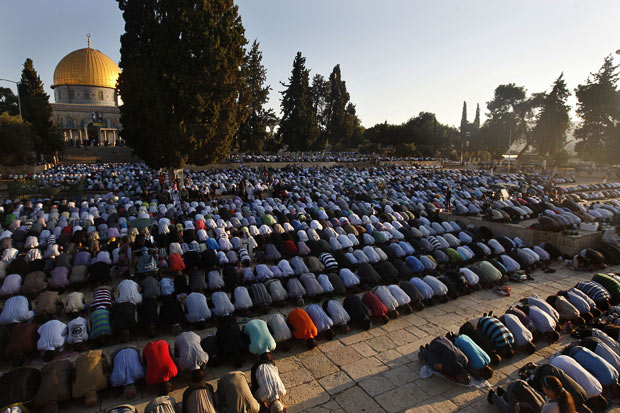
ACTS THAT HAVE THE REWARD OF HAJJ
There are some acts which have the reward of Hajj. It does not mean that a person has performed Hajj by doing these deeds, rather it just means that they get an equivalent reward.
1. Praying Fajr in congregation, then remembering Allah until the sun has risen and then praying two rakahs
عَنْ أَنَسِ بْنِ مَالِكٍ، قَالَ قَالَ رَسُولُ اللَّهِ صلى الله عليه وسلم : مَنْ صَلَّى الْغَدَاةَ فِي جَمَاعَةٍ ثُمَّ قَعَدَ يَذْكُرُ اللَّهَ حَتَّى تَطْلُعَ الشَّمْسُ ثُمَّ صَلَّى رَكْعَتَيْنِ كَانَتْ لَهُ كَأَجْرِ حَجَّةٍ وَعُمْرَةٍ . قَالَ قَالَ رَسُولُ اللَّهِ صلى الله عليه وسلم : تَامَّةٍ تَامَّةٍ تَامَّةٍ
I mentioned the following in Part 8 regarding this hadeeth:
2. Going out to perform the obligatory prayers in congregration
عَنْ أَبِي أُمَامَةَ، أَنَّ رَسُولَ اللَّهِ صلى الله عليه وسلم قَالَ : مَنْ خَرَجَ مِنْ بَيْتِهِ مُتَطَهِّرًا إِلَى صَلاَةٍ مَكْتُوبَةٍ فَأَجْرُهُ كَأَجْرِ الْحَاجِّ الْمُحْرِمِ وَمَنْ خَرَجَ إِلَى تَسْبِيحِ الضُّحَى لاَ يُنْصِبُهُ إِلاَّ إِيَّاهُ فَأَجْرُهُ كَأَجْرِ الْمُعْتَمِرِ وَصَلاَةٌ عَلَى أَثَرِ صَلاَةٍ لاَ لَغْوَ بَيْنَهُمَا كِتَابٌ فِي عِلِّيِّينَ
Shaikh Abdul Mushin Al-Abbaad discussed this hadeeth in his explanation of Sunan Abee Dawood and pointed out that the voluntary prayers are better at home (based on this hadeeth). He pointed out that it could also be an exception only for this prayer. Allah knows Better.
3. Dhikr (remembrance) after the obligatory prayers
عَنْ أَبِي هُرَيْرَةَ ـ رضى الله عنه ـ قَالَ جَاءَ الْفُقَرَاءُ إِلَى النَّبِيِّ صلى الله عليه وسلم فَقَالُوا ذَهَبَ أَهْلُ الدُّثُورِ مِنَ الأَمْوَالِ بِالدَّرَجَاتِ الْعُلاَ وَالنَّعِيمِ الْمُقِيمِ، يُصَلُّونَ كَمَا نُصَلِّي، وَيَصُومُونَ كَمَا نَصُومُ، وَلَهُمْ فَضْلٌ مِنْ أَمْوَالٍ يَحُجُّونَ بِهَا، وَيَعْتَمِرُونَ، وَيُجَاهِدُونَ، وَيَتَصَدَّقُونَ قَالَ : أَلاَ أُحَدِّثُكُمْ بِأَمْرٍ إِنْ أَخَذْتُمْ بِهِ أَدْرَكْتُمْ مَنْ سَبَقَكُمْ وَلَمْ يُدْرِكْكُمْ أَحَدٌ بَعْدَكُمْ، وَكُنْتُمْ خَيْرَ مَنْ أَنْتُمْ بَيْنَ ظَهْرَانَيْهِ، إِلاَّ مَنْ عَمِلَ مِثْلَهُ تُسَبِّحُونَ وَتَحْمَدُونَ، وَتُكَبِّرُونَ خَلْفَ كُلِّ صَلاَةٍ ثَلاَثًا وَثَلاَثِينَ . فَاخْتَلَفْنَا بَيْنَنَا فَقَالَ بَعْضُنَا نُسَبِّحُ ثَلاَثًا وَثَلاَثِينَ، وَنَحْمَدُ ثَلاَثًا وَثَلاَثِينَ، وَنُكَبِّرُ أَرْبَعًا وَثَلاَثِينَ. فَرَجَعْتُ إِلَيْهِ فَقَالَ : تَقُولُ سُبْحَانَ اللَّهِ، وَالْحَمْدُ لِلَّهِ، وَاللَّهُ أَكْبَرُ، حَتَّى يَكُونَ مِنْهُنَّ كُلِّهِنَّ ثَلاَثًا وَثَلاَثِينَ
Narrated Abu Hurairah (radiallahu anhu): Some poor people came to the Prophet (sallallahu alaihi wasallam) and said, “The wealthy people will get higher grades and will have permanent enjoyment and they pray like us and fast as we do. They have more money by which they perform the Hajj, and Umrah; fight and struggle in Allah’s Cause and give in charity.” The Prophet said, “Shall I not tell you a thing upon which if you acted you would catch up with those who have surpassed you? Nobody would overtake you and you would be better than the people amongst whom you live except those who would do the same. Say “Subhan Allah” (glory be to Allah), “Alhamdulillah” (all praise is due to Allah) and “Allahu Akbar”(Allah is Greater) thirty three times each after every (compulsory) prayer.” We differed and some of us said that we should say, “Subhan Allah” thirty three times and “Alhamdulillah” thirty three times and “Allahu Akbar” thirty four times. I went to the Prophet (sallallahu alaihi wasallam) who said, “Say, “SubhanAllah” and “Alhamdulillah” and “Allahu Akbar” all together thirty three times.” [Sahih Al-Bukhari, Volume 1, Hadeeth No. 804]
This hadeeth does not say that these people get the reward of Hajj, rather what is mentioned is that one can surpass those who do Umrah, Hajj, Jihad and give charity (because they can afford to do so) by remembering Allah (in the manner mentioned in the above hadeeth) after the obligatory prayers.
So, this hadeeth differs from the prior two ahadeeth which clearly state deeds which have the reward of Hajj.
